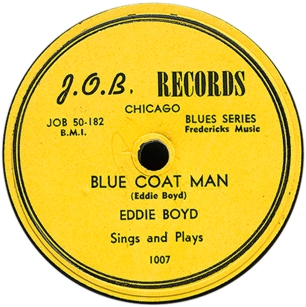

Revision note. Courtesy of Cash Box, we can now date Joe Brown's distribution deal with Chance precisely—from the middle of July 1952 to the middle of October 1953. We have added information about the involvement of Detroit-based music publisher Annis House with Oriole 1319. We have added information about the entire Oriole label: Bud Brandom's original 1950-1951 operation and the revival by Brandom and Joe Brown in 1959. Mark Mumea has corrected the guitar credits for the session of March 22, 1951; only Leroy Foster plays on "Pet Rabbit" and "Louella." On the "Blues Is Killin' Me" session, again only Foster plays guitar on his two sides; Robert Jr. Lockwood is not present. We have added a tiny bit more information about singer Mildred Richards. We have added a reference to Apollo's acquisition of the first JOB session (which was announced in Billboard on October 8, 1949), and added release date information on the first two Apollo singles that came out of it. We have corrected the release date for JOB 1009 by Eddie Boyd. As Tom Baker has pointed out to us, the record was first advertised in Billboard on February 21, 1953, not on March 14 as we'd previously stated. Dan Kochakian has now turned up a Chance/JOB ad for 1009 that ran in Cash Box on February 7, 1953. And ... we are at last able to announce that the search for the elusive JOB 1004 by Roy Sneed has come to an end. There never was such a record; instead, a single by the 12-year-old Don Sneed, Jr., with the Sneed Family Band, was mistaken for a JOB release. Don Sneed's record was J B 1004, done for a different Chicago label in 1956. The J B is now listed in Appendix B.
The JOB label was founded in July 1949 by Joe Brown (1904-1976) and James Burke Oden (aka St. Louis Jimmy, 1903-1977). Reportedly the name of the label transposed the bluesman's initials. JOB followed a venture called Opera, which flared briefly in 1947 and 1948. Previously Joe Brown had been a boxer, and had been involved in other business ventures of which we still know little.
JOB would hold on until 1974, but its main period of sustained activity ran from late 1950 through the middle of 1954. The company's one chart hit, "Five Long Years" by Eddie Boyd, was released in July 1952. Always a "mom and pop" scale business with erratic publicity and distribution, after 1954 JOB became more of a hobby for its owner than a serious business venture. Brown tried to establish a subsidiary label called Fury in 1955; he invested in the Abco label in 1956 and started the Ruler label in 1958; from 1956 through 1958, he collaborated on two or three occasions with Leonard Allen; in partnership with Vincent "Bud" Brandom, he took over the Oriole label in 1958-1959, after which it reverted to Brandom's exclusive control as B&F; all the while his interest in JOB came and went. From the mid-1950s onward, Brown's collaboration with Brandom was primarily focused on music publishing.
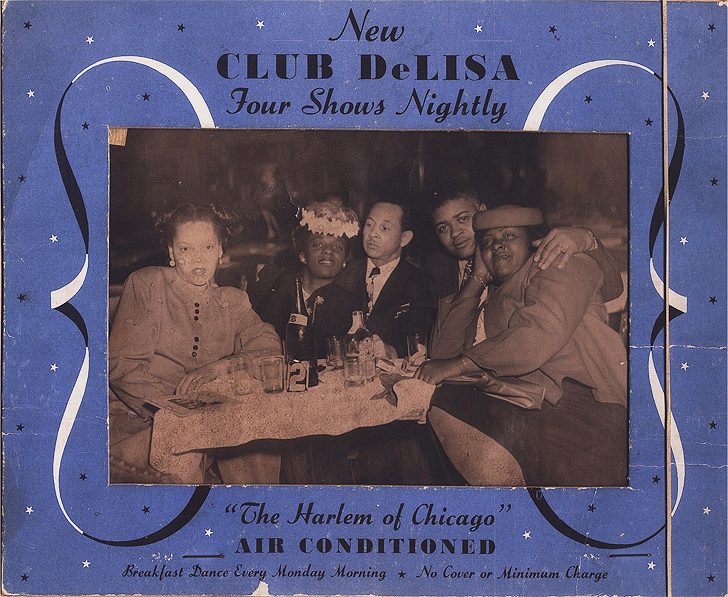
JOB, then, was not a single coordinated enterprise. It is best understood as a series of startups that happened to be run by the same person, under cover of the same logo.
In the very beginning there were two singles. One of them featured co-owner St. Louis Jimmy as leader, and the other spotlighted a song he had written. The single by Mildred Richards went absolutely nowhere, and acute marketing insufficiency quickly induced JOB to peddle the St. Louis Jimmy session to Apollo, along with other material by bluesmen Sunnyland Slim, Willie Mabon, and Jimmy Rogers.
According to Mike Brown, "Mother's Day" was copyrighted on July 20, 1949, in advance of the first session. The song was obviously getting priority from the new enterprise, as it would be featured on both of the first two sessions.
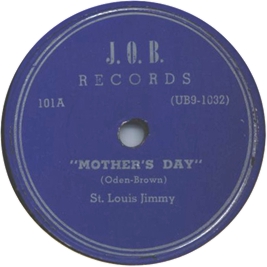
James Burke "St. Louis Jimmy" Oden (voc -1); Sunnyland Slim [Albert Luandrew] (p except -2, voc except -1, -2 , -3); Willie Mabon (hca -4; p, voc -2); Sam Casimir (eg except -3); Jimmy Rogers (eg, voc -3); Andrew Harris (b).
United Broadcasting Studios, Chicago, August 26, 1949
| R-1379-1 | Sad Old Sunday -1 | Delmark DD-655 | |
| UB9-1032[R-1379-6] | Mother's Day (Oden-Brown) [Sad Old Sunday*] -1 | JOB 101A, Apollo 420*, Delmark DD-655* | |
| R-1380 | Chicago Woman Blues [Chicago Woman*] -1 | Apollo 420, Delmark DD-655* | |
| R-1381 | Nervous Breakdown -1 | Delmark DD-655 | |
| R-1382 | Old Age Has Got Me -1 | Delmark DD-655 | |
| UB9-1033 | Jack L. Cooper (Oden-Brown) -1 | JOB 101B, Document DOCD 5235 | |
| R-1383-1 | Bad Times ^ | Delmark DD-655 | |
| R-1383-2 | Bad Times (Cost of Living) ^ | Apollo 416, Delmark DD-655, Classics 5035 | |
| R-1384-2 | Hard Time (When Mother's Gone) ^ | Delmark DD-655, Classics 5035 | |
| R-1385 | Brown Skin Woman ^ | Delmark DD-655, Classics 5035 | |
| R-1386-1 | I'm Just a Lonesome Man ^ | Apollo 416, Delmark DD-655 | |
| R-1386-2 | I'm Just a Lonesome Man ^ | Delmark DD-655, Classics 5035 | |
| R-1387 | That's All Right -3 | Delmark DD-655 | |
| R-1388 | I'm in Love -3 | Delmark DD-655 | |
| R-1389 | Bogey Man (Boogie Man*) -2, 4 | Apollo 450, Delmark DD-655* | |
| R-1390 | It Keeps Rainin' -2 | Apollo 450, Delmark DD-655 |
The Apollo deal was concluded quickly, just over a month after the session. In a story datelined October 1, 1949, Billboard announced that Apollo had signed "Sunnyland Slim and St. Louis Jimmy, a pair of veteran Southern Blues hollerers" ("Apollo Extends Blues Build-Up," October 8, p. 17). Of course, the story didn't mention that Slim and Jimmy had already recorded, or who they had recorded for—or that neither had any futher obligation to Apollo.
According to Leadbitter and Slaven, who provided the recording date, this session initially contained matrix numbers UB9-1032 and 1033. After the sale to Apollo, new numbers were applied to all of the items; only in the case of "Mother's Day" do we happen to know the original UB number. Meanwhile "Jack L. Cooper" (written to butter up a prominent Chicago DJ) didn't particularly interest an East Coast outfit like Apollo, and wasn't included in the sale. Apollo 420 therefore replaced "Jack L. Cooper" with a new B side and retitled "Mother's Day" as "Sad Old Sunday."
Sunnyland Slim got one Apollo single out of the deal: Apollo 416 ("Bad Times" b/w "I'm Just a Lonesome Man") was announced as a new release in Billboard on December 24, 1949 (p. 31) and reviewed in Cash Box on January 28, 1950 (p. 15). Apollo was in a lot less of a hurry on the St. Louis Jimmy single; Apollo 420 showed up among the new releases in Billboard on May 6, 1950 (p. 38).
After Delmark acquired many of the Apollo holdings in the 1990s, all of the St. Louis Jimmy material from the session except "Jack L. Cooper" appeared on Delmark DD-655, a CD released in 1992 under the title Sunnyland Slim: House Rent Party. "Jack L. Cooper" was, however, included in the Document CD, St. Louis Jimmy Oden Vol. 2: 1944-1955, which was released in 1994. The track was dubbed from a rare 78 in the collection of the late George Paulus.
The August 26 session was quite extensive, producing additional items without St. Louis Jimmy. Six sides by Sunnyland Slim and His Trio (reassigned matrix numbers R-1383 through R-1386, plus two alternate takes) were sold to Apollo. Two were issued on Apollo 416. All four have appeared on Delmark DD-655, Sunnyland Slim: House Rent Party, and on Classics 5035, Sunnyland Slim 1949-1951, issued in 2001. The Classics reissue incorrectly places Robert Jr. Lockwood (eg) and Ernest "Big" Crawford (b) in the trio instead of Casimir and Harris. The guitar solos don't sound like Lockwood, and Sunnyland even calls out "All right, Sam!" in "I'm Just a Lonesome Man. In addition, Fancourt and McGrath list UB9-1034, "Sunnyland Blues" and UB9-1035 "My Life Is an Open Book" as unissued JOB sides from this session. We haven't included these tracks in our table because we don't have access to the original matrix numbers and they were almost certainly retitled by Apollo (and later by Delmark).
As though the St. Louis Jimmy and Sunnyland Slim sides weren't a sufficient contribution, the session concluded with two sides featuring Willie Mabon (who eventually netted a single on Apollo) and two by Jimmy Rogers (who, as had become unfortunately usual for him, saw his sides left in the can). Mabon was billed as Big Willie on his Apollo release. Apollo wasn't exactly going out on a limb with this record; it appeared in August 1953, several months after Mabon had proven himself as a hitmaker for Chess.
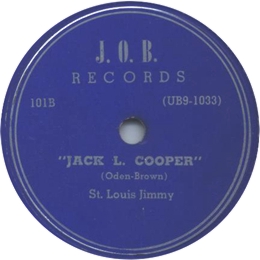
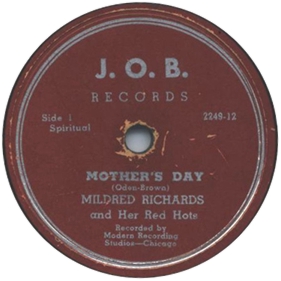
Mildred Richards (voc); Baby Face Leroy Foster (eg); other musicians unidentified.
Modern Recording Studio, Chicago, early 1950
| 2249-12 | Mother's Day (Oden-Brown) | JOB 2249 | |
| 2249-22 | It May Be Better in the Future (Oden-Brown) | JOB 2249 |
Discographies have placed this session in 1949; some also misrender the singer's name as "Richardson." The label identifies the source as Modern Recording Studio. MRS 22491 and 22492 are legal matrix numbers in that series, but they would have to date from early 1950. Is "Mother's Day" the same song that was on the St. Louis Jimmy session? His involvement as composer says yes.
The only other recorded appearance by Mildred Richards that we are aware of was a backup singer on Roosevelt Sykes' final date for RCA Victor (Chicago, October 28, 1949).
Only two copies of the Mildred Richards single are still known to exist—and one of them is broken.
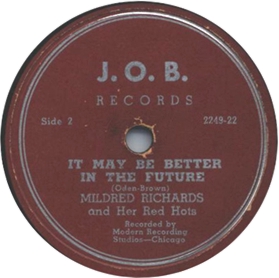
We very much doubt that St. Louis Jimmy kept his stake in the company after his session was unloaded to Apollo. He never recorded another session for JOB, though he shared composer credits for the Mildred Richards sides. These facts lead us to question his continued participation in the venture (he kept on recording periodically for other labels through the early 1960s). On the other hand, Sunnyland Slim was a regular participant in JOB sessions from 1949 through 1954, and some suspected that he held a share of the ownership.
In fact, what seems to have happened after the first JOB startup collapsed was an exodus of talent to Monroe Passis' Parkway operation. In January 1950, Jimmy Rogers and Sunnyland Slim were recording for the new label, on a session led by Memphis Minnie. Baby Face Leroy Foster was recording as a leader and actually releasing sides on the new label. In March 1950, Monroe Passis of Parkway announced that he and J. Mayo Wiliams (then on hiatus from running a record company) were managing Memphis Minnie, Sunnyland Slim, St. Louis Jimmy, and others. St. Louis Jimmy recorded for Parkway and Regal in April 1951, and never returned to JOB—in fact, he didn't make another recording for anyone until 1953, when he cut for Duke. After Parkway stopped issuing its own records and became a full-time conduit to Regal, in the middle of 1950, Sunnyland Slim started his own Sunny label. He would not return to JOB until the J. B. Lenoir session at the end of the year.
Startup number 2 looks to have taken place around the middle of 1950. Discographies have treated the Baby Face Leroy and Snooky Pryor sessions as separate, but given the apparently identical personnel and the fact that it took two of these events to generate the usual quota of four sides, we are pretty sure that all were done on the same occasion. Pretty obviously, Leroy Foster returned to JOB after Parkway failed in the middle of 1950 (he had quit Muddy Waters' band after recording for Parkway, in the mistaken belief that his Parkway releases would establish him as a bandleader).
Again, the first single out from this second effort was branded JOB 100 and the second was JOB 101—got that? By October or November of 1950, Joe Brown had dealt JOB 100 to the Chess brothers, who rebranded it as Chess 1447. If the second JOB 101 was offered to Chess, the company never did anything with it. (There was a second JOB 100 as well, but it was on a different label altogether—see the discussion of the Shreveport, Louisiana-based JOB label at the end of this page).
Joe Brown's next effort introduced two significant bluesmen to the label. Bluesman Baby Face Leroy Foster was born on 12 February 1923, in Algoma, Mississippi. He was one of the pioneers of the post-World War II southern blues resurgence in Chicago, coming to the city in 1945 in the company of Little Walter and pianist Johnny Jones. His insinuating vocals, drumming, and guitar picking can be found on some of the greatest Chicago bar-band blues. He worked with Sunnyland Slim and John Lee "Sonny Boy" Williamson, before joining Muddy Waters' band. He first recorded with Lee Brown (for Chicago and Harlem, 1945, and King, 1946) and James Clark (Columbia, 1946). After a possible appearance on guitar with Sunnyland Slim for Opera, he definitely played guitar on some of the legendary Tempo-Tones, done in May 1949 alongside Floyd Jones, Little Walter, Sunnyland Slim, Jimmy Rogers, and Elga Edmonds; in fact, he sang on two Tempo-Tone sides that apparently went unreleased. He played rhythm guitar on Muddy Waters' October or November 1948 Aristocrat session, and guitar and drums on Muddy's session of September 1949. Foster also made his debut as a leader on the 1948 outing, singing on two sides of his own. The last time he would record with Waters was on an extraordinary Parkway session in January 1950, along with Little Walter. Foster was credited as the leader on four sides, two of them making up a remarkable performance of "Rollin' and Tumblin'."
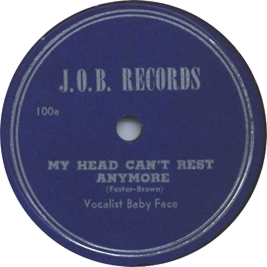
Not long after the Parkway session, Foster parted company with Waters. He was hoping that Parkway would establish him as a solo artist, but the new company couldn't compete with Aristocrat, which rushed Muddy Waters into the studio to remake "Rollin' and Tumblin'," then got its version into the stores quicker than Parkway could. So Foster moved on and cut this JOB session, his first of three for the company. He recorded two slow numbers—"My Head Can't Rest Anymore" and "Take a Walk with Me." Both were so strongly flavored with Snooky Pryor's accompaniment that reissue compilers in the early 1990s put them on a harmonica collection.
James Edward "Snooky" Pryor was born on September 15, 1921, in Lambert, Mississippi. His style on the harmonica was derived in roughly equal parts from John Lee "Sonny Boy" Williamson and Aleck Miller (aka Sonny Boy Williamson #2). He got the idea of amplifying his harmonica while serving in the military during World War II, and in 1945 began performing at the Maxwell Street market with portable PA system he purchased at a store at 504 South State. As the first to amplify a harmonica, Pryor should rightly be recognized as a blues pioneer. His first recordings were made around November 1948 for Chester Scales' tiny Marvel and Planet operation; two of the six sides ("Telephone Blues" b/w "Boogie") featured him as the leader. They gained a little more currency when reissued on Old Swing-Master in 1949. This JOB session appears to have been Pryor's next recording opportunity.
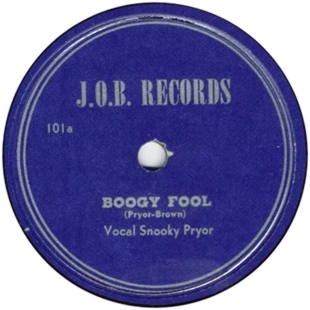
"Baby Face" Leroy Foster (eg, voc); Snooky Pryor (hca, voc); Alfred Elkins (b).
unidentified studio, Chicago, early 1950
| 100a | My Head Can't Rest Anymore (Foster-Brown) | JOB 100, Chess 1447, Flyright [Br] 584, Flyright [Br] FLYCD 11, Paula PCD-7, P-Vine [J] PCD 24075, Fuel 302 061 939 [CD] | |
| 100b | Take a Little Walk with Me (Foster-Brown) | JOB 100, Chess 1447, Boogie Disease BD 101/102, Flyright [Br] 584, Flyright [Br] FLYCD 11, Paula PCD-7, P-Vine [J] PCD 24075 | |
| JB-101A | Boogy Fool (Pryor-Brown)* | JOB 101, Flyright [Br] FLY 100, Flyright [Br] 584, Flyright [Br] FLYCD 11, Paula PCD-7, Westside WESA 869 [CD], Westside WESD 233 [CD], Fuel 302 061 939 [CD] | |
| JB-101B | Raisin Sand [sic] (Pryor-Brown)* | JOB 101, Flyright [Br] FLY 100, Flyright [Br] 584, Flyright [Br] FLYCD 11, Paula PCD-7, Westside WESA 869 [CD], Westside WESD 233 [CD] |
Conventionally, the second JOB 101 is said to be from a different session ("1949 or 1950") and the bassist is said to be Moody Jones (a JOB regular) or Alfred Elkins (also a JOB regular). But the lineups are otherwise identical—as is the rather subdued sound of the ensemble. On all four sides, Snooky Pryor plays amplified harmonica—making him the first blues artist to do so.
Anyhow, JOB 100 and 101 were both released in 1950. The first serious JOB reissue was Snooky Pryor, Flyright FLY 100, from 1969. Boogie Disease BD 101/102, Take a Little Walk with Me: The Blues in Chicago 1948-1957, was a limited edition 2-LP set from 1972. Flyright FLY 584, Baby Face Leroy & Floyd Jones, was released in Britain in 1983; it included all four sides but still listed them as coming from different sessions. Flyright FLYCD 11, Chicago Blues Harmonicas, was issued in Britain in 1989. Its American counterpart, Paula PCD-7, was issued in 1991. These collect harmonica-oriented blues from the JOB and Cobra archives. Westside WESA 869, Snooky Pryor & Friends: Pitch a Boogie Woogie If It Takes Me All Night Long: Seminal Post-War Chicago Blues, is a British CD released in 2001. P-Vine PCD 24075, Chicago Blues Harp Blowers!, is a Japanese CD released in 2001. Fuel 302 061 939, The J.O.B. Records Blues Story is a 2-CD set issued in 2012; the notes by Bill Dahl are the first to take advantage of the research presented here.
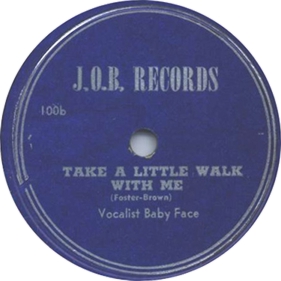
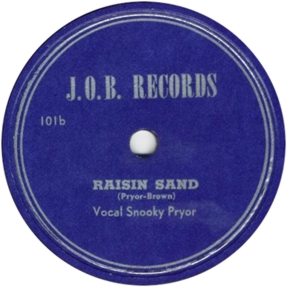
In June 1950, while JOB was temporarily quiescent, Chicago music publisher Vincent "Bud" Brandom started a label called Oriole, which was intended to appeal to juke box operators (and was therefore guaranteed some coverage in Cash Box). The offerings were strictly pop material, of the sort that Brandom's companies usually published, and the company was not a success. The first release, by Irish tenor Danny O'Neill, moved well in Chicago for a week or two, but nothing happened with the others. Cash Box gave Oriole 102, another Danny O'Neill, a laudatory review (August 5, 1950, p. 6), but this doesn't seem to have gotten the record onto a lot of juke boxes. The last reference in the trades to new releases is to two singles by bandleader Danny Belloc (Cash Box, May 26, 1951, p. 7). Oriole went inactive after 18 releases and a year in business; in August Belloc promptly moved to a new rival called JEB. We don't know whether in 1950 and 1951 Brandom and Brown had even heard of each other, but by 1957 they were working together, and they even revived the Oriole imprint. See below...
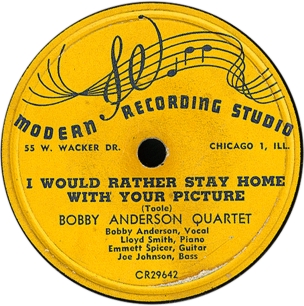
The third launch took place around the end of 1950. Joe Brown dealt the Baby Face Leroy single from startup #2 to the Chess brothers. He now had a firm relationship with Modern Recording Studio at 55 West Wacker Drive. One session that he cut there around December 1950 (matrix numbers 31641 through 31644) consisted of four tunes by J. B. Lenoir—his first as a leader. Lenoir's electric guitar and vocals were backed by JOB regulars Sunnyland Slim (piano), Baby Face Leroy Foster (guitar), and Alfred Wallace (drums). All four sides were sold outright to Chess, which put them out on Chess 1449 and 1463; none would appear on JOB.
The JOB-Chess relationship was not to last, however. By the end of 1951 it is doubtful that Joe Brown and Leonard Chess were on speaking terms.

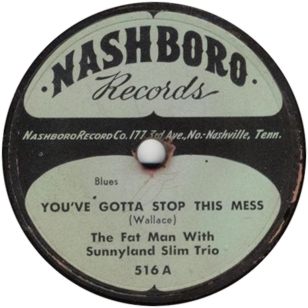
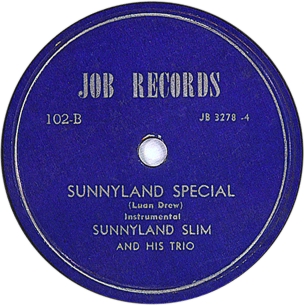
Sunnyland Slim (p, voc); Robert Lockwood Jr. (eg); Moody Jones (b); Alfred "Fat Man" Wallace (d, voc).
Modern Recording Studio, Chicago, February 1, 1951
| JB 32781 MRS | You've Gotta Stop This Mess (Wallace) [AW voc]* | JOB 103-A, Nashboro 516 A, Flyright [Br] FLY 566, P-Vine Special [J] PLP-9018, Flyright [Br] FLYCD 10, Paula PCD-14, Westside WESD 233 [CD], P-Vine [J] PCD-24051, Classics 5035 [CD], Fuel 302 061 939 [CD] | |
| JB 32782 MRS | Glad I Don't Worry No More (Wallace) [AW voc]* | JOB 103-B, Nashboro 516 B, Flyright [Br] FLY 566, P-Vine Special [J] PLP-9018, Flyright [Br] FLYCD 10, Paula PCD-14, Westside WESD 233 [CD], P-Vine [J] PCD-24051, Classics 5035 [CD] | |
| JB 32783 MRS | Down Home Child (Luandrew) [SS voc] | JOB 102-A, Flyright [Br] FLY 566, P-Vine Special [J] PLP-9023, Flyright [Br] FLYCD 10, Paula PCD-14, Opal OCD 110, Westside WESA 910 [CD], Westside WESD 233 [CD], P-Vine [J] PCD-24051, Classics 5035 [CD], Fuel 302 061 384 [CD] | |
| JB 32784 MRS | Sunnyland Special ("Luan Drew") [SS voc] | JOB 102-B, Flyright [Br] FLY 566, Opal OCD 110, Flyright [Br] FLYCD 10, Paula PCD-14, Westside WESA 910 [CD], P-Vine [J] PCD-24051, Classics 5035 [CD], Fuel 302 061 384 [CD] |
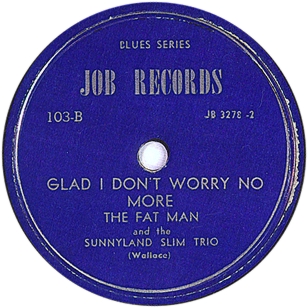
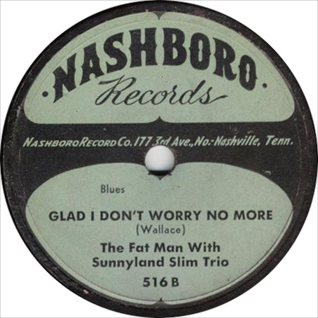

JOB 102 and 103 were released in 1951. JOB 103 was also picked up by Nashboro, a company in Nashville that released mostly gospel material, and reissued on a single not long afterward. Flyright FLY 566 was released in Britain in 1980, under the title Sunnyland Slim. P-Vine Special PLP-9018, Robert Jr. Lockwood & Chicago Gangs: The Baddest New Guitar, was released in Japan in 1980. P-Vine Special PLP-9023 is part of a 4-LP box, 9022/9025, issued in Japan in 1981 under the title Chicago Blues: A Quarter Century. Flyright FLYCD 10 and Paula PCD-14, Johnny Shines and Robert Lockwood, were identical releases from 1989 and 1990. Opal OCD 110, Sunnyland Slim: Patriarch of the Blues 1947-1952, was released in 1995. Westside WESA 910, Sunnyland Slim & Friends: Sunnyland Special: The Cobra & JOB Recordings 1949-1956, is a British CD released in 2001. Westside WESD 233 is a compilation of 54 JOB blues tracks on 2 CDs; titled Rough Treatment: The J.O.B. Records Story, it was released in Britain in 2001. P-Vine PCD-24051, Robert Jr. Lockwood & Johnny Shines: Sweet Home Chicago, was released in Japan in 2001. Classics 5035, Sunnyland Slim 1949-1951, was also released in 2001. Fuel 302 061 384, Sunnyland Slim: Highway 61, is a CD released in 2004. Fuel 302 061 939, The J.O.B. Records Blues Story is a 2-CD set issued in 2012.

Floyd Jones (eg, voc); Billy Howell (tp -1); Sunnyland Slim (p); Moody Jones (b); Alfred "Fat Man" Wallace (d).
Modern Recording Studio, Chicago, March 22, 1951
| 35221 MRS, JB 1001-A | Big World (Jones) -1 | JOB 1001-A, Chess 1498 [first version], Boogie Disease BD 101/102, P-Vine Special [J] PLP-9028, Flyright [Br] FLYCD 31, Paula PCD-15, Westside WESA 910 [CD], Westside WESD 233 [CD], P-Vine [J] PCD-24089, Classics 5130 [CD] | |
| 35222 MRS, JB 1001-B | Dark Road (Jones) | JOB 1001-B, Chess 1498 [first version], P-Vine Special [J] PLP-9022, Flyright [Br] FLY584, P-Vine Special [J] PLP-9028, Flyright [Br] FLYCD 28, Paula PCD-19, Westside WESA 910 [CD], P-Vine [J] PCD-24089, Classics 5130 [CD], Fuel 302 061 939 [CD] |
JOB 1001 was released in 1951 with a blue label (why the new series?). There are two versions of JOB 1001. The first credits Sunnyland Slim and His Boys on the label; the second doesn't. The first carries the 5-digit matrix numbers in the wax along with the JB numbers; the second carries only the JB numbers, though the MRS suffix is still present. Clearly the second version was issued later, probably after the Chess remakes appeared. (Further credence is lent to this hypothesis by the #2 after JB-1001-A and JB-1001-B on Big Joe Louis' copy of the 78). Billy Howell is credited on both editions with playing trumpet on "Big World." His presence lends the number a 1920s jazz feel otherwise unknown in Floyd Jones' output.
Boogie Disease 101/102 was a 2-LP set, limited to 500 copies, released in 1972 as Take a Little Walk with Me: The Blues in Chicago 1948-1957. P-Vine Special PLP-9022 is part of a 4-LP box, 9022/9025, issued in Japan in 1981 under the title Chicago Blues: A Quarter Century. Flyright FLY 584 was an LP released in Britain in 1983, under the title Baby Face Leroy & Floyd Jones. P-Vine Special PLP-9028, Floyd Jones: On the Road Again, was released in Japan in 1984; P-Vine's licensing deals allowed the company to include Jones' Chess and JOB sides in the same album. Flyright FLYCD 31 and Paula PCD-15 were released in 1990 and 1991 under the title Chicago Piano 1951-1958 from Cobra and JOB. Sunnyland Slim played on 7 tracks on this CD. Flyright FLYCD 28, Blues Is Killin' Me, is a various-artists compilation (all JOB material) issued in 1990, with an American counterpart on Paula PCD-19 from 1991; its Flyright LP predecessors date from 1981. Westside WESA 910, Sunnyland Slim & Friends: Sunnyland Special: The Cobra & JOB Recordings 1949-1956, is a British CD released in 2001. Westside WESD 233 is a compilation of 54 JOB blues tracks on 2 CDs; titled Rough Treatment: The J.O.B. Records Story, it was released in Britain in 2001. P-Vine PCD-24089, Chicago Bues Down Homers! The JOB Recordings 1950's, was released in Japan in 2001. Classics 5130, Floyd Jones 1948-1953, is a CD released in 2005. The subtitle is off, because the last session on the CD was actually done (for Vee-Jay) in 1954. Fuel 302 061 939, The J.O.B. Records Blues Story is a 2-CD set issued in 2012.
This is not the same coupling that Chess eventually put out on Chess 1498. Thanks to Les Fancourt for alerting us to this fact and pointing out the personnel on JOB 1001. Chess remade "Dark Road" and "Big World" on December 29, 1951, with backing by members of the Muddy Waters band, including Jimmy Rogers on guitar and Little Walter on harmonica. The matrix numbers were deliberately obcured (put in the F1000 series that was being used for purchased material instead of the U7000 series employed for the other sides recorded at the same session) when the sides were released on Chess 1498. To make matters worse, some copies of Chess 1498 actually were JOB 1001—with new labels attached! (Our thanks to the late George Paulus for ths information.) Whether Joe Brown and Leonard Chess had a falling out before the Floyd Jones remakes we don't know. After the remakes took place, though, relations between the companies were poisonous.
"Dark Road" was considered a hit, though its sales were not high enough to make Billboard's R&B charts. Before "Dark Road," JOB was hardly ever mentioned in the trade press; afterwards not every release was cited but coverage did markedly improve.
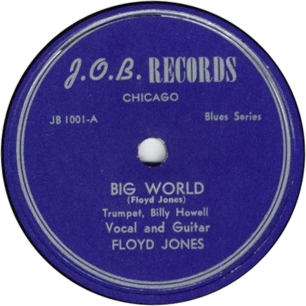
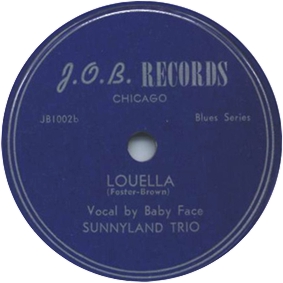

Sunnyland Slim (p, voc); Billy Howell (tp on -2); Robert Lockwood Jr. (eg except -1, voc); Baby Face Leroy Foster (eg, voc); Alfred "Fat Man" Wallace (d).
Modern Recording Studio, Chicago, March 22, 1951
| 35223 | Dust My Broom [RL voc]* | Juke Joint LP 1501, Nighthawk LP 101, Flyright FLY [Br] 563, P-Vine Special [J] PLP-9018, Flyright [Br] FLYCD 10, Paula PCD-14, Westside WESA 910 [CD], P-Vine [J] PCD-24051 | |
| 35223 [alt.] | Dust My Broom [RL voc]* | Flyright [Br] FLY 563, P-Vine Special [J] PLP-9018, Flyright [Br] FLYCD 10, Paula PCD-14, Westside WESA 910 [CD], Westside WESD 233 [CD], P-Vine [J] PCD-24051 | |
| JB-35224 | Pet Rabbit [LF voc]^ -1 | JOB 1002, P-Vine Special [J] PLP-9023, Flyright [Br] 584, Flyright [Br] FLYCD 28, Paula PCD-19, Westside WESD 233 [CD], P-Vine [J] PCD-24089, Fuel 302 061 939 [CD] | |
| JB1002b, JB-35225 | Louella (Foster-Brown) [LF voc]^ -1 | JOB 1002, Flyright [Br] 584, Flyright [Br] FLYCD 28, Paula PCD-19, Westside WESD 233 [CD], P-Vine [J] PCD-24089 | |
| MRS-35226 | Leaving Your Town (Luandrew) [SS voc] | JOB 1003b, Flyright [Br] FLY 566, P-Vine Special [J] PLP-9018, Flyright [Br] FLYCD 10, Paula PCD-14, Westside WESA 910 [CD], Westside WESD 233 [CD], P-Vine [J] PCD-24051, Classics 5035 [CD], Fuel 302 061 384 [CD], Fuel 302 061 939 [CD] | |
| MRS-35227 | Mary Lee (Luandrew)% [SS voc] -2 | JOB 1003a, P-Vine Special [J] PLP-9018, Flyright [Br] FLYCD 31, Paula PCD-15, Westside WESA 910 [CD], P-Vine [J] PCD-24051, Classics 5035 [CD], Fuel 302 061 384 [CD] | |
| 35228? | Pearly B [RL voc]* | Flyright FLY 563, P-Vine Special [J] PLP-9018, Flyright [Br] FLYCD 10, Paula PCD-14, Westside WESA 910 [CD], Westside WESD 233 [CD], P-Vine [J] PCD-24051, Fuel 302 061 939 [CD] |
JOB 1002 and 1003 were issued in 1952. Clearly, Joe Brown saw commercial potential in Sunnyland Slim and Leroy Foster. According to Mark Mumea, only Leroy Foster's guitar is on his numbers, "Pet Rabbit" and "Louella"; Lockwood lays out. Billy Howell's presence on trumpet (he can be heard on "Mary Lee") confirms the common origin of these tracks and the Floyd Jones items listed above.
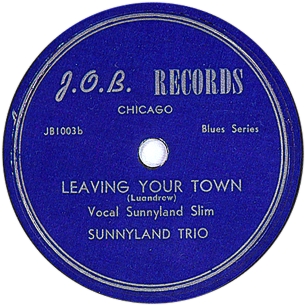
Meanwhile, Brown passed on the Robert Jr. Lockwood numbers, which had to wait for the first wave of reissue LPs. (We got the first issue credits from The Blues Discography 1943-1970, by Les Fancourt and Bob McGrath.) Interestingly, Lockwood recorded his version of "Dust My Broom" a few months before Elmore James (James cut it as his only vocal on what was otherwise a Sonny Boy Williamson session for Trumpet, in Jackson, Mississippi on August 5, 1951). But having the pianist play the "Dust My Broom" riff (as Sunnyland does on this session) was not a procedure that others chose to copy...
Lockwood's next sesssion as a leader was for Mercury, later in 1951. Again he was accompanied by Sunnyland Slim and Alfred Wallace. He would return to JOB, however.
Leroy Foster in his second session for JOB did a workmanlike job on two slow deep blues—"Pet Rabbit" and "Louella"—that appeal to a reissue audience on account of their Southern rural feel but apparently did not sell much in the early 1950s.
Nighthawk LP 101, Windy City Blues—The Transition: 1935-1953, was released in 1976. Flyright [Br] FLY 563 was released in Britain in 1980, under the title Johnny Shines & Robert Lockwood: Dust My Broom. Flyright FLY 566, Sunnyland Slim, was also released in 1980. P-Vine Special PLP-9018 was released in Japan in 1980, under the title Robert Jr. Lockwood & Chicago Gangs: The Baddest New Guitar. P-Vine Special PLP-9023 is part of a 4-LP box, 9022/9025, issued in Japan in 1981 under the title Chicago Blues: A Quarter Century. Flyright FLY 584 was released in Britain in 1983 as Baby Face Leroy & Floyd Jones. Flyright FLYCD 10 and Paula PCD-14, Johnny Shines and Robert Lockwood, were issued in 1989 and 1990. Flyright FLYCD 31 and Paula PCD-15 were released in 1990 and 1991, respectively, under the title Chicago Piano 1951-1958 from Cobra and JOB. Flyright FLYCD 28, Blues Is Killin' Me, is a various-artists compilation (all JOB material) issued in 1990, and matched by an American release on Paula PCD-19 from 1991; its Flyright LP predecessors date from 1981. Westside WESA 910, Sunnyland Slim & Friends: Sunnyland Special: The Cobra & JOB Recordings 1949-1956, is a British CD released in 2001. Westside WESD 233 is a compilation of 54 JOB blues tracks on 2 CDs; titled Rough Treatment: The J.O.B. Records Story, it was released in Britain in 2001. P-Vine PCD-24051, Robert Jr. Lockwood & Johnny Shines: Sweet Home Chicago—The JOB Sessions 1951-1955, was released in Japan in 2001. P-Vine PCD-24089, Chicago Blues Down Homers!, was released in Japan in 2001. Classics 5035, Sunnyland Slim 1949-1951, was also released in 2001. Fuel 302 061 384, Sunnyland Slim: Highway 61, is a CD released in 2004. Fuel 302 061 939, The J.O.B. Records Blues Story is a 2-CD set issued in 2012.
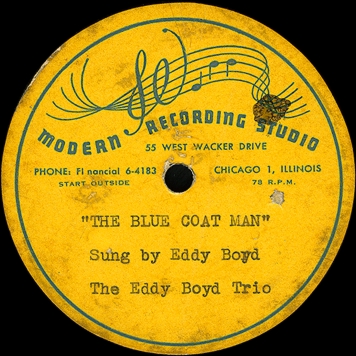
Eddie Boyd (p, voc); poss. L. C. McKinley (eg); Alfred Elkins (b)
Modern Recording Studio, Chicago, before June 30, 1951
| The Blue Coat Man | MRS lacquer (unissued) | ||
| Woman, Your Head's So Hard | MRS lacquer (unissued) |
Eddie Boyd, whose impact on the label's fortunes proved to be momentous, came to JOB in 1951. He made a demo of two of his songs at Modern Recording Studio and brought it to Joe Brown. The story in Bill Dahl's liner notes to Delmark DE-717, about Eddie Boyd cutting two sides himself at "Morris Webb's studio" and delivering the masters to Joe Brown, seems to pertain to this demo. Edwin M. Webb was the proprietor of Modern Recording Studio.
Edward Riley Boyd was born in Stovall, Mississippi, on November 25, 1914. His first instrument was the guitar, which he began playing in public in 1931. He later took up the piano, and by 1937 was working in Memphis in a band that also included alto saxophonist Alex Atkins. Putting the South behind him, he arrived in Chicago around 1941. He worked with Johnny Shines, Muddy Waters, Memphis Slim, and John Lee "Sonny Boy" Williamson, and began to pick up studio work when Melrose combine resumed its operations at the end of World War II. He played on a Sonny Boy Williamson session for Victor in 1945, and deputized for Big Maceo on the pianist's last session for Victor in early 1947. Thereafter, he cut a session under his own name (although he did not play piano on it), accompanied Jazz Gillum and Sonny Boy Williamson on one session each, and finally got two outings as a leader for Victor in the fall of 1947 (see our Sax Mallard page for details on these). He cut another session shortly after the second recording ban was formally concluded, in December 1948. But the Melrose operation was in steep decline, and the majors were shedding their blues artists; nothing from his Boyd's last session for Victor (which took place in June 1949) was released at the time. After a July 1950 session for Parkway that delivered two sides to Regal (the Regal release didn't sell, and the third side had to wait for Herald Records in 1953), Boyd took a job in a steel mill and saved his earnings so he could produce his own sides.
Brown was duly impressed by the demo and paid for two recording sessions. Boyd's first formal session took place on June 30, 1951, when four tracks were laid down. Boyd's first release, on JOB 1005, didn't sell much, but Brown persevered. He booked a second session, on May 30, 1952, at which two tracks were laid. Promptly released on JOB 1007, "Five Long Years" was a huge hit. In consequence, Joe Brown quickly called Ernest Cotton into the studio to overdub his tenor sax on three of the tracks recorded in 1951, and a few months later reissued overdubbed versions of both sides of JOB 1005 on JOB 1009.
Our biographical source on Eddie Boyd is Jean Buzelin's extensive notes to Eddie Boyd: The Complete Recordings 1947-1950, released in France on EPM 160002 in 2001. Buzelin, however, repeats the usual story that "Five Long Years" was on the demo that Boyd recorded.
The demo version of "Blue Coat Man" is slower in tempo than the version from the June 30, 1951 session that was eventually released on Delmark, and it includes only piano, guitar, and bass—no drums. What's more, the guitarist may not be L. C. McKinley, who appeared on both of the formal studio sessions. Another possibility is Ellis Hunter, who worked with Boyd off and on during the 1950s and appeared on his unreleased October 1951 session for Chess (which, probably not coincidentally, was also made by a trio without drums). On both sides the guitarist and bassist make shouts of encouragement not heard on the formal sessions. (We would like to be able to date it more exactly, but the lacquer carries the Modern Recording Studio label but no matrix numbers.)
Also included on the lacquer is a trio rendition of "Woman, Your Head's So Hard." The same tune, with some changes to the words, was recorded at the June 30, 1951 session.
Our thanks to Dave Sax for his comments on Boyd's demo disk from MRS.
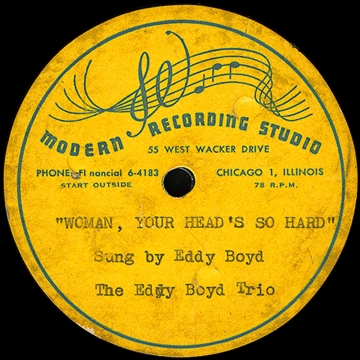

Eddie Boyd (p, voc); Ernest Cotton (ts -1); L. C. McKinley (eg); Alfred Elkins (b); Percy Walker (d).
Modern Recording Studio, Chicago, June 30, 1951 (tenor sax parts overdubbed on June 19, 1952)
| MRS 39141 | Hard Headed Woman -1 | Juke Joint LP 1501, P-Vine Special [J] PLP-9022, Flyright [Br] FLY 585, Flyright [Br] FLYCD 31, Paula PCD-15, P-Vine [J] PCD 24076 | |
| MRS 39142? (incorrectly identified as 50182-1) |
Blue Coat Man | P-Vine [J] PLP 9040, Delmark DE-717 | |
| MRS 39143 | Blue Coat Man | unissued? | |
| 1005A | It's Miserable to Be Alone (Boyd-Brown)^ | JOB 1005 | |
| 1005B | I'm Pleading (Boyd)^ | JOB 1005 | |
| 1005AA | It's Miserable to Be Alone (Boyd-Brown)-1 | JOB 1009, Negro Art [F] M-12-SB-360, Flyright [Br] FLYCD 31, Paula PCD-15, P-Vine [J] PCD 24076, Fuel 302 061 939 [CD] | |
| 1005BB | I'm Pleading (Boyd) -1 | JOB 1009, Negro Art [F] M-12-SB-360 |
At the session of June 30, 1951, Eddie Boyd cut four sides with a quartet, including Percy Walker at the drums. One of these, "Blue Coat Man," was apparently done in two takes. Walker's work on this session is relatively light, focused on the hi-hat. Two of the sides were released on JOB 1005.
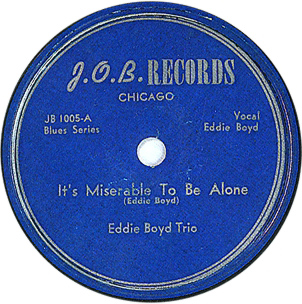
The other two tracks were not released on JOB.
"Hard Headed Woman" was provided with an overdubbed tenor sax part in 1952, but Brown still left it in the can.
"Blue Coat Man" was remade at the session of May 30, 1952, and the remake was the one that Joe Brown chose to release (on JOB 1007). A take of "Blue Coat Man" from the June 30, 1951 session—no overdubbing done later—has been issued on a P-Vine LP and a Delmark CD; the Delmark release gave the date correctly as June 30, 1951—but supplied the matrix number of the new version from May 30, 1952. The Delmark "Blue Coat Man" didn't really carry the matrix number 50181; we don't know which of the takes from the June 30, 1951 session it was. But we have placed it as the first take here.
The only matrix numbers on JOB 1005 (which is known as a 78-rpm release with a blue label) are 1005A and 1005B plus the M.R.S. suffix in the wax. The artist designation is "Eddie Boyd Trio." Its blue label confirms that JOB 1005 was released before 1007. JOB 1005 has never been reissued in any form.

After the big sales for JOB 1007 (which were promptly followed by Eddie Boyd's decision not to continue with the company), JOB 1005 was replaced by JOB 1009. Announced in a joint Chance/JOB advert in Cash Box on February 7, 1953, followed by an ad in Billboard on February 21 (p. 52), 1009 was a yellow-label 45-rpm and 78-rpm release with matrix numbers 1009-A and 1009-B on the label. There is no MRS in the trailoff region—JOB was no longer using that studio by the time that the records were being pressed—but the matrix numbers in the vinyl have been altered to 1005AA and 1005BB.
Negro Art M-12-SB-360 was an LP released in France, around 1968, under the title Story of the Blues: Blues Panorama 2. P-Vine Special [J] PLP-9022 is part of a 4-LP box, 9022/9025, issued in Japan in 1981 under the title Chicago Blues: A Quarter Century. Flyright FLY 585, Memphis Minnie & Others: World of Trouble, was an LP released in Britain in 1982. Flyright FLYCD 31 and Paula PCD-15 appeared under the title Chicago Piano 1951-1958 from Cobra and JOB. They were released in 1990 and 1991, respectively. They employed the overdubbed (JOB 1009) version of "It's Miserable to Be Alone." So, we surmise, does P-Vine PCD 24076, Chicago Blues Piano Hitters! from 2001. The overdubbed version most recently appears on Fuel 302 061 939, The J.O.B. Records Blues Story a 2-CD set issued in 2012.
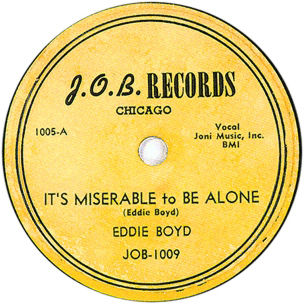
Our thanks to Dave Sax for obtaining some of the original matrix numbers from this session, and for sorting it out clearly from Eddie Boyd's second session of May 30, 1952.
Eddie Boyd was able to tour with a large group on the strength of "Five Long Years." But he was not satisfied with the shortage of royalties coming his way from JOB. By August 1952, before his record became a national hit, he was already recording for Al Benson, who sold the session to Chess. By October, as "Five Long Years" was really hitting, he was in the studio making his next hit, "24 Hours," for the Chess brothers.
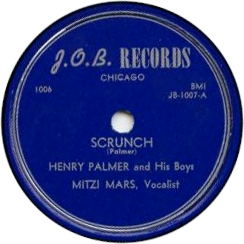
Mitzi Mars (voc); Henry Palmer (p, ldr); unidentified (tp); unidentified (as); unidentified (d).
Modern Recording Studio, Chicago, June 30, 1951
| MRS-39144; JB-1007-A | Scrunch (Palmer) | JOB 1006 | |
| MRS-39145; JB-1007-B | Jump Boy (Palmer) | JOB 1006 |
According to the death files kept at the Chicago Federation of Musicians, Henry Palmer was a pianist, born in Georgia on September 28, 1898. There is no mention of Palmer in histories of Chicago jazz during the 1920s. But we know he was in Chicago in the late 1930s, because his Social Security number was issued there. He was elected to membership in Local 208 on April 1, 1941, but this may have been a renewal, not the date that he initially joined. What little we know about his activity as a leader indicates that he was booked into White clubs, not South Side establishments. Palmer's contract with Art Frasik was accepted and filed by Musicians Union Local 208 on April 10, 1941. He filed an "indefinite" contract with Frasik's Cocktail Lounge on June 18, 1942. He posted a contract with a joint called the Key, on January 7, 1943, and a contract with the Whirlaway Lounge on April 20, 1944. On July 20, 1944, he posted a contract for 2 weeks with options at the Elbow Room. He showed up again on June 7, 1945, with a contract for 1 week with options at the Character Club. After that he dropped out sight for nearly 5 years. Henry Palmer was called in front of the Musicians Union Local 208 Board on April 20, 1950, because of unpaid loans dating from 1948. He told the Board he had "suffered from arthritis in the arms, and [had] not been able to play music for eight years." After more like 5 1/2 years of inactivity, Henry Palmer posted an indefinite contract with Mills' Inn on December 7, 1950.
To put Henry Palmer in perspective, he was born the same year as Jimmy Yancey, and the year after Fletcher Henderson. From the evidence of these recordings (the only ones he is known to have made), he was basically a Stride pianist. Because of Palmer's strong left hand, Joe Brown didn't hesitate to record him with drums and no bass (a lineup that was common in Chicago clubs, though not on recording sessions, during the 1930s and 1940s). Unfortunately, the songs that Palmer chose to feature are two Swing dance numbers with lyrics unusually silly for an already lightheaded genre. (And where was the market for such things in 1952? No wonder JOB 1006 is such a rare record.) The band, which there is no reason to doubt is Palmer's working ensemble from Mills' Inn, is a little rough and ready (both sides end less than crisply). On the plus side are the good alto saxophonist (sounding a little like Wille Randall) who solos on both sides, and Palmer's rock-solid accompaniment (his left hand really does make a string bass unnecessary). Mitzi Mars, who by this time had enjoyed several runs at the Club DeLisa, tries to inject some excitement (the upward glissando on "hunch," for instance) but is ultimately brought down by dopey words that sacrifice everything to the compulsion to rhyme. The other musicians are a Swing trumpet player (muted on "Scrunch," open on "Jump Boy," no solos) and a rather heavy drummer. Listening to a dub of Dr. Robert Stallworth's copy has allowed us to give the correct instrumental lineup for the first time.
Discographies give June 30, 1951 as the recording date, which makes eminent sense as long as the matrix numbers were39144 and 39145, not the 31944 and 31945 that have been previously listed. JOB 1006 was issued in January 1952.
Henry Palmer remained on the scene after this recording date, but his appearances on the Local 208 contract list were infrequent and we wonder how much time he was spending out of music. He did not reappear as a leader until September 15, 1955, when his contract with the Jet Lounge was accepted and filed. On June 7, 1956, he posted an indefinite contract with Club Capri, and on August 1, 1957, he posted an indefinite contract with the Shoreline Club. He would file at least one more contract before the 1966 merger of Local 208 with the old White Local 10: the list for January 7, 1965 includes his contract for 2 weeks at the Touch of Olde. We don't know whether he continued to play engagements after the merger. Henry Palmer died in Chicago on March 20, 1984.
Meanwhile, Mitzi Mars went on to enjoy some success in Chicago clubs during the first half of the 1950s. She gravitated toward R&B, which much improved her commercial prospects. Her second recording opportunity, in March 1953, yielded a much higher-profile record for Checker with the Sax Mallard combo. Checker 773 was a hit, though the later sides she cut for Checker were left in the vault.
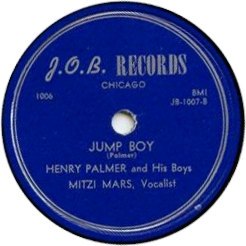
Guitarist John Brim was born in Hopkinsville, Kentucky, on April 10, 1922. He moved to Indianapolis in 1941 and Chicago in 1945; in the early 1950s he lived in Gary, Indiana. Along with his wife Grace (on harmonica and drums), Brim made recordings for Detroit-based Fortune (1950) and St. Louis-based Random (1951), before hooking up with JOB.
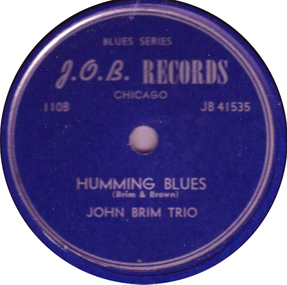
John Brim (humming on ^; eg, voc); Sunnyland Slim (humming^; p); Moody Jones (b).
Modern Recording Studio, Chicago, September 27, 1951
| JB-41531 | Young and Wild | P-Vine [J] PLP-9020, Flyright [Br] FLY 568, KC CD 03, Paula PCD-22, P-Vine [J] PCD-24089, Classics 5086 [CD] | |
| JB-41532-1 | I Love My Baby | P-Vine [J] PLP-9020, Flyright [Br] FLY 568, KC CD 03, Paula PCD-22, P-Vine [J] PCD-24089, Classics 5086 [CD] | |
| JB-41532-2 | I Love My Baby | Flyright [Br] FLY 568 | |
| JB-41533 (JB 41534 on label) |
Trouble in the Morning (Brim and Brown) | JOB 110A, Muskadine 1, Muskadine M 100, XTRA [Br] 1133, P-Vine [J] PLP-9020, Flyright [Br] FLY 568, KC CD 03, Paula PCD-22, Westside WESD 233 [CD], P-Vine [J] PCD-24089, Classics 5086 [CD], Fuel 302 061 939 [CD] | |
| JB-41534 (JB 41535 on label) |
Humming Blues (Brim and Brown) ^ | JOB 110B, Muskadine 1, Muskadine M 100, XTRA [Br] 1133, P-Vine [J] PLP-9020, Flyright [Br] FLY 568, KC CD 03, Paula PCD-22, Westside WESD 233 [CD], P-Vine [J] PCD-24089, Classics 5086 [CD] |
JOB 110 was released in the third quarter of 1951. We previously estimated the recording date as August 1951; according to Mark Humphrey's notes to the KC release, the correct date is September 27.
In discographies, the matrix number for "Trouble in the Morning" is given as JB-41533 but on the label of JOB 110 it shows up as JB 41534. "Humming Blues" is listed as 41534 in the discographies but the label reads 41535.
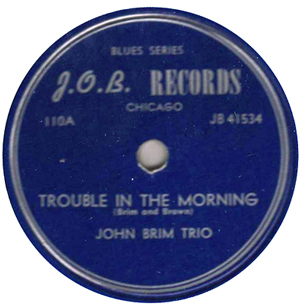
Muskadine 1 (released c. 1969) was an LP titled On the Road Again: An Anthology of Chicago Blues 1947-1954. It was reissued under the same title, with the same tracks in a different order, in 1971 as Muskadine M 100, which in turn was reissued in Britain in 1973 as XTRA 1133. John Brim & Little Hudson, was released in Japan in 1980; "Trouble in the Morning" came out as "Woke Up This Morning." Its near-Doppelgänger, Flyright FLY 568, John Brim / Little Hudson, was released in Britain in 1981. KC CD 03 and Paula PCD-22 were various-artists collections titled Trouble in the Morning: 1950s Chicago Blues from JOB/Cobra. The Paula was issued in 1991 and the KC, purportedly made in Czechoslovakia, is dated 1992. The KC appears to have originated from the Flyright label. Westside WESD 233 is a compilation of 54 JOB blues tracks on 2 CDs; titled Rough Treatment: The J.O.B. Records Story, it was released in Britain in 2001. P-Vine PCD-24089, Chicago Blues Down-Homers!, was released in Japan in 2001. Classics 5086, John Brim 1950-1953, is a 2004 release. Fuel 302 061 939, The J.O.B. Records Blues Story is a 2-CD set issued in 2012.
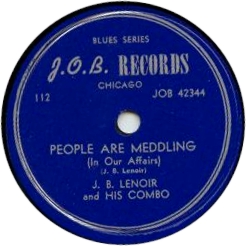
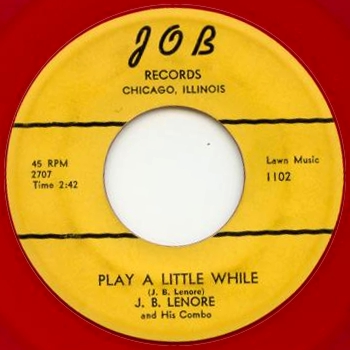
J. B. Lenoir (eg, voc); Sunnyland Slim (p); Alfred Wallace (d).
Modern Recording Studio, Chicago, October 22, 1951
| J-42341; 2707 | Play a Little While (Lenoir) | JOB 1102, Negro Art [F] M-12-SB-361, Flyright [Br] FLY 564, P-Vine Special [J] PLP 9038, Delmark DL-648, P-Vine [J] PLP-364, Delmark DD-648 [CD], Flyright FLYCD 04, Paula PCD-4, Westside WESD 233 [CD], Classics 5128 [CD], Fuel 302 061 917 [CD], Fuel 302 061 939 [CD] | |
| J-42342; 2706 | Louise (Lenoir) | JOB 1102, Negro Art [F] M-12-SB-361, Flyright [Br] FLY 564, P-Vine Special [J] PLP 9038, Delmark DL-648, P-Vine [J] PLP-364, Delmark DD-648 [CD], Flyright FLYCD 04, Paula PCD-4, Classics 5128 [CD], Fuel 302 061 917 [CD] | |
| JOB 42343-1 | Let's Roll | Flyright [Br] FLY 564, Flyright FLYCD 04, Paula PCD-4 | |
| JOB 42343-2 | Let's Roll (Lenoir)^ | JOB 112, Flyright [Br] FLY 564, P-Vine Special [J] PLP-9022, Flyright FLYCD 04, Paula PCD-4, P-Vine [J] PCD-24113, Classics 5128 [CD], Fuel 302 061 917 [CD], Fuel 302 061 939 [CD] | |
| JOB 42344 | People Are Meddling (In Our Affairs) (Lenoir)^ | JOB 112, Flyright [Br] FLY 564, P-Vine Special [J] PLP 9038, Delmark DL-648, P-Vine [J] PLP-364, Delmark DD-648 [CD], Flyright FLYCD 04, Paula PCD-4, Westside WESD 233 [CD], Classics 5128 [CD] |
The first two items have sometimes been dated late 1953 or early 1954 in discographies. This dating practice reflects the release date of JOB 1102—definitely not when the items were recorded. JOB 112 was first mentioned in Billboard during the week of August 2, 1952, and the 78 label is the old blue and silver; JOB 1102 was probably released in April 1954 and was advertised in Cash Box on May 22, 1954. The U series numbers that were attached to JOB 1102 indicate mastering around January 1954.
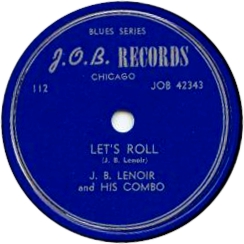
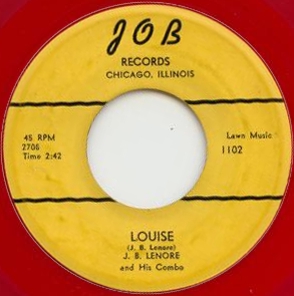
Negro Art M-12-SB-361, Story of the Blues: Chicago Blues 2, was released in France around 1968. Flyright [Br] FLY 564, J. B. Lenoir: The Mojo Boogie, was released in 1980. P-Vine Special [J] PLP-9022 is part of a 4-LP box, 9022/9025, issued in Japan in 1981 under the title Chicago Blues: A Quarter Century. P-Vine PLP 9038, released in Japan in 1982, is a forerunner of Delmark DL 648, with the same tracks in the same order; it was replaced a few years later with a straight reissue of the Delmark... Delmark DL-648, The Blues World of Little Walter, was an LP released in 1983. Besides three tracks from this session it included 2 by Sunnyland Slim that had been recorded for Regal and 8 tracks recorded for Parkway in 1950 by Baby Face Leroy Foster with Little Walter and Muddy Waters. P-Vine PLP-364 is the Japanese version of the same LP. Delmark DD-648 is a CD reissue of the same package. Flyright FLYCD 04 and Paula PCD-4, J. B. Lenoir 1951-1954: His JOB Recordings, were released in 1989 and 1990, respectively. Westside WESD 233 is a compilation of 54 JOB blues tracks on 2 CDs; titled Rough Treatment: The J.O.B. Records Story, it was released in Britain in 2001. P-Vine PCD-24113, Chicago Blues Down-Homers Vol. 2: The JOB Recordings 1950's, was released in Japan in 2001. Classics 5128, J. B. Lenoir 1951-1954, was released in 2005. Fuel 302 061 917, J. B. Lenoir: Expanded Edition, is a CD released in 2012; it consists of 8 tracks derived from JOB and another 8 from the 1960s. Fuel 302 061 939, The J.O.B. Records Blues Story is a 2-CD set issued in 2012.
After working for barnstorming tenor saxophonist J. T. Brown from January through September 1951, veteran trumpeter King Kolax (1912 - 1991) was able to return to leading a combo around the beginning of October 1951; his contract with the Rose Bowl was accepted and filed by Local 208 on October 4. Kolax was able to recruit an outstanding tenor saxophonist in Dick Davis (1917 - 1954), who had led his own bands and previously recorded as a leader, and judging from the sound of the released sides from this session, he had pianist Prentice McCarey (1909 - 1992) on board as well. The bassist and drummer we aren't so sure about, but we're assuming they were the same musicians that Kolax used in the summer of 1952 when he recorded behind singer Joe Williams for Al Benson; two of those sides were issued on Checker.
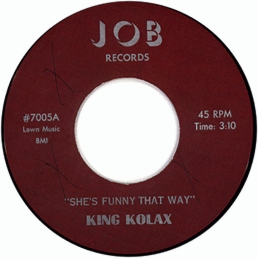
King Kolax (tp -1, voc); Dick Davis (ts); prob. Prentice McCarey (p); prob. Cowboy Martin (b); prob. Kansas Fields (d).
Modern Recording Studio, Chicago, October 22, 1951
| JB42345 | Lonesome Man Blues [KK voc] | JOB 114 | |
| JB42346 | Why Don't They Tell Me? -1 [KK voc] | JOB 114 | |
| JB42347 | Tenderly | unissued | |
| JB42348 | K. K. Boogie | — | |
| JB?, 7005A | She's Funny That Way [KK voc] | JOB 7005 | |
| JB?, 7005B | Side Man (Kolax) -1 | JOB 7005 | |
| JB? | Green Monday | unissued | |
| JB? | Early Hours | — | |
| JB? | Jelly Beans | — | |
| JB? | You Go Your Way | — |
Jørgen Jepsen's discography mentions only the first two sides, and gives a date of 1949, which is way too early for this session. The first King K release was JOB 114, possibly in the summer of 1952 (wouldn't it be nice to find contemporary advertisements?). But JOB reused the number for JOB 114 by blues harmonica player John Lee (Henley), recorded in 1952 but not released until 1958. (Duplicated release numbers were no biggie at JOB, which was also the site of dueling releases on JOB 101 and JOB 1111.) Lord adds JOB 7005 (titling one side "Why Didn't You Tell Me So?"), and gives the date as late 1951 or early 1952. The complete session is listed by Leadbitter and Slaven, Blues Records 1943 to 1970 A-K(1987).
The original matrix numbers for this session—JB42345 through JB42348—immediately follow a JOB session by J. B. Lenoir, which took up JB42341 through JB42344. The five-digit matrix series derives from Modern Recording Studio, at 55 West Wacker Drive, an outfit that JOB used regularly from 1950 through the end of 1952. In the wax on JOB 7005, the name EDDIE FLICK appears after JOB 7005A on Side A.
A tape copy of JOB 114, courtesy of Daniel Gugolz, reveals King K's vocals on both sides, limited exposure for his trumpet (none on "Lonesome Man," a role in the "mop-mop" ensemble that opens "Why Didn't" and a short solo at the end of that piece). There are tenor sax solos by Dick Davis on both sides. The pianist is a serious blues player.
A tape copy of JOB 7005, courtesy of Tom Kelly, shows King K as a vocalist on "She's Funny That Way." He must have listened to Hot Lips Page a lot. There is also a lyrical tenor sax solo by Dick Davis (whose playing throughout this session is outstanding). On "Side Man" King K does (finally) feature himself on trumpet; there is also a strongly delineated tenor sax solo, and the pianist takes the bridge of the theme. The drummer is quite boisterous on this selection.
Allan Roberts describes "Side Man" as follows: "[Kolax's] style was quite idiosyncratic—lots of smears and glisses—I always believed that he was taking the 'Sweets' Edison style to its logical, if somewhat extreme, conclusion." The "extreme" elements are some high-note excursions (rather like Al Killian, but less wheezy sounding, and well integrated into the solo); King K also uses several bebop phrases. JOB 7005 is known only on 45s. Some accounts say it was released in the early 1970s (not long before Joe Brown finally closed down his label and sold the masters to Jewel Records). Whenever the release was done, Joe Brown was no longer sticking to his original matrix number scheme when he got around to 7005.

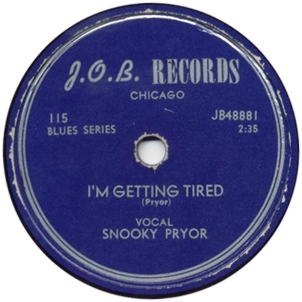
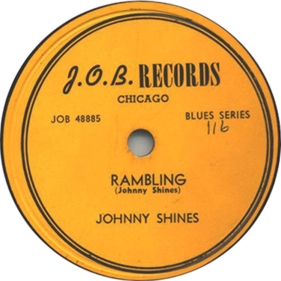
On 48880, 48881, and 48884: Snooky Pryor (hca); Sunnyland Slim (p); Moody Jones (eg); Alfred Elkins (b); Alfred "Fat Man" Wallace (d).
On 48882 and 48883: Moody Jones (eg, voc); Snooky Pryor (hca except -1); probably Johnny Shines (eg); prob. Alfred Wallace (d).
On 48885 through 48888: Johnny Shines (eg, voc); prob. Moody Jones (eg -1); prob. Al Smith (b).
Modern Recording Studio, Chicago, April 28, 1952
| JB-48880 | Fine Boogie | Flyright [Br] FLY 565, Flyright [Br] FLYCD 20, Paula PCD-11, Westside WESA 869 [CD] | |
| JB48881 | I'm Getting Tired (Pryor) | JOB 115, Flyright [Br] FLY 100, Flyright [Br] FLY 565, Flyright [Br] FLYCD 20, Paula PCD-11, Westside WESA 869 [CD], Fuel 302 061 939 [CD] | |
| Harp Instrumental | Flyright [Br] FLY 566, Flyright [Br] FLYCD 20, Paula PCD-11, Westside WESA 869 [CD] | ||
| JB-48882-1 | Rough Treatment^ | Flyright [Br] FLY 565, Flyright [Br] FLYCD 20, Paula PCD-11, Westside WESA 869 [CD] | |
| JB-48882-2 | Rough Treatment^ | Flyright [Br] FLY 565, P-Vine Special [J] PLP-9022, Flyright [Br] FLYCD 20, Paula PCD-11, Westside WESA 869 [CD], P-Vine [J] PCD-24089 | |
| JB-48883-1 | Why Should I Worry^ | Flyright [Br] FLY 565, P-Vine Special [J] PLP-9022, Flyright [Br] FLYCD 20, Paula PCD-11, Westside WESA 869 [CD], Westside WESD 233 [CD], P-Vine [J] PCD-24089, Fuel 302 061 939 [CD] | |
| JB-48883-2 | Why Should I Worry^ -1 | Flyright [Br] FLY 565, KC CD 03, Paula PCD-22 | |
| Please Somebody^ | Flyright [Br] FLY 565, P-Vine Special [J] PLP-9022, Juke Joint LP 1501, Flyright [Br] FLYCD 31, Paula PCD-15, Westside WESD 233 [CD], P-Vine [J] PCD-24089 | ||
| JB48884 | Going Back on the Road (Pryor) | JOB 115, Flyright [Br] FLY 100, Flyright [Br] FLY 565, Flyright [Br] FLYCD 20, Paula PCD-11, Westside WESA 869 [CD] | |
| Hold Me in Your Arms | Flyright [Br] FLY 565, Flyright [Br] FLYCD 20, Paula PCD-11, Westside WESA 869 [CD] | ||
| (Real) Fine Boogie | Flyright [Br] FLY 565, Flyright [Bt] FLYCD 20, Paula PCD-11, Westside WESA 869 [CD] | ||
| JOB 48885 | Rambling (Shines)* | JOB 116, Blues Classics BC 6, Nighthawk LP 102, Flyright [Br] FLY 563, P-Vine Special [J] PLP-9022, Flyright [Br] FLYCD 10, Paula CD 14, P-Vine [J] PCD-24051, Fuel 302 061 939 [CD] | |
| JOB 48886 | Fish Tail* | Flyright [Br] FLY 563, P-Vine Special [J] PLP-9022, Flyright FLYCD 10, Paula CD 14, P-Vine [J] PCD-24051 | |
| JOB 48887 | Cool Driver (Shines) -1* | JOB 116, Nighthawk LP 102, Flyright [Br] FLY 563, P-Vine Special [J] PLP-9022, Paula CD 14, Flyright FLYCD 10, Westside WESD 233 [CD], P-Vine [J] PCD-24051 | |
| JOB 48888 | Ain't Doin' No Good -1* | Flyright [Br] FLY 563, P-Vine Special [J] PLP-9022, Paula CD 14, Flyright FLYCD 10, P-Vine [J] PCD-24051 |
Mike Leadbitter and Neal Slaven, Blues Records 1943-1966 give the lineup for the Johnny Shines numbers as Johnny Shines and Al Smith only. But they also mention just the first three matrix numbers, and give no title besides "Rambling." By the time Flyright CD 10 was issued in 1989, discographical research had progressed: all four titles and their matrix numbers were included. The matrix numbers appeared to come from a big session on April 28, 1952 with Snooky Pryor, Moody Jones, Sunnyland Slim, and Alfred Elkins. However, Moody Jones denied recording with Shines, and discographers were sorely tempted to attribute this session to a different date. We can be sure about the date, though. The matrix series is from Modern Recording Studios at 55 West Wacker Drive; JOB used Modern regularly from 1950 through the end of 1952.
Blues Classics BC 6, Country Blues Classics Volume 2, was an LP released in 1966; the liners merely gave "early 1950s" as the date on "Rambling." Flyright FLY 100 was released in Britain in 1969, under the title Snooky Pryor. Nighthawk LP 102, Chicago Slickers 1948-1953, was released in 1976. Flyright FLY 563 was issued in Britain in 1980, under the title Johnny Shines & Robert Lockwood: Dust My Broom. Flyright FLY 565 was also issued in Britain in 1980, under the title Snooky & Moody: Real Fine Boogie, and Flyright FLY 566 was released in 1980 under the title Sunnyland Slim. P-Vine Special [J] PLP-9022 is part of a 4-LP box, 9022/9025, issued in Japan in 1981 under the title Chicago Blues: A Quarter Century. Flyright FLYCD 20 and Paula PCD-11 were issued in 1990 and 1991, respectively, under the title Snooky Pryor; they also include earlier recordings derived from the Marvel and Planet labels via Old Swing-Master. In the notes to Paula PCD-11, "Hold Me in Your Arms" and "Real Fine Boogie" are said to have been done at a different session in the "mid-1950s"; yet the listed personnel is identical to what we have here! KC CD 03 and Paula PCD-22 were various-artists collections titled Trouble in the Morning: 1950s Chicago Blues from JOB/Cobra. The version of "Why Should I Worry" that is included on KC CD 03 has no harmonica on it. Paula PCD-22 was issued in 1991 and the KC, purportedly made in Czechoslovakia, is dated 1992. The KC appears to have originated from the Flyright label. Westside WESA 869, Snooky Pryor & Friends: Pitch a Boogie Woogie If It Takes Me All Night Long: Seminal Post-War Chicago Blues, is a British CD released in 2001. P-Vine PCD-24089, Chicago Blues Down-Homers!, was releaed in Japan in 2001. Westside WESD 233 is a compilation of 54 JOB blues tracks on 2 CDs; titled Rough Treatment: The J.O.B. Records Story, it was released in Britain in 2001. Fuel 302 061 939, The J.O.B. Records Blues Story is a 2-CD set issued in 2012.
Flyright FLYCD 10 and Paula PCD-14, Johnny Shines and Robert Lockwood,were released in 1989 and 1990 respectively. There are definitely two guitars on "Rough Treatment"; the overall guitar sound is very similar to what can be heard on "Cool Driver" by Johnny Shines. P-Vine PCD-24051, Robert Jr. Lockwood & Johnny Shines: Sweet Home Chicago, was released in Japan in 2001.
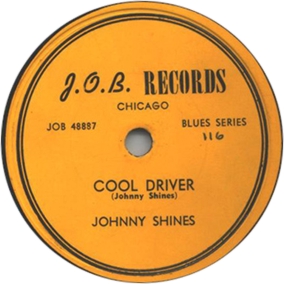
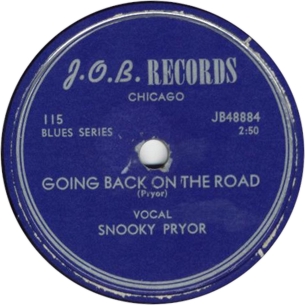
The 1989 notes claim that Moody Jones, if he was there, switched from bass to guitar for "Ain't Doin' No Good." Problem is, the bass is present on all four Johnny Shines cuts! (It's hardest to hear on "Ain't Doin' No Good," where the second guitar part is fuller.) Besides, there is a second guitar on "Cool Driver," too. The string bass is thuddy and poorly recorded—none of which exactly rules Al Smith out. The only thing that might go against Al is the occasional hint of slap bass. Did he have that in his repertoire?
Meanwhile, the Moody Jones sides are conventionally said to have included a bass player, but on "Why Should I Worry" (the version without harmonica) there are just guitars and drums.
JOB 116 was mentioned in Billboard on August 16, 1952. Many of the known copies have the release number written in by hand, although copies with a printed "116" also exist. JOB 115 was probably released around the same time as 116. Flyright FLYCD 31 was released in 1990 and Paula PCD-15 was released in 1991 under the title Chicago Piano 1951-1958 from Cobra and JOB.
JOB hit its commercial high point with the session of May 30, 1952, in which Eddie Boyd remade "Blue Coat Man" with a quintet featuring the tenor saxophone of Ernest Cotton, and the band also cut a new tune titled "Five Long Years."
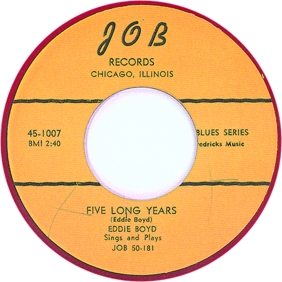
Eddie Boyd (p, voc); Ernest Cotton (ts); L. C. McKinley (eg); Alfred Elkins (b); Percy Walker (d).
Modern Recording Studio, Chicago, May 30, 1952
| 50-181 | Five Long Years (Boyd) | JOB 1007, P-Vine Special [J] PLP-9022, Flyright [Br] FLYCD 31, Paula PCD-15, Chess CHD2-9385 [CD], Westside WESD 233 [CD], P-Vine [J] PCD 24076, Fuel 302 061 939 [CD] | |
| 50182-2 | Blue Coat Man | JOB 1007, Negro Art [F] M-12-SB-360, Westside WESD 233 [CD], P-Vine [J] PCD 24076 |
JOB 1007 was released during the week of July 26, 1952. It was being advertised along with new Chance releases in Cash Box on August 2, 1952. The copies we know of all have a yellow label. "Five Long Years" was by far the biggest recording commercially for Joe Brown—nothing less than a number one R&B hit. But without Chance's distribution there was no way to move such a record in quantity nationwide. The take number for "Blue Coat Man" is marked in the vinyl on the JOB 78s but not the 45s.
Negro Art M-12-SB-360 was an LP released around 1968 in France, under the title Story of the Blues: Blues Panorama 2. P-Vine Special [J] PLP-9022 is part of a 4-LP box, 9022/9025, issued in Japan in 1981 under the title Chicago Blues: A Quarter Century. Flyright FLYCD 31 and Paula PCD-15 appeared under the title Chicago Piano 1951-1958 from Cobra and JOB. They were released in 1990 and 1991, respectively. Westside WESD 233 is a compilation of 54 JOB blues tracks on 2 CDs; titled Rough Treatment: The J.O.B. Records Story, it was released in Britain in 2001. P-Vine PCD 24076 appeared in Japan in 2001, under the less than idiomatic title Chicago Blues Piano Hitters! Fuel 302 061 939, The J.O.B. Records Blues Story is a 2-CD set issued in 2012.
The version of "Blue Coat Man" included on Delmark DE-717 actually comes from Boyd's previous session of June 30, 1951. There is no tenor sax on it and Walker's drumming is a good deal lighter on it than on the sides from May 30, 1952.
When Eddie Boyd produced a session in November 1959 and sold it to Chess, he threw in the master to "Five Long Years" from this session. As preserved in the Chess vaults, under the new number 9836, it was the May 30, 1952 master minus a few notes at the beginning of Boyd's piano intro. It may well have dawned on the Chess brothers where the side was really from; in any event, they did not reissue "Five Long Years." It finally surfaced in 1997 on Chess CHD2-9385, Chess Blues Piano Greats: Eddie Boyd, Lafayette Leake, Willie Mabon, Otis Spann, wrongly attributed to the November 1959 session.
Our thanks to Dave Sax for his hard work sorting out this session from the previous Eddie Boyd session, and for catching Eddie Boyd's bit of subterfuge in 1959.
After not seeing the kind of royalty income he thought was due from "Five Long Years," Eddie Boyd signed with Al Benson, who in turn transferred his contract to the Chess brothers; Eddie Boyd would remain with Chess until 1957, and then return to the company for a brief spell in 1959.
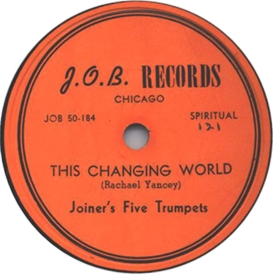
Lee Sims; James Cochrane; George Dowell; Walter Ford; Larry Bride (voc).
Modern Recording Studio, Chicago, June 19, 1952
| 50-183-1 | Just Tell My Jesus | P-Vine Special [J] PLP-9035, Delmark DE-760 | |
| JOB 50-184-1 JB-50184 M.R.S. 210 | This Changing World (R. Yancey) | JOB 121, P-Vine Special [J] PLP-9035, Delmark DE-760 | |
| 50-185-1 | Freedom after Awhile (J. James) | P-Vine Special [J] PLP-9035, Delmark DE-760 | |
| JOB 50-186-2, JB-50186 M.R.S. 210 | Where Can I Go (M. Jackson) | JOB 121, P-Vine Special [J] PLP-9035, Delmark DE-760 |
Details of this session (except the personnel) come from Hayes and Laughton's gospel discography. It is possible, given the matrix numbers, that the session actually took place on May 30, 1952, immediately after the two Eddie Boyd sides were laid down.
JOB 121 was released in July 1952. Some copies have the release number handwritten in as shown in our illustrations; others have a printed release number centered at the bottom of the label. The session has never shown up on any reissue of JOB material licensed from Stan Lewis.
P-Vine Special PLP-9035 was titled Golden Bells of Gospel and issued in Japan in 1982. The record business has many vagaries, but who would have expected gospel tracks as powerful as "Just Tell My Jesus" and "Freedom After Awhile" to make their first appearance in Japan? We presume that a Delmark LP with a similar track list was planned, but nothing happend for another 20 years. Delmark DE-760, On the Battlefield... Great Gospel Quartets, is a CD compilation released in 2002. As had been the case with the P-Vine LP, the other gospel groups on the CD recorded for United and States. The session tapes on the Trumpets obviously ended up in the hands of Leonard Allen during his brief alliance with Joe Brown (1957-1958); apparently they were never returned.
Delmark DE-760 uses "Just Tell Me Jesus" for 50-183-1, but the Five Trumpets sing "Just tell my Jesus." P-Vine Special got the title right.
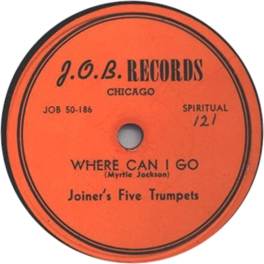
Joiner's Five Trumpets was a veteran Gary, Indiana-based outfit. When future soul singer Roscoe Robinson joined the Trumpets around 1942 members were Walter Ford (lead), John Ford (bass), Lonnie B. Ford (tenor), George Anthony (baritone), as well as Roscoe Robinson (lead). The group's manager was Milton Joiner, who did a bit of singing with the group as well. Robinson was long gone from the group when these sides were made (he departed in 1945). In the Five Trumpets' recordings for the Gary-based label Hi-Hat (made in 1953) only Walter Ford remained from the original group. According to Opal Louis Nations, the five singers we have listed above were "mainstays of Joiner's Five Trumpets during the 1950s." The Trumpets also recorded on Staff and Inspirational.
Sources used: Ray Funk's unpublished interview with Roscoe Robinson, May 13, 1983; Cedric Hayes and Robert Laughton, Gospel Records 1943-1969 (London: Record Information Services, 1992); Opal Louis Nations, liner notes to Delmark DE-760.
John Brim married Grace Millard in 1947, when she was 23. She had been singing and playing harmonica, but she was encouraged by John to take up drums, and received lessons from Odie Payne. Grace sang and played harmonica on the 1950 Fortune session and sang on the 1951 Random session. This marked the first session on which she played drums; it produced the first release to give her top billing as Grace Brim (Random had put her on the label—as "Mrs. John Brim").

The release of "Drinking Woman" on JOB 1011 marks the first appearance of Lawn Music, Inc. on a JOB label. Previously when a music publlisher was mentioned on a JOB label, it belonged to a participant in one of Joe Brown's joint ventures: Joni Music was owned by Art Sheridan of Chance, and Frederick Music was run by businessman Vincent "Bud" Brandom (born 1920), who would frequently collaborate with Brown for the rest of his career. According to Mike Brown, Lawn was named after his father's younger brother, Lawrence Gutierrez. Lawn would function as the house music publisher for the rest of the label's history.
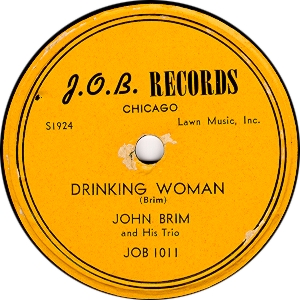
Grace Brim (hca -1; voc -1, 2; d); John Brim (voc -3, eg); prob. Eddie Taylor (eg); Sunnyland Slim (p).
Modern Recording Studio, Chicago, August 22, 1952
| JB-51921 M.R.S. | Hospitality Blues [Chattanooga Tennessee*] (Grace Brim) [GB voc] -2 | JOB 117, P-Vine [J] PLP-9020*, Flyright [Br] FLY 568, KC CD 03, Paula PCD-22, Westside WESD 233 [CD], P-Vine [J] PCD-24089, Classics 5086 [CD] | |
| JB-51922 M.R.S. | Man around My Door (Grace Brim) [GB voc] -1, 2 | JOB 117, Flyright [Br] FLY 568, KC CD 03, Paula PCD-22, Westside WESD 233 [CD], P-Vine [J] PCD-24089, Classics 5086 [CD], Fuel 302 061 939 [CD] | |
| 51923-1 | Hard Pill to Swallow [JB voc]* -3 | Juke Joint LP 1501, P-Vine [J] PLP-9020, Flyright [Br] FLY 568, P-Vine Special [J] PLP-9023, Flyright FLY 568, KC CD 03, Paula PCD-22, Westside WESD 233 [CD], P-Vine [J] PCD-24089, Classics 5086 [CD] | |
| 51923-2 | Hard Pill to Swallow [JB voc]* -3 | unissued? | |
| S1924 [sic] | Drinking Woman (Brim) [JB voc]* -3 | JOB 1011, Boogie Disease BD 101/102, P-Vine [J] PLP-9020, Flyright [Br] FLY 568, KC CD 03, Paula PCD-22, Westside WESD 233 [CD], P-Vine [J] PCD-24089, Classics 5086 [CD], Fuel 302 061 939 [CD] |
This looks like the last session that JOB cut at Modern Recording Studio. We had previously estimated the recording date as July 1952; Mark Humphrey's notes to the KC reissue give August 22 as the date.
Yellow-label JOB 117 probably came out in 1952. Although Grace Brim is billed as "Queen of the Harmonica" on JOB 117 she plays it only on "Man around My Door," a remake of "Strange Man" from the Brims' 1950 session for Fortune. Most likely she played the harmonica while working the bass drum and the high hat with her feet. On "Hospitality Blues," a variant of "Catfish Blues," she sticks to the pedals.
Existing discographies have put Eddie Taylor's guitar only on the numbers that John Brim sang, when careful listening reveals two guitars on all four sides. Meanwhile, an unidentified string bass player has been placed on the date when no such instrument is audible.
JOB 1011, which also has a yellow label, looks like a 1953 release. On the label of JOB 1011, the matrix number of "Drinking Woman" (51924) has been distorted into S1924.
Boogie Disease BD 101/102 was a 2-LP set, released in 1972, with the title Take a Little Walk with Me. John Brim & Little Hudson, on P-Vine Special PLP-9020, was released in Japan in 1980. "Hospitality Blues," the only Grace Brim vocal on PLP-9020, was mistitled "Chattanooga Tennessee" (title subsequently corrected on P-Vine PCD-24089). Flyright FLY 568, John Brim/Little Hudson, was released in Britain in 1981, According to Stefan Wirz, the Flyright LP purports to contain tk. 2 of "Hard Pill to Swallow," but actually uses tk. 1. P-Vine Special [J] PLP-9023 is part of a 4-LP box, 9022/9025, issued in Japan in 1981 under the title Chicago Blues: A Quarter Century. KC CD 03 and Paula PCD-22 were various-artists collections titled Trouble in the Morning: 1950s Chicago Blues from JOB/Cobra. The Paula was issued in 1991 and the KC, purportedly made in Czechoslovakia, is dated 1992. The KC appears to have originated from the Flyright label, but no Flyright CD under this title was actually released. Westside WESD 233 is a compilation of 54 JOB blues tracks on 2 CDs; titled Rough Treatment: The J.O.B. Records Story, it was released in Britain in 2001. P-Vine PCD-24089, Chicago Blues Down-Homers!, was released in Japan in 2001. Classics 5086, John Brim: 1950-1953, was released in 2004. It's worth noting that Brim's sesssion for Parrot, which concludes the CD, was probably done in March 1954. Fuel 302 061 939, The J.O.B. Records Blues Story is a 2-CD set issued in 2012.


John Lee Henley (hca, voc); Robert Jr. Lockwood (eg); Johnny Holloway (eg); Moody Jones (b); Zona Sago [Allan Williams] (d).
probably Hall Recording Company, Chicago, 1952
| U-4911 | Rythm [sic] Rockin' Boogie [JH, ens voc] | JOB 114-A, Boogie Disease BD 101/102, P-Vine Special [J] PLP-9023, Flyright [Br] FLY 585, Flyright [Br] FLYCD 11, Paula PCD-7, Westside WESD 233 [CD], P-Vine [J] PCD 24075, Fuel 302 061 939 [CD] | |
| U-4912 | Knockin' on Lula Mae's Door (John Lee) | JOB 114-B, Boogie Disease BD 101/102, P-Vine Special [J] PLP-9023, Flyright [Br] FLY 585, Flyright [Br] FLYCD 11, Paula PCD-7, Westside WESD 233 [CD], P-Vine [J] PCD 24075 |
A recording date of 1958(?) is given in previous discographies, but this is derived from the release date. The only release announcement we know of comes from the week of May 12, 1958. (We have no idea why Brown would sit on these two great blues performances for so long. Did he plan and then abandon an earlier release?)
Helge Thygesen has argued for an earlier recording date on stylistic grounds—the sound is too down-home and "Knockin'" has too much of a lope to it for 1958. Indeed, Moody Jones, who recorded regularly for JOB between 1950 and 1953, retired from playing blues shortly after his last session for the label. Zona Sago first recorded under his own name for Joe Brown in October 1953. (Later, he cut singles for Abco around March 1956, and for Argo late that same year). The label is yellow and the release series is an old one, too; if it weren't for some differences in the type style used, these features would suffice to point to a 1952 or 1953 release. The matrix series doesn't help us because we don't know anything else in the U-4900s.
Apparently clinching the matter is the appendix to Bob Koester's listing of "The United/States Masters," p. 22, which mentions six "masters from JOB" that were in Leonard Allen's holdings when Koester purchased them. Four were gospel tracks by unidentified groups, all recorded at Hall Recording Company. The other two were the John Lee Henleys.
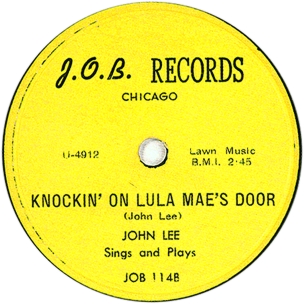
Both sides carry 141M in the wax. Boogie Disease BD 101/102, Take a Little Walk with Me, was a double LP released in the United States in 1972. P-Vine Special [J] PLP-9023 is part of a 4-LP box, 9022/9025, issued in Japan in 1981 under the title Chicago Blues: A Quarter Century. Flyright FLY 585 was released in Britain in 1982, under the title Memphis Minnie & Others: World of Trouble. Flyright FLYCD 11 and its American Doppelgäganger Paula PCD-7 were an anthology of material derived from JOB and Cobra, titled Chicago Blues Harmonicas. The CDs were released in 1989 and 1991. Westside WESD 233 is a compilation of 54 JOB blues tracks on 2 CDs; titled Rough Treatment: The J.O.B. Records Story, it was released in Britain in 2001. P-Vine PCD 24075, Chicago Blues Harp Blowers!, was released in Japan in 2001. Fuel 302 061 939, The J.O.B. Records Blues Story is a 2-CD set issued in 2012.
John Lee Henley (born in Canton, Mississippi, on February 13, 1919) recorded as John Lee, and should not be confused with the John Lee who recorded for Federal. "Rythm Rockin' Boogie" is a rough driving number that captures the spirit of the Chicago style bar band blues. On "Knockin' on Lula Mae's Door" Henley sings and blows with a highly appealing gentle lope. But his voice and harmonica aren't very distinctive sonically. Mike Rowe's only mention of Henley has him working for a time in Big Boy Spires' band, the Rocket Four.
John Lee Henley recorded on three unissued sessions with guitarist Honeyboy Edwards during 1965 and 1966, so the JOB release is the full extent of his issued discography.
Sources used: Mike Rowe, Chicago Breakdown (London: Eddison Press, 1973); Mike Leadbitter, Leslie Fancourt, and Paul Pelletier, Blues Records 1943-1970, Volume Two L to Z (London: Record Information Services, 1994); Bob Koester, "The United/States Masters," Blues Unlimited no. 123, Jan.-Feb. 1977.
personnel unidentified
prob. Hall Recording Company, Chicago, 1952
| Gotta Straighten Up | JOB unissued | ||
| Big World of Peace | — | ||
| Nellie | — | ||
| Holy Moses | — |
These highly obscure gospel items are mentioned only in Bob Koester's discography of the United/States labels. They were on the same JOB-derived tape in Leonard Allen's holdings as the two John Lee Henley sides. The entire tape carries a Work Order number MP-2674 from Hall Recording Company (a small studio that operated in Chicago during the 1950s). Koester listed the artists on the first two numbers as though they were a different group from the artists on the last two, but he may have done so simply because the two John Lee numbers were inserted in between.

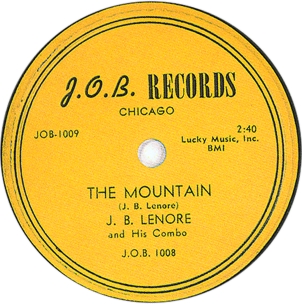
J. B. Lenoir (eg, voc); Sunnyland Slim (p); unidentified (b); Alfred Wallace (d).
Universal Recording, Chicago, c. October 1952
| U-1008 | I Have Married (Lenoir) | Flyright [Br] LP 564, Flyright [Br] FLYCD 04, Paula PCD-4, P-Vine [J] PCD-24113, Classics 5128 [CD] | |
| 1009 | The Mountain ("Lenore") | JOB 1008, Flyright [Br] LP 564, Flyright [Br] FLYCD 04, Paula PCD-4, P-Vine [J] PCD-24113, Classics 5128 [CD] | |
| U-1010 [tk. 2] | I'll Die Tryin' ("Lenore") | JOB 1016, Negro Art [Fr] M-12-SB-358, Flyright [Br] LP 564, Flyright [Br] FLYCD 04, Paula PCD-4, P-Vine [J] PCD-24113, Classics 5128 [CD], Fuel 302 061 917 [CD] | |
| 1011 | How Much More ("Lenore") | JOB 1008, Flyright [Br] LP 564, Flyright [Br] FLYCD 04, Paula PCD-4, Westside WESD 233 [CD], P-Vine [J] PCD-24113, Classics 5128 [CD], Fuel 302 061 917 [CD], Fuel 302 061 939 [CD] |
These appear to be from a new U-1000 series at Universal Recording. At this point, JOB and Chance were working together. The unobtrusive bassist on the session could be any of a number of people. JOB 1008, with a yellow label, was advertised in November 1952. It was included in a joint Chance/JOB ad in Cash Box, December 27, 1952. JOB 1016 was issued in September 1953 (getting promoted in Dave Clark's "Rhythm and Blues Tattler," Billboard, September 5, 1953, p. 44). Some 45-rpm copies of JOB 1016 were pressed on red vinyl.
Negro Art M-12-SB-358 was released in France around 1968, as Story of the Blues: Chicago Blues 1. Flyright [Br] FLY 564, released in Britain in 1980 as J. B. Lenoir: Mojo Boogie, was the first appearance on record of "I Have Married." Flyright FLYCD 04, J. B. Lenoir 1951-1954: His JOB Recordings, was released in 1989; its American counterpart on Paula PCD-4 followed in 1990. Westside WESD 233 is a compilation of 54 JOB blues tracks on 2 CDs; titled Rough Treatment: The J.O.B. Records Story, it was released in Britain in 2001. P-Vine PCD-24113, Chicago Blues Down-Homers Vol. 2: The JOB Recordings 1950's, was released in Japan in 2001. Classics 5128, J. B. Lenoir 1951-1954, was released in 2005. The Classics notes identify the take of "I'll Die Tryin'" that's been in circulation as take 1. Fuel 302 061 917, J. B. Lenoir: Expanded Edition, is a CD released in 2012; Bill Dahl's liner notes include a reference to this page, for which we are appreciative. Fuel 302 061 939, The J.O.B. Records Blues Story is a 2-CD set issued in 2012.
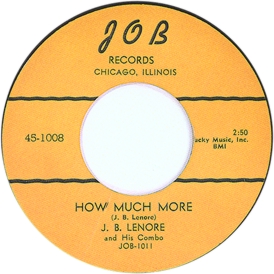
On 1012 and 1013: Baby Face Leroy Foster (eg, voc); Sunnyland Slim (p); Ernest "Big" Crawford (b); Alfred Wallace (d).
On "Where Have You Been So Long": unidentified (voc); Sunnyland Slim (p); poss. Pete Franklin (eg, voc); poss. Moody Jones (b); Alfred Wallace (d)
On 1014 and 1015: John Brim (eg, voc); Ernest Cotton (ts); Sunnyland Slim (p); Pete Franklin (eg); Ernest "Big" Crawford (b); Alfred Wallace (d)
On 1016 and 1017: Sunnyland Slim (p, voc); John Brim (eg); Ernest Cotton (ts); Pete Franklin (eg); Ernest "Big" Crawford (b); Alfred Wallace (d)
On 1018 and 1019: Ernest Cotton (ts, voc); Sunnyland Slim (p, shouts); Robert Jr. Lockwood (eg); Ernest "Big" Crawford (b); Alfred Wallace (d).
prob. Universal Recording, Chicago, prob. October 1952
| 1012 | Late Hours at Midnight^ | P-Vine Special [J] PLP 9023, Flyright [Br] 584, Flyright [Br] FLYCD 28, Paula PCD-19, Westside WESD 233 [CD], P-Vine [J] PCD-24089 | |
| 1013-1 | Blues Is Killin' Me^ | Juke Joint LP 1501, P-Vine Special [J] PLP 9023, Flyright [Br] 584, Flyright [Br] FLYCD 28, Paula PCD-19, Westside WESD 233 [CD], P-Vine [J] PCD-24089, Fuel 302 061 939 [CD] | |
| 1014 | Don't Leave Me% | P-Vine Special [J] PLP-9020, Flyright [Br] FLY 568, KC CD 03, Paula PCD-22, P-Vine [J] PCD-24089, Classics 5086 [CD] | |
| 1015 | Moonlight Blues% | P-Vine Special [J] PLP-9020, Flyright [Br] FLY 568, KC CD 03, Paula PCD-22, P-Vine [J] PCD-24089, Classics 5086 [CD] | |
| Couldn't Take My Rest* | unissued | ||
| Where Have You Been So Long# | Flyright [Br] 584, Flyright [Br] FLYCD 28, Paula PCD-19 | ||
| U-1016 | Over Nite@ [Woman Trouble (Luandrew)] | JOB 1011@, JOB 1105, Flyright [Br] FLY 566@, Flyright [Br] FLYCD 31@, Paula PCD-15@, Opal OCD 110%, Westside WESA 910 [CD]%, Westside WESD 233 [CD], P-Vine [J] PCD 24076@, Classics 5171 [CD], Fuel 302 061 384 [CD], Fuel 302 061 939 [CD] | |
| U-1017 | City of New Orleans | Westside WESA 910 [CD], Classics 5171 [CD], Fuel 302 061 384 [CD] | |
| 1018 | Going Back to Memphis (Cotton)* [EC voc] | JOB 1120, Westside WESD 233 [CD], Fuel 302 061 939 [CD] | |
| 1019 | Uh'm Beautiful (Cotton)* | JOB 1120, Westside WESD 233 [CD] | |
| Sharron* | JOB 1125 | ||
| Unusual Guy* | JOB 1125 |
The variety of leaders and lineups on this session has generated considerable confusion over the years. Even Joe Brown got confused: he incorrectly attributed a Sunnyland Slim number to John Brim on the first release from the session. (He may have intended to issue one of John Brim's contributions, but if so he was not successful.) During the lifetime of JOB, the total yield consisted of one Sunnyland Slim side (misidentified on its first release, then correctly attributed on the second) and four Ernest Cotton sides, which were held from release for 7 or more years. The Leroy Foster and John Brim sides were passed over entirely, as was the striking rendition of "Where Have You Been So Long?"
At this point, we can identify nearly all of the players, except on the still-enigmatic "Where Have You Been So Long?"
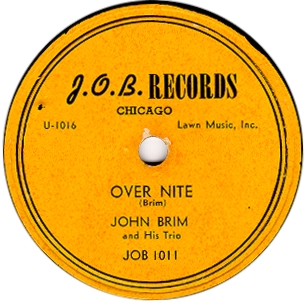
One of the two Sunnyland Slim items was selected for release at the time. U-1016 first appeared in 1953 on JOB 1011, where it was incorrectly attributed to John Brim and His Trio and spelled "Over Nite"; the flip was (indeed) by John Brim. When reissued on JOB 1105, during the week of August 7, 1954, it was now correctly credited to Sunnyland Slim. (The flip side, "Shake It Baby," did not come from this session; we have learned that it was orginally released on Ebony 1009. See session JOB30 below.) Apparently the ads for 1011 gave the title as "Overnite," but on the label of JOB 1105 and in advertisements for it the title was now the originally intended "Woman Trouble" (well, in the ads it was "Woman Troubles"). JOB 1105 was released in July 1954 (see the company ad in Cash Box, July 3, 1954, p. 60). It was reissued as "Over Night" on Flyright FLY 566, Sunnyland Slim, and on Flyright FLYCD 31 and Paula PCD-15, Chicago Piano 1951-1958 from Cobra and JOB. (These were released in 1990 and 1991 respectively. ) The same title was used on P-Vine PCD 24076, a Japanese release from 2001 titled Chicago Blues Piano Hitters! "Woman Trouble" ended up being used on Opal OCD 110, Sunnyland Slim: Patriarch of the Blues in 1995 and on the Westside release from 2001. Fuel 302 061 384, Sunnyland Slim: Highway 61, is a CD released in 2004. The matrix number for this title appears to be in the same U-1000 series as the preceding session by J. B. Lenoir. The vocals on U-1017 have been attributed by some to Ernest Cotton, but one listen makes it obvious that this is Sunnyland Slim (the song, whose title refers to a train, is a variant on his signature number "Sunnyland Train").
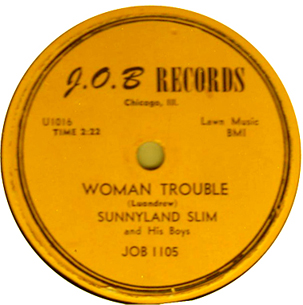
1009A, which was first released on JOB 1105, appears to be more of the same Sunnyland Slim material (the A would distinguish it from 1009 by Lenoir). However, on 1009A Big Crawford is restricted to maracas, the drummer does hand percussion only, the guitarist (not Junior Lockwood, and not J. B. Lenoir) is hard to hear, and an uncredited female vocalist responds to Sunnyland's pleas. The recording quality even suggests that the side was made somewhere besides Universal Recording. Westside WESA 910, Sunnyland Slim & Friends: Sunnyland Special: The Cobra & JOB Recordings 1949-1956, is a British CD released in 2001. Classics 5171, Sunnyland Slim 1952-1955, was relased on CD in 2006. Fuel 302 061 939, The J.O.B. Records Blues Story is a 2-CD set issued in 2012.
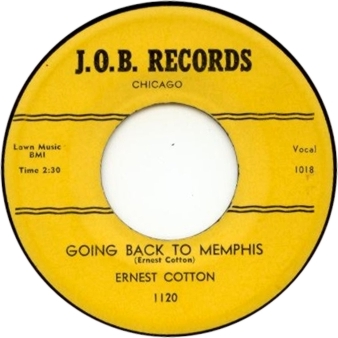
Some sources have attributed the vocals on 1014 and 1015 to Ernest Cotton. But beginning with P-Vine Special [J] PLP-9020, John Brim & Little Hudson, which was released in Japan in 1980, they are correctly attributed to John Brim. The same goes for the rather similar, though not identical, British LP from 1981 on Flyright FLY 568. KC CD 03, Trouble in the Morning: Chicago Blues of the Fifties (obviously of Flyright origin, but supposedly issued in Czechoslovakia in 1992), and its American counterpart from 1991, Paula PCD-22, also carry the John Brim credit. To mix us up further, Mark Humphrey's notes to KC CD 03 assert that the two tracks were cut for the Random label, a short-lived venture run by Monroe Passis, but never released there. Yet the sides are obviously from this session... John and Grace Brim had recorded for Random in 1951, with pianist Roosevelt Sykes. The sides are again attributed to John Brim on P-Vine PCD-24089, Chicago Blues Down Homers! The JOB Recordings 1950's, a Japanese release from 2001, and on John Brim's Classics release from 2004 (see below)
Meanwhile, existing discographies put the sides that Ernest Cotton really did sing on in 1952. Judging from dubs of JOB 1120 provided by Dr. Robert Stallworth, the year is correct. "Going Back to Memphis" features Cotton's smooth baritone vocals, along with a tenor sax solo. "Uh'm Beautiful" is an instrumental slow blues, basically consisting of Sunnyland's piano solo, Robert Jr. Lockwood's guitar solo, and Cotton's two-chorus tenor sax solo, pensive for 12 bars and harsh for another 12. Lockwood's presence on both sides is unmistakable. Cotton's sides would wait several years for release: JOB 1120 in 1959 (the label style is consistent with that year, anyway), and JOB 1125 in 1963. It would be nice to inspect the matrix numbers on JOB 1125, if there are any. Inquiring minds want to know.
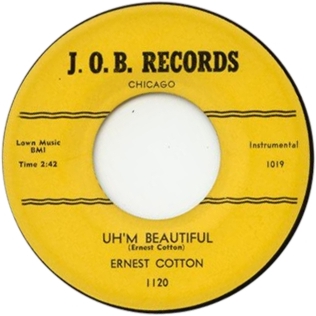
Finally, Flyright FLY 584, Baby Face Leroy & Floyd Jones, a British LP from 1983, then Flyright FLYCD 28, a 1990 various-artists release titled Blues Is Killin' Me, with American representation from 1991 on Paula PCD-19, gives "Where Have You Been So Long" as the work of an "unknown artist." The number has been associated with John Brim in some past discographies. But according to Steve Franz, neither the vocals nor the Elmore James-style slide guitar belong to Brim. To rlc, the guitarist sounds like a well amplified Robert Nighthawk. Lamont "Guitar Pete" Franklin, a colleague of Brim's from his days in Indianapolis, played with a slide on St. Louis Jimmy's 1947 side "One Doggone Reason," recorded for Hy-Tone but released on Joe Brown's first label, Opera. Could he have assimilated the Elmore James style by this time? According to Mike Rowe in his notes to Flyright FLYCD 28, Sunnyland Slim, Moody Jones, and Alfred Wallace do seem to have been on board. The vocalist could indeed be Ernest Cotton (assuming he was too busy with singing to pick up his sax on the number) but this remains to be verified.
The Baby Face Leroy items went unreleased until years later. One was first released on a Juke Joint LP; then both appeared in 1981 on P-Vine Special [J] PLP 9023, part of 4-LP boxed set, Chicago Blues: A Quarter Century, then on Flyright FLY 584 in 1983, They were subsequently issued on Flyright FLYCD 28 Blues Is Killin' Me (1990) and its American counterpart on Paula PCD-19 (1991). Maybe the sides went unreleased because both numbers—"Late Hours at Midnight" and "Blues Is Killing Me"—were slow brooding blues, and Joe Brown was looking for some more rocking material, which he had not been not getting out of Foster. Nonetheless, Foster's insinuating vocals are especially effective, and they both benefit enormously from Sunnyland Slim’s superb accompaniment. His last recording apparently prescient, Foster never recorded again. Dissipating his career in chronic alcoholism, he died in Chicago on 26 May 1958.
The genuine John Brim sides from this session, which was to be his swan song for JOB, remained unissued for nearly 30 years. The real John Brim items were released for the first time in 1980 in Japan on P-Vine Special PLP-9020, John Brim & Little Hudson, and in 1981 in Britain on Flyright FLY 568, John Brim/Little Hudson. The backing is somewhat uncharacteristic—note Ernest Cotton's tenor sax solos on "Don't Leave Me" and "Moonlight Blues"—as though Brim is merely making a guest appearance with Sunnyland's combo. Both sides can also be heard on Classics 5086, John Brim 1950-1953, a 2004 release.
Maybe he realized that no releases were going to ensue, for less than 3 months later, Brim was recording for Checker. "Rattlesnake," made at the tail end of a session by Little Walter's Jukes in January 1953, brought together Brim's laid-back vocals and Walter's blazing harp work. Held back from release because the song was an obvious knockoff of "Hound Dog" and Duke Records was behaving litigiously, it is now recognized as a Chicago blues classic. Brim's second session for Checker, in May 1953, also went unreleased at the time. It would give him a delayed payoff many years later when the hard rock group Van Halen covered "Ice Cream Man." In 1954, Brim recorded "Tough Times," for Al Benson's Parrot imprint, and gave the label one of its few hits. He did two more sessions for Checker, in 1955 and 1956, but then for the next fifteen years he was out of the recording studio. Brim continued to work in the clubs, however. He resumed recording in 1971 with a single on his own label, and then recorded for Wolf (1989), Tone Cool (1994), and Anna Bea (1999). Grace Brim died in 1999, and John died on October 1, 2003.
Several tracks from this session are now assembled on Westside WESD 233, a compilation of 54 JOB blues tracks on 2 CDs. Titled Rough Treatment: The J.O.B. Records Story, it was released in Britain in 2001.
JOB started 1953 with some close collaboration between Joe Brown by Art Sheridan (whose pressing company, Armour Plastics, had probably been pressing most JOB product for a while). Some of the JOB masters recorded in 1953 actually appeared on the Chance label, while Sheridan's ads in the trade papers continued to mix Chance and JOB releases. Four top-flight blues sessions in January 1953 are the lasting results of this alliance.

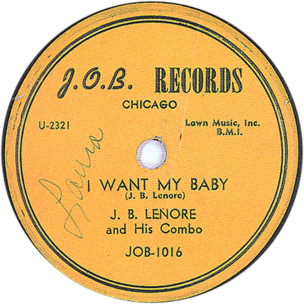
On 2319-2322: J. B. Lenoir (eg, voc); J. T. Brown (ts); Sunnyland Slim (p); Alfred Wallace (d)
On 2323-2325: Sunnyland Slim (p, voc); J. T. Brown (ts); J. B. Lenoir (eg); unidentified (b); Alfred Wallace (d)
On 2326-2327: add Johnny Shines (eg, voc) to the previous lineup.
Universal Recording, January 12, 1953
| U-2319-1 | The Mojo | P-Vine Special [J] PLP 707, Flyright [Br] FLY 564, Flyright [Br] FLYCD 04, Paula PCD-4, Fuel 302 061 917 [CD] | |
| U-2319-4 | The Mojo ("Lenore") | JOB 1012, Flyright [Br] LP 564, Flyright [Br] FLYCD 04, Paula PCD-4, Westside WESD 233 [CD], P-Vine [J] PCD-24113, Classics 5128 [CD], Fuel 302 061 939 [CD] | |
| U-2320-1 | Slow Down Woman | P-Vine Special [J] PLP 707, Flyright [Br] LP 564, Flyright [Br] FLYCD 04, Paula PCD-4 | |
| U-2320-2 | Slow Down Woman | Constellation LP CS-6, Flyright [Br] FLY 566, Flyright [Br] FLYCD 04, Paula PCD-4, P-Vine [J] PCD-24113, Classics 5128 [CD] | |
| U-2321-1 | I Want My Baby | P-Vine [J] Special PLP 707, Flyright [Br] LP 564, Flyright [Br] FLYCD 04, Paula PCD-4 | |
| U-2321-4 | I Want My Baby (Lenore) | JOB 1016, Consellation CS-6, Flyright [Br] FLY 566, Flyright [Br] FLYCD 04, Paula PCD-4, P-Vine [J] PCD-24113, Classics 5128 [CD] | |
| U-2322-1 | How Can I Leave (Lenore) | JOB 1012, P-Vine Special [J] PLP 707, Flyright [Br] LP 564, Flyright [Br] FLYCD 04, Paula PCD-4, P-Vine [J] PCD-24113, Classics 5128 [CD], Fuel 302 061 917 [CD] | |
| U-2323 | When I Was Young* (Luandrew) | Constellation CS-6, P-Vine Special [J] PLP 707, Flyright [Br] FLY 566, Flyright [Br] FLYCD 04, Paula PCD-4, Westside WESA 910 [CD], P-Vine [J] PCD 24076, Classics 5171 [CD], Fuel 302 061 384 [CD] | |
| U-2324 | Bassology* (Luandrew) | Constellation CS-6, P-Vine Special [J] PLP 707, Flyright [Br] FLY 566, Flyright [Br] FLYCD 04, Paula PCD-4, Westside WESA 910 [CD], P-Vine [J] PCD 24076, Classics 5171 [CD], Fuel 302 061 384 [CD] | |
| U-2325 | Worried about My Baby* (Luandrew) | Constellation CS-6, P-Vine Special [J] PLP 707, Flyright [Br] FLY 566, Flyright [Br] FLYCD 04, Paula PCD-4, Westside WESA 910 [CD], P-Vine [J] PCD 24076, Classics 5171 [CD], Fuel 302 061 384 [CD] | |
| U-2326 | Livin' in the White House^ (Shines) | Constellation CS-6, Boogie Disease BD 101/102, Flyright [Br] FLY 566, Flyright [Br] FLYCD 04, Paula PCD-4, Classics 5171 [CD] | |
| U-2327 | Please Don't^ (Shines) | Constellation CS-6, Nighthawk LP 101, Flyright [Br] FLY 566, Flyright [Br] FLYCD 04, Paula PCD-4, Classics 5171 [CD] |
JOB 1012 was issued in May 1953 with a yellow label; it was promoted in Dave Clark's "Rhythm and Blues Tattler" column in Billboard on July 11, 1953 (p. 42). JOB 1016, also with a yellow label, was released in October of that year (some 45-rpm copies of 1016 were pressed on red vinyl). While Brown was reasonably prompt in releasing the J. B. Lenoir sides, the Sunnyland Slims were never issued either on JOB or on Chance. They had to wait until 1964, when Art Sheridan and Ewart Abner put them out on Constellation LP CS-6. Brown also passed over the two sides with vocals by Johnny Shines in favor of his work from the January 23 session.
Boogie Disease BD 101/102, Take a Little Walk with Me, was released in 1972. Nighthawk LP 101, Windy City Blues—The Transition: 1935-1953, was released in 1976. P-Vine Special PLP 707, Chance Vintage Blues/R&B Crops Vol. 3: J. B. Lenore/Sunnyland Slim/Lazy Bill, was released in Japan in 1977, through a special deal with Art Sheridan. Flyright FLY 564, J. B. Lenoir: Mojo Boogie, was released in Britain in 1980, and Flyright FLY 566, Sunnyland Slim, was also released in 1980. Flyright FLYCD 04 and Paula PCD-4, J. B. Lenoir 1951-1954: His JOB Recordings, came out in 1989 and 1990, respectively. Westside WESA 910, Sunnyland Slim & Friends: Sunnyland Special: The Cobra & JOB Recordings 1949-1956, is a British CD released in 2001. Westside WESD 233 is a compilation of 54 JOB blues tracks on 2 CDs; titled Rough Treatment: The J.O.B. Records Story, it was released in Britain in 2001. P-Vine PCD 24076, Chicago Blues Piano Hitters!, was released in Japan in 2001; P-Vine PCD-24113, Chicago Blues Down-Homers Vol. 2, was likewise released in Japan in 2001. Classics 5128, J. B. Lenoir 1951-1954, is a CD released in 2005; Classics 5171, Sunnyland Slim 1952-1955, is a 2006 release. The two sides sung by Johnny Shines ("Livin' in the White House" and "Please Don't") are included on the Sunnyland Slim Classics CD because he led the session. Fuel 302 061 384, Sunnyland Slim: Highway 61, is a CD released in 2004. Fuel 302 061 917, J. B. Lenoir: Expanded Edition, is a CD released in 2012. Fuel 302 061 939, The J.O.B. Records Blues Story is a 2-CD set issued in 2012.
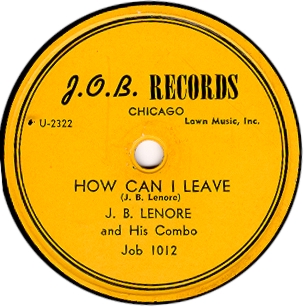
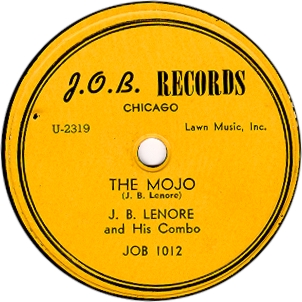
The second session on January 17, featuring Big Boy Spires and Johnny Williams, led to Chance releases only, so it isn't reproduced here. On January 23, James Williamson (who recorded his signature number "Homesick" at this session) and Johnny Shines recorded back to back. The Shines material came out on JOB and the Homesick James to Chance. We have included just the Johnny Shines tracks in our next listing.
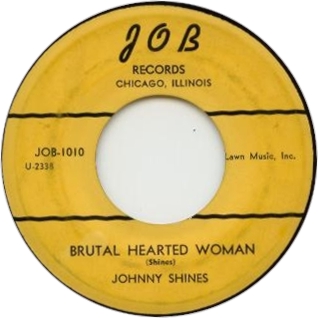

Johnny Shines (eg, voc); Walter Horton (hca); Al Smith (b).
Universal Recording, Chicago, January 23, 1953
| U-2337 [tk. 1] | Evening Shuffle | Flyright [Br] FLY 563, P-Vine [J] PCD 2176, Flyright [Br] FLYCD 10, Paula PCD-14 | |
| U-2337 [tk. 2] | Evening Shuffle (Shines) | P-Vine Special [J] PLP 705, Flyright [Br] FLY 563, Flyright [Br] FLYCD 10, Paula PCD-14, P-Vine [J] PCD-24051 | |
| U-2337 [tk. 3] | Evening Sun (Shines) | JOB 1010, Muskadine 1, Muskadine M 100, XTRA [Br] 1133, P-Vine Special [J] PLP-705, Flyright [Br] FLY 563, Flyright [Br] FLYCD 10, Paula PCD-14, Westside WESD 233 [CD], P-Vine [J] PCD-24051 | |
| U-2338-2 | No Name Blues (Shines) | P-Vine [J] Special PLP-705, Flyright [Br] FLY 563, Flyright [Br] FLYCD 10, Paula PCD-14 | |
| U-2339-1 (U-2338 on label) | Brutal Hearted Woman (Shines) | JOB 1010, Muskadine 1, Muskadine M 100, XTRA [Br] 1133, P-Vine Special [J] PLP-705, Flyright [Br] FLY 563, Flyright [Br] FLYCD 10, Paula PCD-14, Westside WESD 233 [CD], P-Vine [J] PCD-24051 | |
| U-2340 | Gonna Call the Angel [sic!] (Shines) | P-Vine Special [J] PLP-705, Flyright [Br] FLY 563, Flyright [Br] FLYCD 10, Paula PCD-14, P-Vine [J] PCD-24051 | |
| U-2340-3 | Gonna Call the Angel (Shines) | P-Vine Special [J] PLP-705, Flyright [Br] FLY 563, Flyright FLYCD 10, Paula PCD-14, P-Vine [J] PCD-24051 |
JOB 1010 was probably released in March 1953. Muskadine 1 (c. 1969), Muskadine M 100 (1971), and XTRA 1133 were all titled On the Road Again: An Anthology of Chicago Blues 1947-1954. The tracks that Joe Brown left in the can first saw release in the 1970s on P-Vine Special PLP-705, Chance Vintage Blues/R&B Crops Vol. 1: Johnny Shines Big Boy Spires with Johnny Williams. This was a Japanese LP released in 1977 under an arrangement with Art Sheridan of Chance Records. The four P-Vine Special PLP 700 LPs all preceded any business arrangement with Stan Lewis for JOB material. Flyright FLY 563 was released in Britain in 1980; the title was Johnny Shines & Robert Lockwood: Dust My Broom. Flyright FLYCD 10 and Paula PCD-14, Johnny Shines and Robert Lockwood, came out in 1989 and 1990 respectively. Westside WESD 233 is a compilation of 54 JOB blues tracks on 2 CDs; titled Rough Treatment: The J.O.B. Records Story, it was released in Britain in 2001. P-Vine PCD-24051, Robert Jr. Lockwood & Johnny Shines: Sweet Home Chicago, was released in Japan in 2001.
Steve Franz points out that "Gonna Call the Angel" has been mistitled, courtesy of Shines' occasionally strange modes of pronunciation. The first line of the song appears to go "I'm gonna call the county jail," not "I'm gonna call the angel" or (closer, but still no cigar) "I'm gonna call on account of the angel" or even "I'm gonna call the kind angel" (as it reads in the lyric sheet to P-Vine PCD-24051).
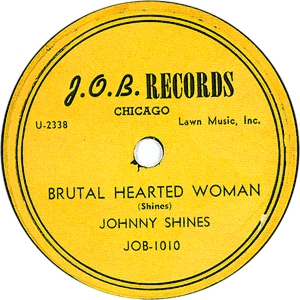
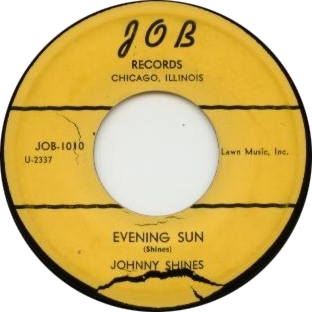
The final JOB/Chance sessions took place on January 31. Both Little Hudson and Floyd Jones saw their releases come out on JOB.
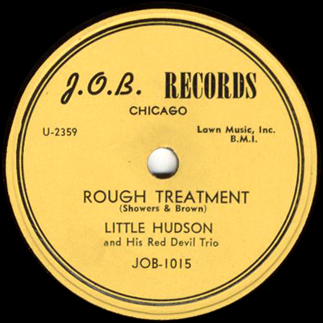
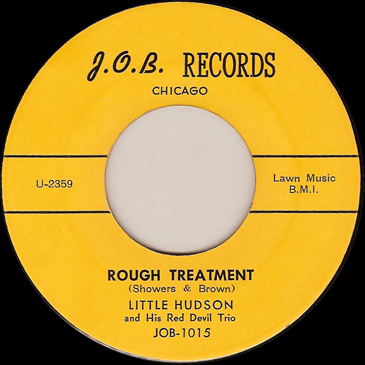

Little Hudson Shower (eg, voc); Lazy Bill Lucas (p); James Bannister (d).
Universal Recording, Chicago, January 31, 1953
| U-2359 | Rough Treatment ("Showers" and Brown) | JOB 1015, Blue Horizon LP2, Python PLP-KM 15, P-Vine Special [J] PLP-9020, Flyright [Br] FLY 568, Flyright [Br] FLYCD 28, Paula PCD-19, Westside WESD 233 [CD], P-Vine [J] PCD-24113, Fuel 302 061 939 [CD] | |
| U-2360 | I'm Looking for a Woman ("Showers" and Brown) | JOB 1015, P-Vine Special [J] PLP-9020, Flyright [Br] FLY 568, Flyright [Br] FLYCD 28, Paula PCD-19, Westside WESD 233 [CD], P-Vine [J] PCD-24113 | |
| U-2361-1 | Things Going So Tough with Me | Flyright [Br] FLY 568 | |
| U-2361-4 | Things Going So Tough with Me | P-Vine Special [J] PLP-9020, Flyright [Br] FLY 568, Flyright [Br] FLYCD 28, Paula PCD-19, Westside WESD 233 [CD], P-Vine [J] PCD-24113 | |
| U-2362 | Don't Hang Around | P-Vine Special [J] PLP-9020, Flyright [Br] FLY 568, Flyright [Br] FLYCD 28, Paula PCD-19, Westside WESD 233 [CD], P-Vine [J] PCD-24113, | |
| U-2363 | Shake It Baby | P-Vine Special [J] PLP-9020, Flyright [Br] FLY 568, P-Vine [J] PCD-24113 |
Another co-production with Chance. JOB 1015, which carried a yellow label, was a single released in September 1953. It was promoted in Dave Clark's "Rhythm and Blues Tattler" (a paid advertisement, not a regular column) in Billboard (September 5, 1953, p. 44).
The single was reissued in February 1957, catching a review in Cash Box on March 2 (p. 36). The lettering on the 1957 label is similar to what we encounter on the 1958 John Lee single, JOB 114. Also, the 1957 edition of JOB 1015 carries the notation 141M in the wax on both sides.
Blue Horizon LP2, Let Me Tell You about the Blues Volume 1, was released in Britain in 1966, in an edition of 99 copies to get around potential copyright issues; there was no Volume 2. Python PLP-KM 15, Blues from Chicago Volume 3, was a frank bootleg package, released in 1971. All but one track was released in Japan in 1980 on P-Vine Special [J] PLP-9020, John Brim & Little Hudson. The entire session was released in Britain in 1981 on Flyright [Br] FLY 568, John Brim/Little Hudson. Flyright FLYCD 28 and its American cognate Paula PCD-19 were issued in 1990 and 1991 and titled Blues Is Killin' Me. Westside WESD 233 is a compilation of 54 JOB blues tracks on 2 CDs; titled Rough Treatment: The J.O.B. Records Story, it was released in Britain in 2001. P-Vine PCD-24113, Chicago Blues Down-Homers Vol. 2: The JOB Recordings 1950's, was released in Japan in 2001. Fuel 302 061 939, The J.O.B. Records Blues Story is a 2-CD set issued in 2012.
Blues singer/guitarist Hudson Shower (Blues Who's Who says the commonly used form "Showers" is incorrect) was born September 6, 1919, in Aguilla, Mississippi, but was raised in Louise, Mississippi from age 11 on. At age 12 he took up guitar. In 1939 Shower came to Chicago, but it was not until 1946 that he entered the city's burgeoning deep blues scene, despite having played guitar for 15 years. He first followed some of the older musicians, such as Big Bill Broonzy, Big Maceo, and Tampa Red, before forming his own group, the Red Devil Trio, in 1950. Or so it has been said—Hudson "Showers" first showed up on the Local 208 list on October 20, 1949, when he posted a contract for 4 weeks at the Plantation Tap.
The first edition of the trio consisted of Hudson on vocals and guitar, Henry Gray on piano, and "Al" on drums. They were advertised in the Defender as playing at the Joy Box (3810 South State) in August 1950 (a 2-month contract by Hudson "Showers" with the Joy Box was accepted and filed by Musicians Union Local 208 on August 3). "Al" was soon replaced by James Bannister, and then Gray was replaced by Lazy Bill Lucas.
Little Hudson and the Red Devil Trio worked the Club Alibi, Du Drop Lounge, Cotton Club, Club Evergreen, Laura's 819 Lounge, and Vi's Lounge. A most interesting venue where Hudson and his group played in 1954 was the Gayspot (2711 Wentworth), owned by Tiny Davis and Ruby Lucas, who created a comfortable place for lesbians to be free to be themselves in a public setting.
Shower complained to Mike Rowe that JOB failed to release his most popular number, the jump blues, "Shake It Baby." Indeed, during his 1955 gigs at the 830 Mambo Club (850 East 43rd) and the Hob-Nob Lounge (5200 Wentworth), the clubs billed his band as "Little Hudson & His 'Shake It Baby' Red Devil Trio."
Shower was also unhappy with the way "Rough Treatment" turned out, bemoaning the sparseness of the music in the recording, "too many open spaces." (If "Rough Treatment" had too many, maybe Shower wouldn't have cared for the skeletal instreumental treatment of "Shake It Baby," which hasn't drawn much reissue attention over the years.) He voiced no complaint to Rowe about the hard driving "I'm Looking for a Woman," which is truly the stronger side.
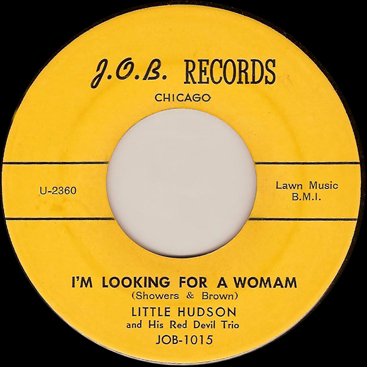
Rowe in his liners points out that "Things Going So Tough with Me," with its infectious riff, is a version of Big Maceo's "Tuff Luck Blues" sung to the "'44' Blues" theme. "Don't Hang Around" is another solid number that allows Shower to wail. Based on the quality of the output, it is surprising and disappointing to realize that this JOB session remains the only evidence we have of Shower on wax, except for St. George LP 1003, which has the group on a 1958 radio commercial for a recording store, "No Money Down."
Shower said he continued to play the clubs regularly into the early 1960s, but appearing in a North Side club, the Fickle Pickle, in 1963, could have meant that he no longer had a strong base in the black community. In 1964 he retired from the music business.
Sources Used: Henry Gray, interview by Hiroshi Takahasi, Blues Market Magazine, November/December 1998, Japan (http://blueslim.m78.com/henryinterview.html); Sheldon Harris, Blues Who's Who (New York: Da Capo, 1989); Mike Rowe, notes to "Blues Is Killin' Me" (Paula Records, PCD-19); and a variety of Chicago Defender clips.
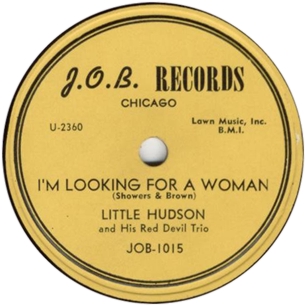
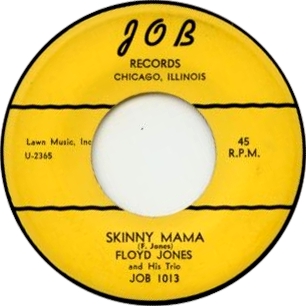
Floyd Jones (eg, voc); Sunnyland Slim (p); Moody Jones (b); unidentified (d).
Universal Recording, Chicago, January 31, 1953
| U-2364 | I Lost a Good Woman | Flyright [Br] LP 584, P-Vine Special [J] PLP-9028, Flyright [Br] FLYCD 28, Paula PCD-19, Westside WESA 910 [CD], P-Vine [J] PCD-24089, Classics 5130 [CD] | |
| U-2365 | Skinny Mama (Jones) | JOB 1013, Abco G-103, Boogie Disease BD 101/2, Flyright [Br] 584, P-Vine Special [J] PLP-9028, Flyright [Br] FLYCD 28, Paula PCD-19, Westside WESA 910 [CD], Westside WESD 233 [CD], P-Vine [J] PCD-24089, Classics 5130 [CD] | |
| U-2366 | Rising Wind | Flyright [Br] LP 584, P-Vine Special [J] PLP-9028, Flyright [Br] FLYCD 28, Paula PCD-19, Westside WESA 910 [CD], P-Vine [J] PCD-24089, Classics 5130 [CD] | |
| U-2367 | On the Road Again (Jones) | JOB 1013, Abco G-103, Muskadine 1, Muskadine M 100, XTRA [Br] 1133, Flyright [Br] 584, P-Vine Special [J] PLP-9028, Flyright [Br] FLYCD 28, Paula PCD-19, Westside WESA 910 [CD], Westside WESD 233 [CD], P-Vine [J] PCD-24089, Classics 5130 [CD], Fuel 302 061 939 [CD] |
JOB 1013, a 78 and 45-rpm single, was released in the summer of 1953. It was fleetingly reissued on Joe Brown's Abco label in 1956; on Abco G-103, U-2367 was titled "On the Road." (The Abco release is extraordinarily rare; it was quickly replaced with the "regular" Abco G-103, a new record by Freddie Hall.) Muskadine 1 (c. 1969), Muskadine M 100 (1971), and XTRA 1133 (1973) were all titled On the Road Again: An Anthology of Chicago Blues 1947-1954. Boogie Disease BD 101/102 was released in 1972 under the title Take a Little Walk with Me. Flyright FLY 584 was released in Britain in 1983, under the title Baby Face Leroy & Floyd Jones. P-Vine Special [J] PLP-9028, Floyd Jones: On the Road Again, was released in Japan in 1984. Flyright FLYCD 28 and its American cognate Paula PCD-19, Blues Is Killin' Me, were released in 1990 and 1991, respectively. Westside WESA 910, Sunnyland Slim & Friends: Sunnyland Special: The Cobra & JOB Recordings 1949-1956, is a British CD released in 2001. Westside WESD 233 is a compilation of 54 JOB blues tracks on 2 CDs; titled Rough Treatment: The J.O.B. Records Story, it was released in Britain in 2001. P-Vine PCD-24089, Chicago Blues Down-Homers!, was released in Japan in 2001. Classics 5130, Floyd Jones 1948-1953, was released in 2005. Fuel 302 061 939, The J.O.B. Records Blues Story is a 2-CD set issued in 2012.
Leadbitter and Slaven 1987 report an unissued track from this session: "I'm Gonna Buy a Big Knife." However, Steve Franz points out that in "I Lost a Good Woman," Floyd Jones sings, "I'm gonna go down to the pawnshop and buy myself a great big knife." This is almost certainly the known take of U-2364—if not, it's an unissued alternate take.
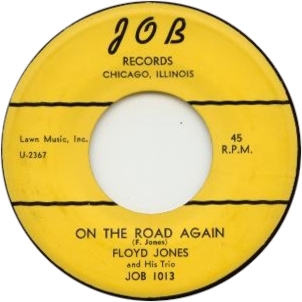
Snooky Pryor (hca, voc); Eddie Taylor (eg); unidentified (eg); unidentified (d).
Chicago, c. June 1953
| 3006 | Cryin' Shame (Pryor)^ | JOB 1014, Flyright [Br] FLY 100, Flyright [Br] FLY 585, Flyright [Br] FLYCD 11, Paula PCD-7, Westside WESA 869 [CD], Westside WESD 233 [CD], Fuel 302 061 939 [CD] | |
| 3011 | Eighty Nine Ten (Pryor)^ | JOB 1014, Flyright [Br] FLY 100, Flyright [Br] FLY 585, Flyright [Br] FLYCD 11, Paula PCD-7, Westside WESA 869 [CD], Westside WESD 233 [CD] |
We had previously placed these two sides with three that appear to have been recorded in the Fall of 1954, at Universal Recording (see JOB35 below). But the "Rhythm and Blues Tattler" (really a paid-for column in Billboard, written by publicist Dave Clark) flogged JOB 1014 on July 18, 1953 (p. 57, both titles mentioned), July 25, 1953 (p. 51), and August 15, 1953 (p. 38). So the 3000 matrix series on these two sides is not the 3000 series from Universal…
Flyright FLY 100 was released in 1969 under the title Snooky Pryor. Flyright FLY 585 was released in Britain in 1982 as Memphis Minnie & Others: World of Trouble. Flyright FLYCD 31 and Paula PCD-15 were released in 1990 and 1991 under the title Chicago Piano 1951-1958 from Cobra and JOB. Flyright FLYCD 11 and Paula PCD-7, Chicago Blues Harmonicas, were issued in 1989 and 1991 respectively. Westside WESA 869, Snooky Pryor & Friends: Pitch a Boogie Woogie If It Takes Me All Night Long: Seminal Post-War Chicago Blues, is a British CD released in 2001. Westside WESD 233 is a compilation of 54 JOB blues tracks on 2 CDs; titled Rough Treatment: The J.O.B. Records Story, it was released in Britain in 2001. Fuel 302 061 939, The J.O.B. Records Blues Story is a 2-CD set issued in 2012.
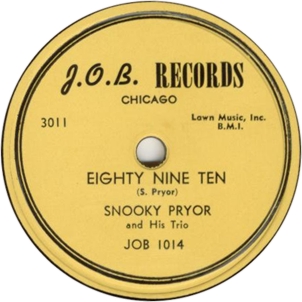
Snooky Pryor subsequently made singles as a leader for Parrot and Vee-Jay, and worked as a sideman on Sunnyland's Slim's sessions for those labels (both of which took place earlier 1954). After a period of inactivity, he would return to JOB in 1963.
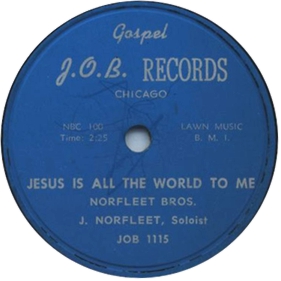
Joseph Norfleet, Junious Norfleet, Arthur Norfleet, Peter Norfleet, Nathaniel Norfleet, George Norfleet [George Taylor] (vocals); unidentified (p, g).
Chicago, c. July 1953
| NBC 100 | Jesus Is All the World to Me | JOB 1115, C. H. Brewer 100 | ||
| NBC 101 | None but the Righteous | JOB 1115, C. H. Brewer 100 |
Our session information is from Hayes and Laughton. The matrix numbers look as though they are from a radio recording or transcription. They aren't. It turns out that there was a short-lived N.B.C. label (the initials stood for Northern Brightrecord Corporation). N. B. C. and its sister label C. H. Brewer, both housed at PO Box 560, Chicago 90 Illinois, specialized in gospel. In fact N.B.C. 2003 by the Pilgrim Jubilee (Singers) carried matrix numbers N-B-C 104 and 105. Our thanks to Bo Sandell for pointing these labels out to us. To seal the deal, Robert Javors reports that he once had in his collection a copy of Norfleet Brothers single on C. H. Brewer 100—with the C. H. Brewer label pasted right over the JOB label! Obviously, then, there was some business connection between Joe Brown and the N.B.C./C. H. Brewer operation, which may have had some further dealings with Chance. Here we're getting into the shadowy recesses of independent record company operations...
If JOB 1115 was released "on schedule" it didn't appear until 1958.
The Norfleet Brothers sang in the traditional "jubilee" style that made their warm quiet sound most distinctive during the 1950s, a period known for more impassioned gospel quartet singing. The group's repertoire was filled with old spirituals and traditional hymns, such as "Shadrack," "What a Friend We Have in Jesus," and "How Great Thou Art."
The brothers, who were reared by a minister, formally organized themselves into a jubilee group in 1946, in their hometown of Newbern, Alabama. The original members were Arthur (baritone), Joseph (second tenor), Junious (first/second tenor), Peter (first tenor), and Nathaniel (first tenor). The group moved up to Chicago in 1948, and soon added bass singer George Taylor and guitarist Robert Bonner. Hayes and Laughton's book doesn't recognize that George Taylor took the "Norfleet" name to become a sixth "brother." In a 1963 item, the Norfleets said they made their first recordings in 1954, but they could have been off by a year.
Other releases by the group included singles on Divine Grace, Von-Trice, Rush, and Emase, plus one LP on the Checker label, Shadrack (1964). Of these, possibly only the Divine Grace release predates the 1960s. The Norfleets made only a handful of records, but they throve as a popular group in the churches and on local radio and television. By 1963, they were broadcasting on three weekly radio programs (including their own show) and were appearing on the newly launched "Jubilee Showcase," the legendary show produced by gospel impresario Sid Ordower. The Norfleet Brothers were Ordower's favorites and he featured them regularly on "Jubilee Showcase" for decades afterwards. Arthur, Joseph, and Junious were still carrying on the legacy of the group in the 1990s.
Our sources are "Norfleets, Stars of 'Showcase,' Rank High as Gospel Singers," Chicago Defender,, March 30, 1963; Earl Calloway, "Norfleet Bros. Are Still Actively Singing Traditional Spirituals," Chicago Defender, February 10, 1979; and David Whiteis, "Critic's Choice: Norfleet Brothers," Chicago Reader, October 12, 1990.
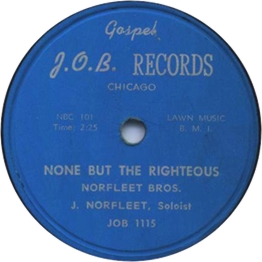
The Chance deal was still on when Joe Brown convoked two more sessions at Universal in October. But Brown couldn't rely on Chance for distribution after they were released; on October 24, Cash Box announced (p. 27) that he was taking over his own distribution again. Brown may not have gotten the money he was expecting out of the deal, but it had brought him nationwide distribution, and he would never have that again.
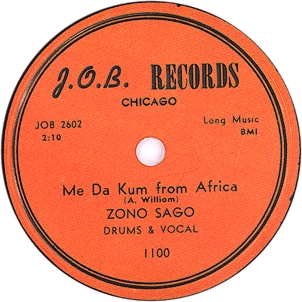
Zona Sago [Allan Williams] (d, voc); et al.
Universal Recording, Chicago, October 5, 1953
| JOB 2602 | Me Da Kum from Africa ("A. William") | JOB 1100 | |
| JOB 2603 | Mama Mia ("A. William") | JOB 1100 |
JOB 1100 has received little attention because it was a calypso release. The single has the same orange label as JOB 1101. Matrix numbers (in the wax, 2603 is incorrectly displayed on both sides of the record) immediately precede the Memphis Minnie session, which we figure was done the same day.
The artist's marquee name is spelled Zona in other sources. His real name was Allan Williams; the composer credits go to "A. Williams" on his 1956 single on Abco. Thanks to Scott Dirks for unearthing Sago's real name; the inspiration behind the artist's marquee name is still unknown.
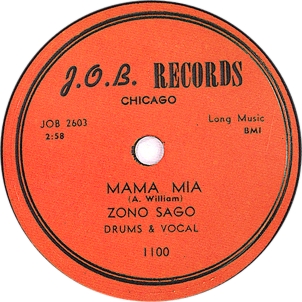

Memphis Minnie [Lizzie Douglas] (eg, voc); Ernest "Little Son Joe" Lawlars (eg, voc); Eurreal "Little Brother" Montgomery (p, voc); Zona Sago (d).
Universal Recording, Chicago, October 5, 1953
| 2606 [tk. 3] | Kissing in the Dark (Lawlars) [MM voc] | unissued | |
| 2606 [tk. 4] | Kissing in the Dark (Lawlars) [MM voc] | JOB 1101, Boogie Disease BD 101/102, Flyright [Br] FLY 585, P-Vine Special [J] PLP 9022, Flyright [Br] FLYCD 28, Paula PCD-19, Wolf WBCD 010, Westside WESD 233 [CD], P-Vine [J] PCD-24113, Fuel 302 061 939 [CD] | |
| 2607 [tk. 1] | World of Trouble (Lawlars) [MM voc] | JOB 1101, Boogie Disease BD 101/102, Flyright [Br] FLY 585, Juke Joint LP 1501, Flyright [Br] FLYCD 28, Paula PCD-19, Wolf WBCD 010, Westside WESD 233 [CD], P-Vine [J] PCD-24113 | |
| 2608 | In Love Again [MM voc] | Flyright [Br] FLY 585, Flyright [Br] FLYCD 28, Paula PCD-19, Wolf WBCD 010, P-Vine [J] PCD-24113 | |
| 2609-1 | What a Night [MM voc] | Flyright [Br] FLY 585, Flyright [Br] FLYCD 28, Paula PCD-19, Wolf WBCD 010, P-Vine [J] PCD-24113 | |
| 2610 | Keep Drinkin' [LBM voc] | Flyright [Br] LP 577, P-Vine Special [J] PLP 9022, Flyright [Br] FLYCD 31, Paula PCD-15, Westside WESD 233 [CD], P-Vine [J] PCD 24076, Fuel 302 061 939 [CD] | |
| 2611 | Boogie [LBM voc] | Flyright [Br] LP 577, Flyright [Br] FLYCD 31, Paula PCD-15, Westside WESD 233 [CD], P-Vine [J] PCD 24076 | |
| 2612 | Ethel Bea [LSJ voc] | Flyright [Br] FLY 585, Juke Joint LP 1501, Flyright [Br] FLYCD 28, Paula PCD-19, Wolf WBCD 010, Westside WESD 233 [CD], P-Vine [J] PCD-24113, Fuel 302 061 939 [CD] | |
| 2613 | A Little Too Late [LSJ voc] | Flyright [Br] FLY 585, Flyright [Br] FLYCD 28, Paula PCD-19, Wolf WBCD 010, Westside WESD 233 [CD] | |
| 2613 [alt.] | I'd Write a Letter [LSJ voc] | P-Vine Special [J] PLP 9022, Wolf WBCD 010, P-Vine [J] PCD-24113 |
Meticulously documented details of Memphis Minnie's last commercial recording session are available in Paul and Beth Garon, Woman with Guitar: Memphis Minnie's Blues (New York: Da Capo, 1992). This strongly recommended book is the source on Memphis Minnie. Previous sources list the drummer as unidentified. But it's a reasonable guess that Zono or Zona Sago (who drummed on other blues sessions) was still in the building.
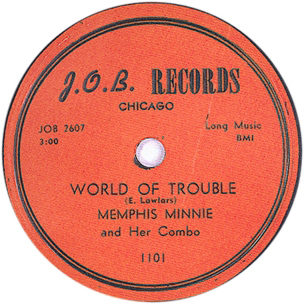
JOB 1101, which carries an orange label, was advertised in Cash Box on May 22, 1954. It appears to have been released in November 1953, however. Boogie Disease BD 101/102, Take a Little Walk with Me, was released in the United States in 1972. Flyright [Br] FLY 577, Big Joe Williams, Memphis Slim, Little Brother Montgomery: Unissued Chicago Blues of the 50's from Cobra and JOB, was released in Britain in 1981. P-Vine Special [J] PLP 9022 was part of a 4-LP boxed set, Chicago Blues: A Quarter Century, released in Japan in 1981 as PLP-9022/9025. Flyright FLY 585, Memphis Minnie & Others: World of Trouble, was released in Britain in 1982. Flyright FLYCD 28 and its American Doppelgänger Paula PCD-19 were released in 1990 and 1991 as Blues Is Killin' Me. Flyright FLYCD 31 and Paula PCD-15, Chicago Piano 1951-1958 from Cobra & JOB, were also released in 1990 and 1991. Wolf WBCD 010, Memphis Minnie Volume 3: 1949-1953, was released in 1991. Westside WESD 233 is a compilation of 54 JOB blues tracks on 2 CDs; titled Rough Treatment: The J.O.B. Records Story, it was released in Britain in 2001. P-Vine PCD 24076, Chicago Blues Piano Hitters!, was released in Japan (where the title must have sounded better) in 2001. P-Vine PCD-24113, Chicago Blues Down-Homers, Vol. 2, was also released in Japan in 2001. Fuel 302 061 939, The J.O.B. Records Blues Story is a 2-CD set issued in 2012.
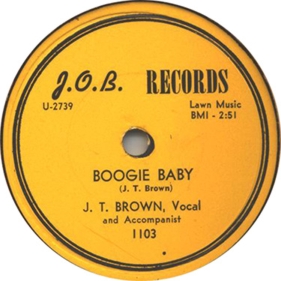
J. T. Brown (ts, voc); unidentified (eg); unidentified (d); unidentified males (vocal).
Chicago, c. February 1954
| U-2739 | Boogie Baby (Brown) [Use That Spot*] | JOB 1103, Delmark DE-714* | |
| U-2740 | One More Chance (Brown) | JOB 1103, Delmark DE-714 | |
| Cheatin' and Lyin' | Delmark DE-714 | ||
| Blues for JOB | Delmark DE-714 | ||
| My Gal Went Away | P-Vine Special [J] PLP-9022, P-Vine [J] PCD-24113 |
A clue to the date of this session appears in the Local 208 Board meeting minutes from February 18, 1954. A month earlier J. T. Brown had been fined $100 for some infraction:
J. T. Brown, erased for non-payment of fine, appeared before the Board, requesting an extension on same, but could not give a definite amount that he could pay each week. He also requested the Board to restore his contracting rights. He claimed that he had a recording date in mind and several weekend propositions for out-of-town and that he could not make the proper arrangements if he could not contract for the engagements.
Tht [sic] Board discussed the matter at length with Brown, trying to point out that his record as a contractor was not good and that to permit him to continue to contract [as a leader] would only jeopardize the interests of the Local. (Local 208 Board meeting minutes, p. 1).
The Board did not budge on this occasion. On June 17, Brown, still "erased," was permitted to go to work a Union job with Howlin' Wolf only if he coughed up $50 immediately.
It appears that the session for JOB was done (clandestinely) around the time that J. T. Brown made his appeal to Local 208. Unless, of course, Brown (already in hot water for using a musician who wasn't straight with the Union on his 1952 session for United) was fined for doing the JOB session. More research is needed here as well.
JOB 1103 was released in July 1954 (it was advertised in Cash Box on July 3, p. 60). In 1998, most of this session (which has obviously been subject to divided custody over the years—some tracks being retained by Leonard Allen and passing to Delmark, others staying with or going back to Joe Brown and being sold to Stan Lewis) was included in J. T. Brown: Windy City Boogie on Delmark DE-714, a CD that also included J.T.'s work for United and Atomic-H. The Delmark CD does not specify the JOB matrix numbers and retitles "Boogie Baby" (substituting the title that was used for the same tune when J. T. Brown recorded it for United in 1956). Although the CD is a successor to Pearl PL-9, which was issued with the same title and cover design in 1977 (and reissued in Japan on P-Vine Special PLP-378), tracks from this session were not included on either LP.
Contrary to the Delmark liner notes and to other discographies, no string bass is audible on the session; however, there appear to be more than two male voices in the background on "Boogie Baby." The more-than-two-male-voice consideration also applies to "My Gal Went Away," which has been issued on P-Vine Special PLP-9022/9025, a set titled Chicago Blues: A Quarter Century, in Japan in 1981, and again on P-Vine PCD-24113, Chicago Blues Down-Homers Vol. 2: The JOB Recordings 1950's, which came out in Japan in 2001. Fancourt and McGrath, in the 2006 version of The Blues Discography 1943-1970, claim that Eddie Clark and the Eagle-Aires were the vocal group. The Eagle-Aires recorded for Mayo Williams around this same time, but nothing on this session really points to them. The recording quality is somewhat rougher than was previously the norm at JOB—though noticeably better than the label achieved in the early 1960s.
Sessions whose tapes have been divided up are often confusing. A number titled "Soup Line" has been attributed to J. T. Brown, and to this session; in that capacity, it appeared on P-Vine Special PLP-9022/9025 and on P-Vine PCD-24113 under Brown's name. But one listen reveals that Brown is neither the lead vocalist nor the tenor saxophone soloist on it. "Soup Line" was recorded for Checker, on April 20, 1954, by Leon Tarver and the Chordones, matrix number 7637, and like its session mates, left unissued for years, finally appearing on a Rarin' LP. How it got mixed in with part of J. T. Brown's session would be a fascinating story, if it can ever be told... The actual lead vocalist is Leon Tarver, the bassist is Willie Dixon, and the tenor saxophonist is Harold Ashby.
J. T. Brown had moved some 78s while recording for United (in June 1951 and January 1952), but his relationship with Lew Simpkins' label came to an abrupt end after Brown used a non-Union alto saxophonist on his January 1952 date, falsely representing him as a member of the Pittsburgh local of the Musicians Union. For over a year, Brown was a member of Elmore James' touring band, recording with him in November 1952 (for Meteor), January 1953 (for Checker), and April and August 1953 (Flair). The November 1952 session for Meteor also produced four sides that cited the saxophonist as the leader—variously as Bep Brown, Sax Man Brown, and J. T. (Big Boy) Brown. Also in August 1953, Brown made a session for Parrot that Al Benson decided not to release. This obscure outing for JOB was his next opportunity to record as a leader.
The matrix numbers are in the same series used by Chance and other companies at Universal Recording; U2680 was recorded by Chance in December 1953.
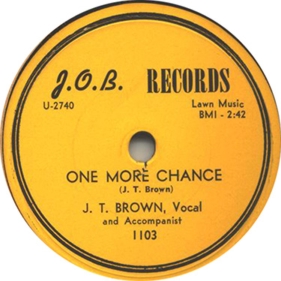
Sunnyland Slim (p, voc); unidentified (eg); unidentified (maracas); unidentified (cga); Anna Lee (voc).
Chicago, 1953 or 1954
| 1009A | Shake It Baby (Luandrew) | Ebony 1009-A, JOB 1105, Westside WESA 910 [CD], Classics 5171 [CD], Fuel 302 061 384 [CD] |
We previously thought that 1009A came from the same matrix series as the items in session JOB22, which provided the flip side to JOB 1105. However, the resemblance is adventitious; Joe Brown actually got the side from Mayo Williams, who had previously given it a very limited edition release on Ebony 1009.
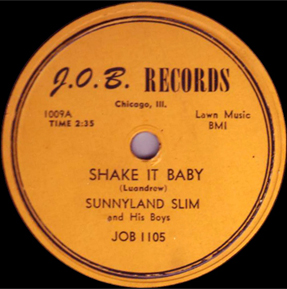
The Ebony label (which is much more verbose in general) credits one Anna Lee with singing on this number; she replies to Sunnyland's pleas. On Ebony, the band was dubbed Sunnyland Slim and HIs Boys from the Big Foot Country. Slim's piano is accompanied by maracas and congas—perhaps the work of regular band members, perhaps not—and a guitarist who is neither J. B. Lenoir nor Junior Lockwood, and is not too easy to hear. In his notes to the Fuel 2000 CD, Bill Dahl suggests that Big Crawford was on maracas, but we don't know what his source was for this. The sonics prove that the side was not made at Universal Recording. Its discmate, 1009B, featured J. T. Brown, with Miss Lee doing a talking boogie; according to the late George Paulus, the sonics on 1009B are so raw that Joe Brown probably passed it over for technical reasons.
JOB 1105 was released in July 1954 (see the rare company ad in Cash Box, July 3, 1954, p. 60). The flip had been previously issued on JOB 1011, but was misattributed there to John Brim instead of Sunnyland Slim (see JOB20 above).
On account of the JOB release, this side has been reissued on Westside WESA 910, Sunnyland Slim & Friends: Sunnyland Special: The Cobra & JOB Recordings 1949-1956, a British CD released in 2001. Classics 5171, Sunnyland Slim 1952-1955, was relased on CD in 2006; only the JOB release is noted there.
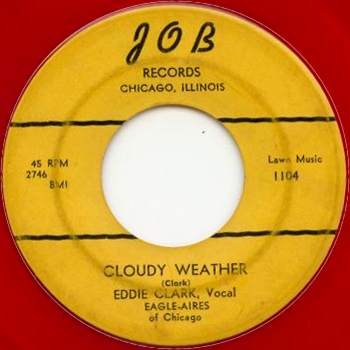
The Eagle-Aires: Robert Dunbar (voc); Eddie Clark (voc); ... Jones (voc); ... Brent (voc); Red Holloway (ts, ldr); Lewis Carpenter (p); prob. Lefty Bates (eg); Hawk Lee (b); Robert "Hendu" Henderson (d).
Chicago, c. February 1954
| 2745, HF-1014A | Number 1 Baby (Dunbar) [RD voc] | Ebony 1014-A, JOB 1104, Fuel 302 061 939 [CD] | |
| 2746, HF-1014B | Cloudy Weather (Clark) [EC voc] | Ebony 1014-B, JOB 1104 |
These two items almost immediately follow two from the J. T. Brown session in the matrix series from Universal Recording. However, neither session sounds as though it was done there, and the U-2000 series numbers are not on the Ebony release. The HF-1014 A and B derive from the initial, extremely rare release on the second incarnation of Ebony, run by J. Mayo Williams. Ebony 78s from this period conspicuously displayed the words "High Fidelity" on their labels. We first learned of the Ebony release from John Tefteller's December 2005 auction catalogue. The Ebony carries different renditions of each title and adds a credit to "Red Hollaways [sic] Buttermilk Bottom Band."

These sides represented JOB's first foray into doowop. "Number 1 Baby" features Robert Dunbar's rather thin high tenor lead. There is space on this jump for Red Holloway's tenor sax solo, easily identifiable as his work even without the clues provided by the original Ebony release. The piano accompaniment appears to be by Lewis Carpenter, Red's regular pianist during this period, so we infer that his regular bassist and drummer are also present. (The same combo accompanied three vocal group sessions on Chance; see the Appendix to our first Al Smith page for session details). A guitarist was added for the session; Lefty Bates is most likely.
"Cloudy Weather" is a slow blues with a gospel-flavored baritone lead by Eddie Clark. The guitar is much more prominent on this side, and Red Holloway does not solo. The Eagle-Aires are relaxed, sometimes to the point of slackness, and their pitch is occasionally just approximate.
J. Mayo Williams, the proprietor of Ebony, had little more experience with doowop than Joe Brown did. Although vocal group and combo are clearly recorded, the balance between them is less than ideal, particularly on "Number 1 Baby."
According to the same Tefteller catalogue, the Eagle-Aires made a second single for Ebony that was apparently not picked up by JOB. The titles on the extremely rare Ebony 1015 were "Honey-Hush" (the Joe Turner hit) and "Money Honey." The group was unaccompanied on "Honey-Hush," at least if we believe the label, and its personnel was listed as "Dunbar-Clarke-Jones-Brent." Without hearing these, we can't see whether they were made at the same session.
JOB release 1104 was advertised in Cash Box on May 22, 1954. The advert in Cash Box mentions the Eagle Aires while a Billboard item from June mentions Robert Dunbar. Cash Box reviewed the record on June 19, 1954 (p. 30). The first reissue of "Number 1 Baby" was on Fuel 302 061 939, The J.O.B. Records Blues Story, a 2-CD set issued in 2012. "Cloudy Weather" is still waiting.
We formerly included with this session two more Eddie Clark items that later saw release on JOB, but current evidence suggests they were recorded in 1958, by a different artist—see below.
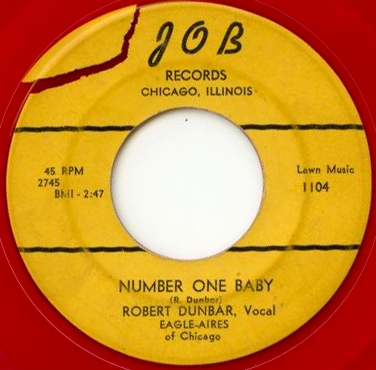
The Ebony 1000 series also included two sides by singer Freddie Hall that were dealt to Chance and released on Chance 1159. Judging from the matrix numbers that appeared on Chance (HF-1011A and B), the Halls were recorded shortly before the items from this session were. The late George Paulus verified their original release on Ebony 1011.
In January or February of 1954, Joe Brown recorded four sides by J. B. Hutto and His Hawks (matrix numbers C5118 through 5121), including "Combination Boogie" and "Pet Cream Man." This was one of the top-quality blues sessions made in Chicago during this period, but even though JOB was no longer collaborating with Chance, Brown immediately sold the sides to Art Sheridan. Sheridan put them out on Chance 1155 and 1160. Hutto would make a follow-up session for Sheridan; none of his records ever appeared on JOB.
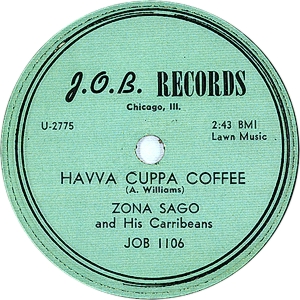
Zona Sago [Allan Williams] (d, voc); other musicians unidentified.
Universal Recording, Chicago, March or April 1954
| U-2775 | Havva Cuppa Coffee (Williams) | JOB 1106 | |
| U-2776 | Just with You (Williams) | JOB 1106 |
Joe Brown must have liked Caribbean music, even though he had trouble spelling Caribbean (and it took him three tries before he got Zona Sago's stage name right). This was Brown's second recording session with the calypso artist, but his third release (the pale green label of JOB 1106 indicates that the record came out in 1955). How the record sold is another matter—we had no inkling of this release until Tom Kelly discovered a copy on ebay.
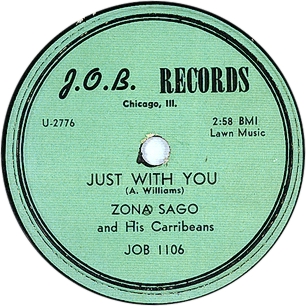
After the middle of 1954, Joe Brown's involvement in JOB became intermittent. The matrix series got quirkier and shorter, and the media coverage occasioned by his later releases drifted downward, sometimes to zero, which makes precise dating difficult.
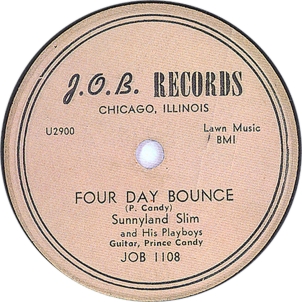
Sunnyland Slim (p); Prince Candy (eg); Ernest Cotton (ts); unidentified (b); Alfred Wallace (d).
Universal Recording, Chicago, 1954
| U2900 (label), JOB-2900 (in wax) | Four Day Bounce (Candy) | JOB 1108, P-Vine Special [J] PLP-9018, Flyright [Br] FLY 585, Flyright [Br] FLYCD 31, Paula PCD-15, Westside WESA 910 [CD], P-Vine [J] PCD 24076, Classics 5171 [CD] |
This pleasant instrumental (whose title was obviously meant to be "'Fore Day Bounce") appears to be from the same matrix series out of Universal, but separated in time from both the J. T. Brown trio session and the next Sunnyland Slim session. Could it really have had no session mates?
In any event, the obscure guitarist acquits himself with reasonable distinction. The Classics reissue has Ernest Cotton on tenor sax, which sounds right, and Alfred Wallace on drums, ditto. Classics also has Moody Jones on bass, but it is not clear that he was still playing blues in 1954—see our Planet/Marvel page. So the identity of the bass player remains a mystery.
JOB 1108 was released in June 1955. "Four Day" was first released in 1980 on P-Vine Special PLP-9018, Robert Jr. Lockwood & Chicago Gangs: The Baddest New Guitar. Only Lockwood didn't play on this side... The reissue on Flyright FLY 585 was mistitled and misattributed—it appeared as "Pulling Strings," credited to Eddie Boyd (!). Flyright FLYCD 31 and Paula PCD-15, Chicago Piano 1951-1958 from Cobra and JOB, were released in 1990 and 1991. Westside WESA 910, Sunnyland Slim & Friends: Sunnyland Special: The Cobra & JOB Recordings 1949-1956, is a British CD released in 2001. Chicago Blues Piano Hitters!, P-Vine PCD 24076, is a Japanese release from 2001. Classics 5171, Sunnyland Slim 1952-1955, is a French CD released in 2006.
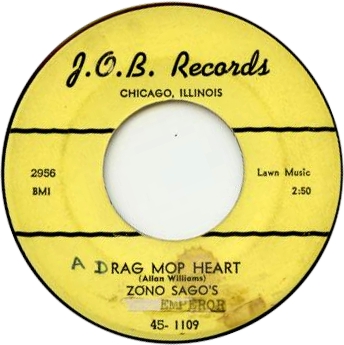
Zona Sago [Allan Williams] (d, voc); other musicians unidentified.
Universal Recording, Chicago, late 1954
| 2956 | Rag Mop Heart (Williams) | JOB 45-1109 | |
| 2957 | Mister Johnny (Williams) | JOB 45-1109 |
This was Zona Sago's last session for JOB, but judging from the yellow label, it seems to have been his second release (late 1954). The pasted-on typewritten repairs to the labels suggest a really short pressing run! As with 1100 and 1106, previous discographies have ignored this calypso release.
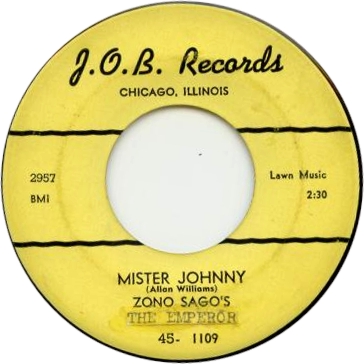
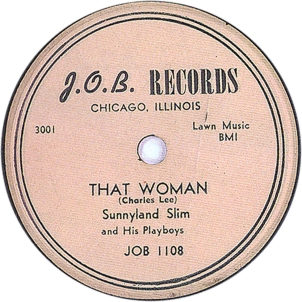
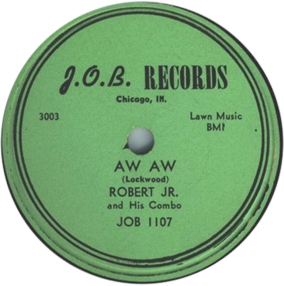
The next session would mark the end of Sunnyland Slim's contributions to JOB. Robert Jr. Lockwood also returned for a session as a leader, getting his sides released this time.
On 3001: Sunnyland Slim (p, voc); Robert Jr. Lockwood (eg); Ernest Cotton (ts); Alfred Wallace (d).
On 3003 and 3004: Robert Jr. Lockwood (eg, voc); Ernest Cotton (ts); Sunnyland Slim (p); Alfred Wallace (d).
Universal Recording, Chicago, prob. late 1954
| JOB-3001 | That Woman (Charles Lee) | JOB 1108, P-Vine Special [J] PLP-9018, Flyright [Br] FLYCD 31, Paula PCD-15, Westside WESA 910 [CD], P-Vine [J] PCD-24051, Classics 5171 [CD], Fuel 302 061 939 [CD] | |
| 3003 | Aw Aw (Lockwood)* | JOB 1107, Fury 500, Flyright [Br] FLY 563, P-Vine Special [J] PLP-9018, Flyright FLYCD 10, Paula PCD-14, Westside WESA 910 [CD], Westside WESD 233 [CD], P-Vine [J] PCD-24051, Fuel 302 061 939 [CD] | |
| 3004 | Sweet Woman from Maine (Lockwood)* | JOB 1107, Fury 500, Flyright [Br] FLY 563, P-Vine Special [J] PLP-9018, Flyright FLYCD 10, Paula PCD-14, Westside WESA 910 [CD], Westside WESD 233 [CD], P-Vine [J] PCD-24051 |
These items carry matrix numbers in the same series out of Universal Recording. JOB 1107 came out in early 1955, and 1108 was probably released in May 1955. 1107 and 1108 got conjoint reviews in Cash Box on June 11, 1955 (p. 32). On all later releases, "Aw Aw" becomes "Aw Aw Baby." The number is actually "Sweet Home Chicago," in case anyone is monitoring.
We previously put two sides by Snooky Pryor in this session, but we now have confirmation that JOB 1014 was released in August 1953 (so see JOB25 above).
Late 1954 would be the most likely time frame. Fancourt and McGrath's new edition of Blues Records 1943-1970 puts the Lockwood sides around May 1955, but that is a not entirely reliable inference from the release date for JOB 1108, which wasn't in June anyway.
Flyright [Br] FLY 563 was released in Britain in 1980 under the title Johnny Shines & Robert Lockwood: Dust My Broom. P-Vine Special PLP-9018, the first album to assemble this entire session, appeared in Japan in 1980, under the title Robert Jr. Lockwood & Chicago Gangs: The Baddest New Guitar. Flyright FLYCD 31 and Paula PCD-15 were released in 1990 and 1991 under the title Chicago Piano 1951-1958 from Cobra and JOB. Westside WESA 910, Sunnyland Slim & Friends: Sunnyland Special: The Cobra & JOB Recordings 1949-1956, is also a British CD released in 2001. Westside WESD 233 is a compilation of 54 JOB blues tracks on 2 CDs; titled Rough Treatment: The J.O.B. Records Story, it was released in Britain in 2001. Robert Jr. Lockwood & Johnny Shines: Sweet Home Chicago, was released on P-Vine PCD-24051 in Japan in 2001.Sunnyland Slim 1952-1955, on Classics 5171, is a CD released in 2006. Fuel 302 061 939, The J.O.B. Records Blues Story is a 2-CD set issued in 2012.
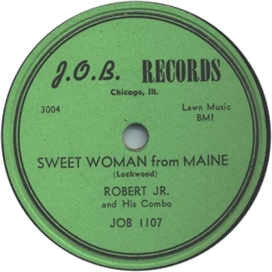
Alex Atkins has frequently been listed on alto sax on the Lockwood items. But the only saxophone that can be heard is a tenor. Which, in turn, sounds like Sunnyland's (and Memphis Slim's) horn-playing compatriot, Ernest Cotton. The Classics reissue notes put Cotton on 3001, where he appears to be, along with Wallace on drums, but they also put Moody Jones on the session when no bass is audible at all.
Fury had nothing to do with the Bobby Robinson operation out of New York City; it was a subsidiary of JOB that managed just one release in 1955.
Apart from the single issue on Fury, Brown seems to have been rather inactive with JOB that year, managing just two releases. Starting in February 1956 Brown was preoccupied with Abco, a new label that he started in partnership with Eli Toscano. However, the Abco series was short and Brown's involvement lasted around 6 months. By August 1956 Brown had bowed out and Toscano was going it alone with his Cobra operation, which scored a hit in September 1956, grew to include the Artistic subsidiary in 1958, and closed in 1959. Meanwhile, at some point in 1956 Brown obtained two sides by The Gales from the Detroit-based J-V-B label. New JOB sessions commenced toward the end of 1956.
The Gales: unidentified vocalists with unidentified accompaniment
Detroit, c. 1956
| JVB-35A | Darling Patricia | JOB 3001 | |
| JVB-35B | All Is Well, All Is Well | JOB 3001 |
JOB 3001 was definitely obtained from Joe Von Battle's operation in Detroit, which was run out of the label owner's record store. There were releases on J-V-B 35 and J-V-B 3000. (The Gales were responsible for a second single, on J-V-B 34, that was apparently not picked up by JOB.) Supposedly the JOB label was pasted right over the J-V-B; a copy in Bill Sabis's collection confirms this.
JOB 3001 was released in 1956. The same year saw a recording of "Darling Patricia" by Artie Wilkins on States (see our Al Smith listing). The Artie Wilkins outing (on which "Darling Patricia" is credited to Joe Brown) marks the first known collaboration between Joe Brown and Leonard Allen.
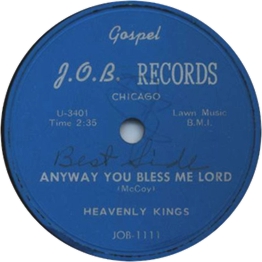
Universal Recording, Chicago, c. December 1956
| U-3401 | Anyway You Bless Me Lord (McCoy) | JOB 1111 | |
| U-3402 | Lord Free My Soul (Douglas) | JOB 1111 |
These two gospel numbers are in a familiar matrix series. These items follow the U3300s assigned to the first session for Ping in October 1956 and the second session for Cobra (which probably took place later that sa,e month). Yet again, JOB duplicated a release number (there would eventually also be a JOB 1111 by Otis Spann). This JOB 1111 was reviewed in Cash Box on March 9, 1957 (p. 43).
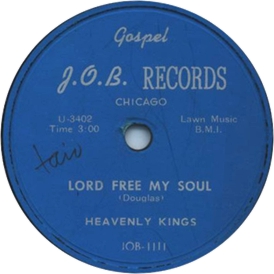
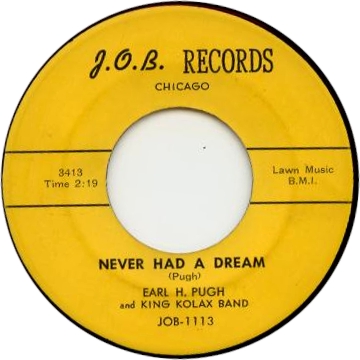
Earl H. Pugh (voc) and King Kolax Band: King Kolax (tp, ldr); Harold Ousley (ts); Prentice McCary (p); Malachi Favors (b); Leon Hooper (d).
Univeral Recording, Chicago, c. December 1956
| 3413 | Never Had a Dream (Pugh) | JOB 1113 | |
| 3414 | Jealous of My Shadow (Pugh) | JOB 1113 |
The trade papers announced back in 1954 that Joe Brown had signed Earl Pugh as his "first spiritual artist." But there are no JOB gospel releases that we know to feature Earl Pugh. Our information on this session is from the Mohr-Flückiger-Demeusy files, which give 1956 as the date but do not identify the bass player and drummer. Leadbitter, Fancourt, and Pelletier specify Cowboy Martin on bass, but Malachi Favors is more likely, given the date. The single was released during the week of March 30, 1957.
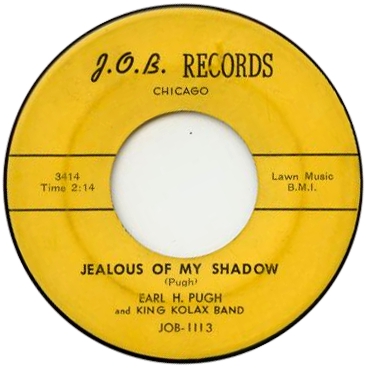
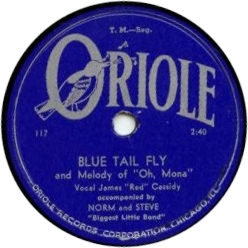
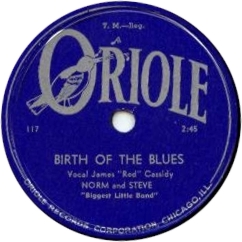
The flurry of activity after the demise of Abco, at the end of 1956 and the beginning of 1957, was followed by another flurry in 1958-1959. During this period, Joe Brown started a new label called Ruler (though he seems to have stayed with the label for just its first two releases) and revived the Oriole label, which had been founded in June 1950 by Vincent "Bud" Brandom and gone inactive after a little more than a year.
There was even talk of bringing Leonard Allen, whose United and States operation had gone under at the end of 1957, back into the record business as Brown's partner. Six or seven months after United and States went out of business, Billboard made this semi-announcement:
United records, helmed by Leonard Allen, will probably merge with J.O.B. records, owned by Joe Brown, soon. Allen will handle the business side primarily, while Joe Brown will direct A&R chores. J.O.B. label will be the moniker used. Allen has turned over the contract of altoist Tab Smith, former Count Basie sideman, to the Chess brothers, who are readying a release … ("On the Beat," Billboard, July 28, 1958, p. 46)
Tab Smith's contract had indeed been dealt to Chess. Billboard reviewed his first single for the Chess brothers, Argo 5304, in the very same issue (July 28, 1958, p. 42; Cash Box caught up with it on August 9, p. 12). Smith also got a second single on Argo, a single on Checker, and an LP on Checker, probably all the products of a one-year deal. Meanwhile, not a whole lot came of the plans to bring United and JOB together, except for some JOB master tapes ending up in Allen's possession.
There were two visible products of the alliance... First, JOB made a completely unexpected move, releasing an LP by Nelda Dupuy. Dupuy had been working the Chicago nightclubs for a decade, as a singer-pianist. Her only previous recording had been a limited-edition single for United, done in 1953. Now she made a limited-edition LP for JOB. The connection? She was a protégée of Leonard Allen's (often said to have been his girlfriend, but she denied this).
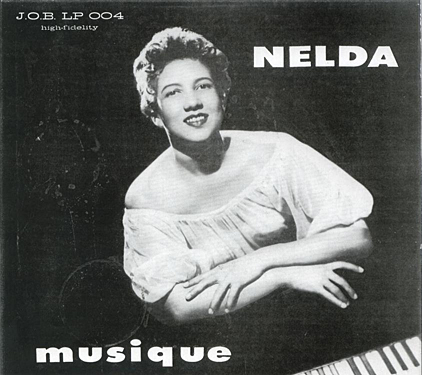
Nelda Dupuy (voc, p).
Chicago, 1958
| House of Blue Lights | JOB 004 | ||
| The Life of the Party | JOB 004 | ||
| Baby Baby Please Come Back to Me (Dupuy) | JOB 004 | ||
| Do You Know What It Means to Miss New Orleans | JOB 004 | ||
| Frankie And Johnnie (trad.) | JOB 004 | ||
| I May Be Wrong, But I Think You Are Wonderful | JOB 004 | ||
| Took Advantage of Me | JOB 004 | ||
| You'll Learn (Dupuy) | JOB 004 | ||
| The Key to Your Heart (Dupuy) | JOB 004 | ||
| Don't Say Goodbye | JOB 004 | ||
| What Do You Know about Love | JOB 004 |
The selections are listed in the order that they appear on the LP. Side A begins with "House of Blue Lights" and Side B picks up at what we presume is "You Took Advantage of Me."
JOB 004 is a 12-inch LP, recorded and released in 1958. Most likely the release quickly followed the semi-announcement at the end of July. A yellow JOB label was used. The lettering and layout are strongly reminiscent of LPs on the Chess and Argo labels. Since JOB had no facilities for producing LPs (despite the number, 004 remains unique in the label's output), it makes sense that the pressings and LP covers were done by Chess. When Seymour Schwartz, the proprietor of another singles-oriented label, wanted to put out an LP of his "Heartbeat Trumpet" recordings, he made a deal with Chess to release it on Argo.
A clear sign of Leonard Allen's involvement, beyond the reference in the liners to Nelda Dupuy's United single, was the use of Pamleee, his old publishing company, for the three compositions credited to the artist.
The second known collaboration between Joe Brown and Leonard Allen was the Sax Kari session for JOB (see below).
In 1958, Brown was unexpectedly rejoined by Eddie Boyd, whose Chess releases were no longer doing so well in the marketplace. The Chess brothers dropped Boyd after sessions in March and May of 1957, and he was subsequently laid up for several months because of injuries he had suffered in an automoblle accident. Two new sessions for JOB marked his return to musical activity.
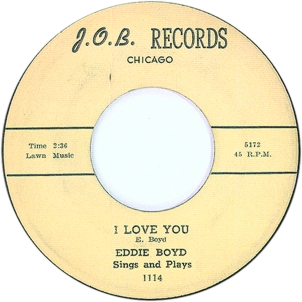
Eddie Boyd (p, voc); poss. Eddie King (eg); poss. Willie Jones (b); poss. Chick Evans (d); unidentified vocal group.
poss. Universal Recording, Chicago, c. May 1958
| U-5172 | I Love You (Boyd) | JOB 1114 | |
| U-5173 | Save Her Doctor (Boyd) | JOB 1114 |
The place of matrix numbers 5172 and 5173 in the series out of Universal is unclear. We do know, however, that JOB 1114 was released during the week of June 2, 1958.
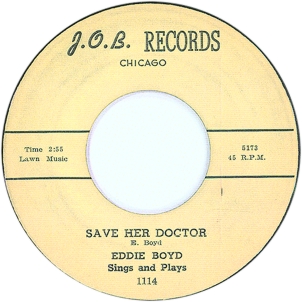
When Joe Brown revived Oriole records, Bud Brandom, its former owner, was involved in some capacity. The imprint of Frederick Music, which Brandom owned, shows up on several Oriole labels, as well as on Ruler 5001 and JOB 1118.
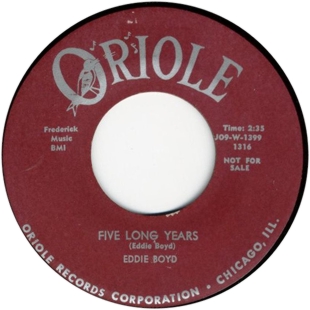
Eddie Boyd (p, voc); Willie Cobbs (hca -1); Eddie King (eg); Willie Jones (b); Chick Evans (d)
Chicago, c. December 1958
| JO9W-1399-1 | Five Long Years (Boyd) -1 | Oriole 1317 (1316 on label), Blues Classics 8 | |
| JO9W-1400 | 24 Hours of Fear (Boyd) | Oriole 1316 (1317 on label) |
Eddie Boyd's Oriole release came out in January 1959; it was reviewed in Cash Box on January 24 (p. 46). Dave Sax has concluded that these two sides came from a different session from the one that produced JOB 1114.
Copies of Oriole 1316/1317 (different numbers on the A and B sides) are in the collections of Helge Thygesen and Big Joe Louis. The JO9W numbers are from RCA Victor, which pressed some copies of the Oriole single; they indicate a 1958 pressing date. Big Joe Louis notes that 1400 has been crossed out and replaced with 1399 in the wax on "Five Long Years" and the reverse operation has been done in the wax on "24 Hours of Fear." Other copies of Oriole 1316/1317 were pressed elsewhere and do not carry the JO9Ws.
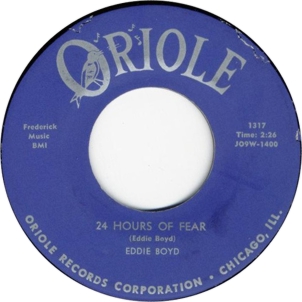
The December 1958 session would be Eddie Boyd's final effort for Joe Brown. Boyd recorded a session in November 1959 and sold it to Chess (throwing in a copy of the master to "Five Long Years" for good measure), but the company chose not to release the sides. He made another one in 1960 that was not picked for commercial release by anyone till years later. Eddie Boyd continued to perform intermittently as his music was going out of fashion, and to make 45s for small labels—Bea and Baby (1959), Key Hole (1960), La Salle (1960 and 1961), Mojo (1961), and Art-Tone (1962). In 1965, an invitation to join the American Folk Blues Festival revived his career. Thereafter, Eddie Boyd spent most of his time in Europe, eventually settling in Helsinki, Finland. He died in Helsinki on July 13, 1994.
Around the same time as the Eddie Boyd Oriole session, harmonica player Wille Cobbs cut a single of his own for another Joe Brown venture, the Ruler label.
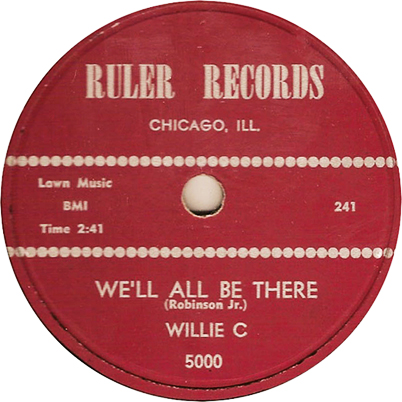
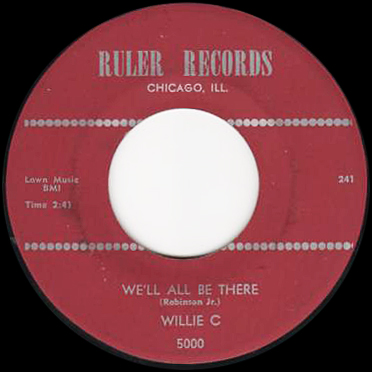
Willie Cobbs (hca -1, voc); Eddie Boyd (p); Robert Jr. Lockwood (eg); Clark ... (eb); Fred Below (d); overdubbed guitar (probably by Sammy Lawhorn) added in 1971*.
Chicago, 1958
| 241 | We'll All Be There (Robinson Jr.) -1 | Ruler 5000 | |
| 242 | Slow Down Baby [Slow Down*] (Brown-Cobbs) | Ruler 5000, Ruler 900* |
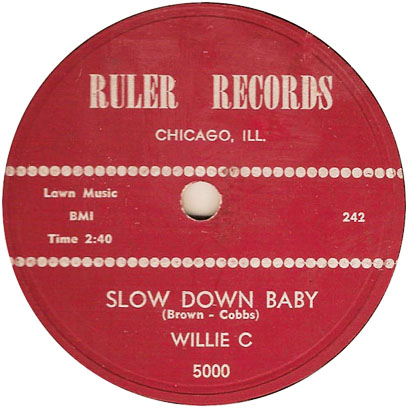
In 1958, Joe Brown recorded a session in Chicago led by harmonica player and singer Willie Cobbs. According to Mike Brown, "Slow Down Baby" was originally credited to Willie Cobbs and Eddie Clark; it was copyrighted on September 25, 1958. Cobbs has stated, "I did my first recording in Chicago for Joe Brown. But I didn't have my band. Joe had Eddie Boyd [piano], Robert Jr. [Lockwood, electric guitar], a guy named Clark something [presumably on electric bass] and [Fred] Below on drums. That was the first record I cut. One side was Slow Down Baby and the other was We'll All Be There. It was a spiritual" (Brett Bonner, "Willie Cobbs: I Want to Do Some Music We Can Shake Our Ass to," Living Blues, 31(5), Sept.-Oct. 2000, p. 19). Two tunes from this session (JB-241, "We'll All Be There" and S-242, "Slow Down Baby") were issued the same year on Ruler 5000. The Ruler label was a partnership between Joe Brown and Willie Cobbs, maintained through the early 1970s. The first two Rulers closely resemble the JOBs of the period in label design, and the second Ruler (5001) duplicates JOB 1117.
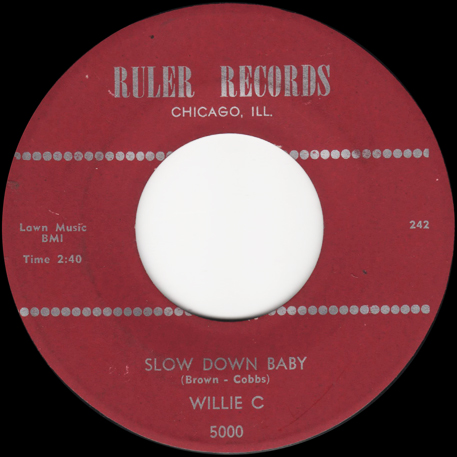
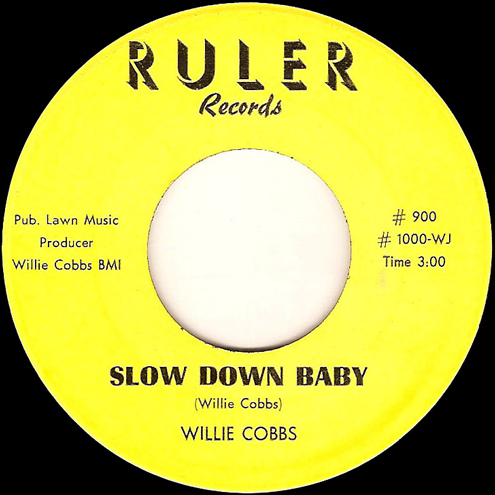
"Slow Down Baby" was later reissued on Ruler 900 with a different flip side. Ruler 900 came out in 1971 (with "You Don't Love Me," Cobbs' biggest hit, as the coupling); it was reviewed by Jim O'Neal in Living Blues (Autumn 1971) as a Joe Brown product. According to Mike Brown, an electric guitar line with wah-wah was overdubbed on the master to "Slow Down Baby" in 1971.
Willie Cobbs (voc); Sammy Lawhorn (eg); Robert Jr. Lockwood (eb); unidentified (d).
Sheldon Studio, Chicago, 1958?
| S-2981 | Slow Down (Brown-Cobbs) | Ruler 1131, Rice Belt 1131 |
Fancourt and McGrath say this is a different performance from the previous "Slow Down Baby," giving the above personnel, and 1958 as the date. Rice Belt 1131 is a later issue on a label connected with Willie Cobbs but not Joe Brown.
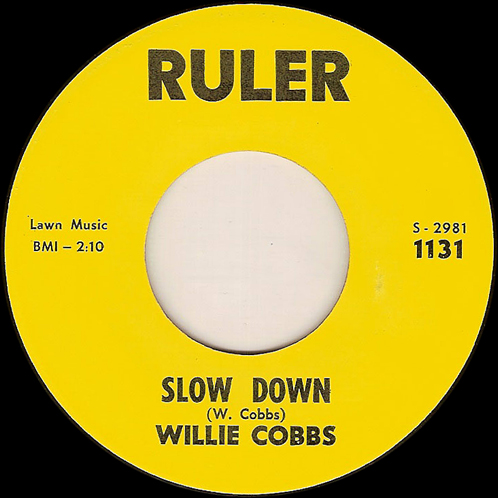
Ruler 900, Ruler 902/903, and Ruler 1131 carry credits to Lawn Music, which was Joe Brown's publishing company, on 5 sides, and the 6th credit (for "You Don't Love Me") is split between Katrina Music and Frederick Music. The former was operated by Sam Phillips' lawyer in Memphis; the latter was Bud Brandom's company.
vocal group: personnel unidentified
Chicago, prob. 1958
| 201-AX | To Look at a Star (W. Branch) | JOB 1116 | |
| 201-BX | Working and Gambling (C. Pious) | JOB 1116 |
The composer credits come from BMI. The 45-rpm single was released in 1958, according to Ferdie Gonzales, who is also our source for the matrix numbers and the correct spelling of the name. Other sources give it as "Arabians." Gonzales describes the Airibians as a Black vocal group. Joe Brown was just marginally interested in doowop. He had previously picked up an Eagle-Aires single from Ebony in 1954, and a single by the Gales from J-V-B in 1956. The Airibians may be the first doowop group that he recorded himself.
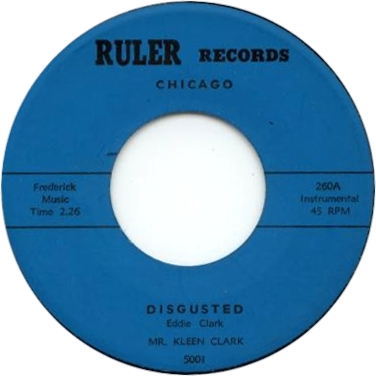
Eddie "Mr. Kleen" Clark (Wurlitzer ep); unidentified (eg); unidenified (b); unidentified (d).
Chicago, 1958
| 260A | Disgusted (Clark) | Ruler 5001, JOB 1117 | |
| 260B | Speaking of You (Clark) | Ruler 5001, JOB 1117 |
These two items were apparently released on JOB 1117 and Ruler 5001 (it would of course be nice to see a copy of JOB 1117 so we could verify the duplication).
A dub provided by Dr. Robert Stallworth shows that this is not a vocal record, as previously reported. One wonders, in fact, whether this Eddie Clark had anything to do with the Eddie Clark who sang the lead on "Cloudy Weather" with the Eagle-Aires.
Both sides of this single are instrumentals, decently recorded in a studio. The lead instrument is a Wurlitzer electric piano, accompanied by electric guitar, string bass, and drums. The guitarist gets a solo on "Disgusted." The pianist's left hand work is interesting, but the right hand runs on "Disgusted" are corny and tinny. On "Speaking of You," which could fool the listener into supposing that it was written in the 1920s, the ensemble resembles one of those c. 1900 saloon player pianos with the simulated mandolin and mechanical drum attachments (sorry, no miniature calliope).
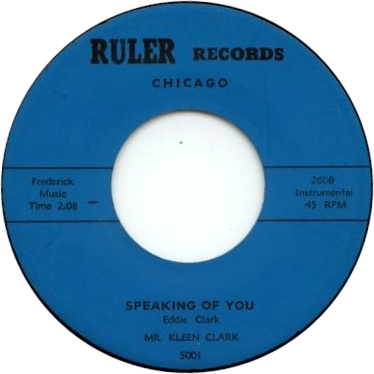
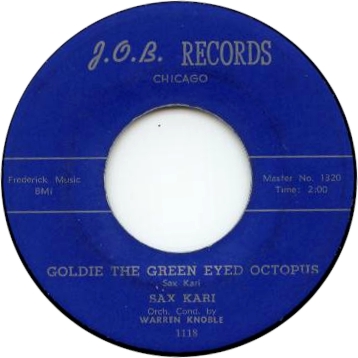
Isaac Saxton "Sax" Kari (ts); unidentified (tb, bars, p, eg, b, d); unidentified (chorus -1); unidentified (sound effects -1).
Chicago, 1959
| 1320 | Goldie the Green Eyed Octopus (Kari) -1 | JOB 1118 | |
| 1321 | Chocolate Fizz (Kari) | JOB 1118, Flame LP 003 | |
| ? | unidentified title | unissued | |
| ? | unidentified title | unissued |
JOB 1118 was released in 1959. The matrix numbers are obviously continuous with those on Oriole 1318, 1319, and 1320. Could this one also have had an Oriole release?
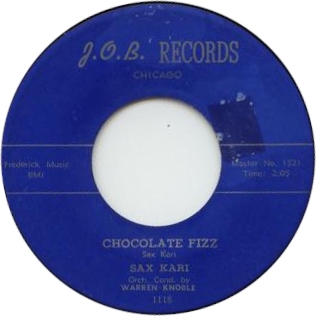
Kari told Dan Kochakian about meeting Joe Brown and making the record:
All I remember is meeting this guy and ending up in his studio and they asked me if I had any material. There was a white fellow with him who was supposed to be backing him. This man was part of the family. He was very nice, well-dressed. He wasn't a big fellow. Neither was Joe. I went into my briefcase and came up with "Goldie the Green Eyed Octopus" and "Chocolate Fizz." I just created right there in the studio. "Goldie" is probably the hardest record of mine to find. That record took off like I don't what! "Goldie" got a lot of play because of "The Purple People Eater." That's what got me to write that.
The white fellow, we presume, was Bud Brandom.
Kari also explained that producing the record was an involved process, requiring multiple overdubs, and that he did four songs altogether, but does not recall what they were. He later redid "Chocolate Fizz" at Universal Recording with extra sound effects.
Although Kari did not mention him in the interview, Mike Brown says that Leonard Allen was involved in this session in some capacity. It was probably the last project that he and Joe Brown did together.
Sax Kari (who, despite his moniker, also played guitar) was born Isaac Saxton Kari Toombs February 6, 1920, in Chicago. He was raised in New Orleans, and went to high school in Gary, Indiana. He formed his first combo while in his late teens to play in clubs in Calumet City, Illinois, and during the 1940s toured the South. At one point he inherited the musicians from the famed Carolina Cotton Pickers, and recorded them in New York on Apollo. He also played in a variety of big bands, notably that of Coleman Hawkins, with Tiny Bradshaw, and with the house band at the Rhumboogie in Chicago (probably when Floyd Campbell led it). In the late 1940s he became one of the Hi De Ho Boys at the Club DeLisa.
During the 1950s he was based mainly in Detroit. He recorded for States (two sessions in 1953, both done in Detroit), Great Lakes (1953, also Detroit), and Chess (1953-54). States 115, from his first session for the label was "Daughter (That's Your Red Wagon)," with vocals by Gloria Irving; it became a national R&B hit.
We have not heard the single. Our information about the instrumental lineup stems from Leadbitter and Slaven and from Kurt Mohr's Sax Kari discography (http://www.dtrance.ch/jazzdoc/karisayd.htm). There is a reissue of "Chocolate Fizz" on an obscure British LP from 1987, Desperate Rock 'n' Roll Volume 3 on Flame LP 003. Biographical details come from Dan Kochakian's exhaustively detailed story on Kari, The Sax Kari Story Part One: "I Should Have Been Born In New Orleans," which appeared in Blues & Rhythm 161 (August 2001).
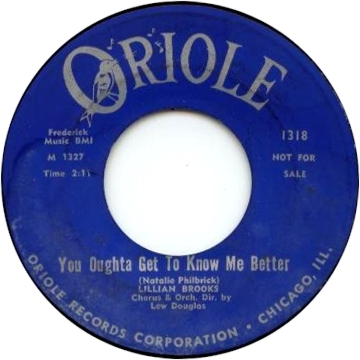
Lillian Brooks (voc); unidentified musicians and chorus; Lew Douglas (dir).
poss. Boulevard Studios, Chicago, 1958
| M 1327 | You Ought to Get to Know Me Better (N. Philbrick) | Oriole 1318 | |
| M 1328 | Do Poté (After You) (Douglas-Fox-Laney) | Oriole 1318 |
Lillian Brooks was a glamorous white pop singer who recorded for several labels in the late 1950s. By far her biggest selling release—not to mention the one that got the most coverage in the trades—was a rendition of "Peyton Place," a song inspired by the movie but not actually included in it. It was released on MGM in January 1958. The "Peyton Place" session was cut at Boulevard Studios in Chicago, with a studio orchestra under the direction of Lew Douglas, and the titles on both sides were published by Brandom Music. Brooks had records out on at least two other labels, King and Dot, during this period. We don't think she was under contract to those companies; instead, her material was recorded by an independent producer in Chicago and sold to them. Her single on Dot 15864, which was released in December 1958, was typical: one tune was published by Brandom Music, while the flip was published by Frederick Music.
These two sides probably landed on the second-edition Oriole label after Bud Brandom failed to place them at better-known imprints with national distribution. This 45 was issued on Oriole in March 1959 (reviewed in Cash Box on March 21, p. 20). It even got a plug out of George and Ernie Leaner at United Distributors (Cash Box, March 28, 1959, p. 40). The A side song was composed by one Natalie Philbrick. The B side title, which respelled Italian the same way many small labels were respelling Cajun French, should have read "Dopo Te." Publishers were Frederick for "You Ought to" and Brandom for "Do Pote."
Four more sides with matrix numbers near these were issued on Bud Brandom's B&F label during the same year. B&F 1321 coupled "Love Me, Love Me" with "Have You Heard" and B&F 1324 (reviewed in Cash Box on August 8, 1959, p. 22) consisted of "Almost Always" [matrix 1340] b/w "Goodnight Dearest Love" [matrix 1339]. There would be many further releases by Lillian Brooks, as well as releases by the Lew Douglas Orchestra, later on the B&F label. After that, there would be at least one further Lillian Brooks, on another Brandom-related label called Newport.
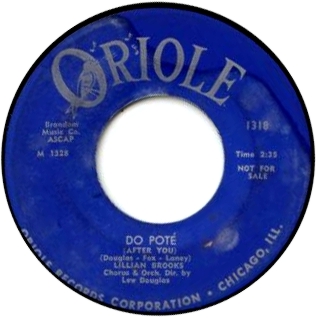
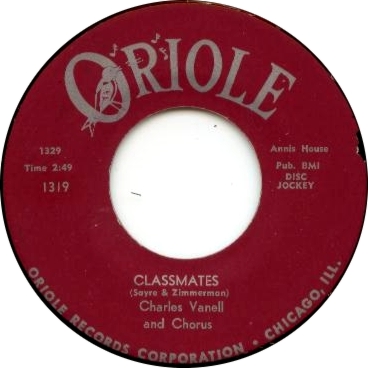
Charles Vannell (voc); musicans and chorus unidentified.
Chicago, 1958 or 1959
| 1329 | Classmates (Sayre-Zimmerman) | Oriole 1319 | |
| 1330 | Knowing the Part (Zimmerman) | Oriole 1319 |
Oriole 1319 was reviewed in Cash Box on April 18, 1959 (p. 23). In the past "Knowing the Part" has been misrendered in some discographies as "Knowing the Past."
Publisher credits on both sides went to Annis House, a Detroit-based music publisher that in 1958 and 1959 had an office in Chicago. Annis House was previously the publisher on two singles that United put out in its final year (United 210 by John Hampton and United 214 by Loretta Thompson). These were recorded in Ohio, and several other Annis House placements were with small companies in or near Cincinnati.
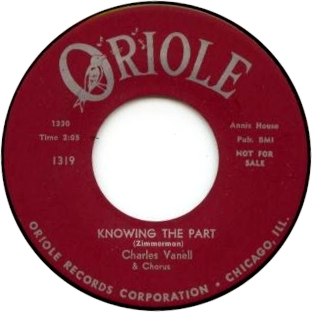
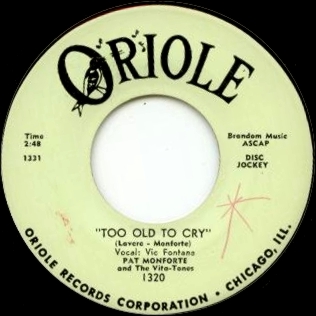
Pat Monforte (ldr); Vic Fontana (voc); The Vita-Tones: vocalists and musicians unidentified.
Chicago, 1959
| 1331 | Too Old to Cry (Lavere-Monforte) [VF voc] | Oriole 1320 | |
| 1332 | Goodnight Irene (Leadbetter-Lomax) | Oriole 1320 |
This is the last release that we know of in the latter-day Oriole series. "Too Old to Cry" was published by Brandom. And Oriole 1320 was issued in April 1959; Cash Box reviewed it on May 2 (p. 20).
There was a Pat "The Cat" Monforte who played tenor sax and recorded for Brunswick in 1958. The same cat?
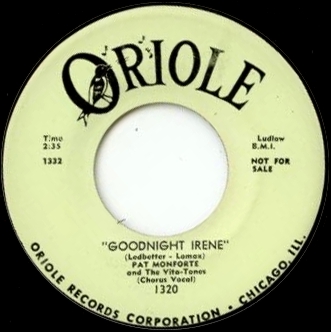
Although Joe Brown and Bud Brandom would continue their collaboration on other ventures, the new Oriole ended with 1320. Brandom then bought out Joe Brown's piece of Oriole and renamed the successor entity B & F (Brandom and Frederick). B & F was in business from 1959 to 1962; it picked up its release number series right where Oriole had left off, at 1321.
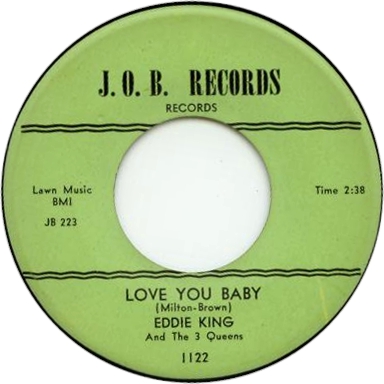
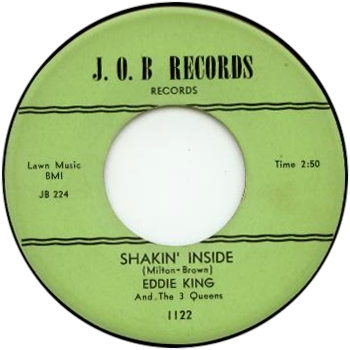
Eddie King (voc, eg); unidentified (ts, p, b, d, female vocal group).
unidentified studio, Chicago, 1960
| JB 223 | Love You Baby (Milton-Brown) | JOB 1122 (1st and 2nd versions) | |
| JB 224 | Shaking Inside (Milton-Brown) | JOB 1122 (1st version), Fuel 302 061 939 [CD] | |
| S-2982 | Lonely Man (King)^ | JOB 1122 (2nd version) |
JOB 1122 (first variant, with the green label) was released during the week of July 9, 1960, according to Cash Box. The second variant, on the light blue label, came out later. Judging from the S-series matrix number for "Lonely Man," the year of release was probably 1971. Fuel 302 061 939, The J.O.B. Records Blues Story is a 2-CD set issued in 2012; it is the first JOB reissue package to include anything from this session.
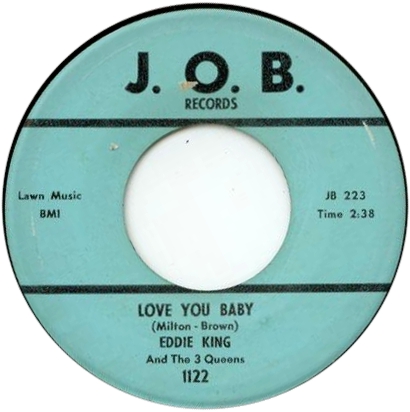
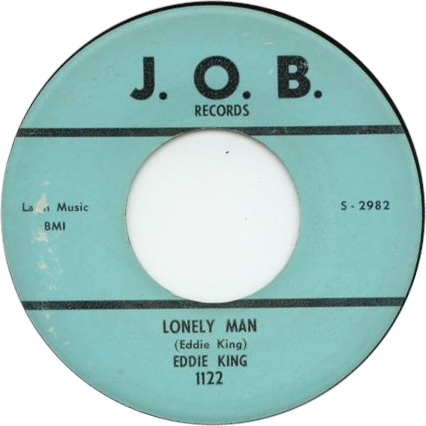
These JOB sides were the first recordings to feature West Side blues guitarist/singer Eddie King. Unfortunately, JOB 1122 made an inauspicious debut, being neither a good record nor a reflection of King's excellent blues credentials. "Shakin' Inside" is a raucous song that relies on Little Richard's "Lucille" riff, but King's guitar is nearly inaudible, smothered by an overbearing girl chorus. The guitar is more easily heard in "Love You Baby," but the chorus is still overbearing. "Lonely Man" (which was substituted on the second pressing of JOB 1122) features a more appealing tenor sax accompaniment that works better than the chorus.
Eddie King was born Edward Lewis Davis Milton on April 21, 1938, in Talladega, Alabama, to a mother who was an evangelist and father who was a minister. Music was always a part of his life. Among his eight sisters and five brothers he was a part of a gospel ensemble called Pilgrim Travelers Junior. In 1954, King moved to the West Side of Chicago, where he thrived in its flourishing blues community. King first recorded for JOB in 1958, backing Eddie Boyd. His next recording opportunity was with a band he formed with harpist Little Mac Simmons and pianist Detroit Junior; his guitar provided crucial support on each of those artists' Bea & Baby sides during 1959-1960.
Mike Brown says that Eddie King was a short man who somewhat resembled Little Milton Campbell. Eddie King told Mike Brown that Mike Brown (at a very young age) supplied the title to "Shaking Inside."
After his JOB sides, King continued to work in Chicago's club scene. He briefly got on wax again in 1967, when he made a record with his sister, Mae Bee May, for Leo Austell's Conduc label. Then in 1986 he recorded his first LP (with his sister again) for producer Steve Wisner for the Dutch Double Trouble label. Since the early 1970s, King has played off and on in the Koko Taylor band.
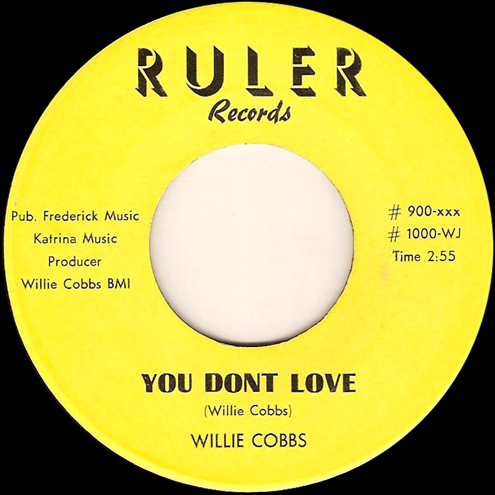
Willie Cobbs (hca, voc); Rico Collins (ts); Eddie Clark (p); Sammy Lawhorn (eg); unidentified (b); Wilbert Harris (d).
Memphis, 1960
| M 18 | You Dont Love [sic] (Cobbs) | Mojo 2168, HOB 231, Vee-Jay 411, Bootheel 182, Ruler 900 |
"You Don't Love Me" has been Willie Cobbs' biggest hit. Many other artists have recorded it in recent years. There are still some unresolved questions about its origins. According to Mike Brown, the song was copyrighted in 1962, and published with Frederick Music (Bud Brandom's firm) and Katrina Music (run by Sam Phillips' lawyer in Memphis). However, the song was recopyrighted on more than one occasion in unpublished versions.
According to Fancourt and McGrath, the original release was on Mojo 2168, with matrix number M 18 on this side. The flip was "You're So Hard to Please" with matrix number M 19. Both sides were reissued on HOB 231 and Vee-Jay 411 (new matrix numbers for the Vee-Jay [where the artist was called "Willie Cobb"] were 61-2162 for "You Don't Love Me" and 61-2161 for "You're So Hard to Please").
Ruler 900 was released in 1971. Each side also carries the inscription 1000-WJ, but this is not a matrix number. Occasionally, the single is referred to as Ruler 1000 because of the confusing numbering.
Personnel as per Fancourt and McGrath, except that they list Eddie Boyd on piano; Mike Brown says it was Eddie Clark.
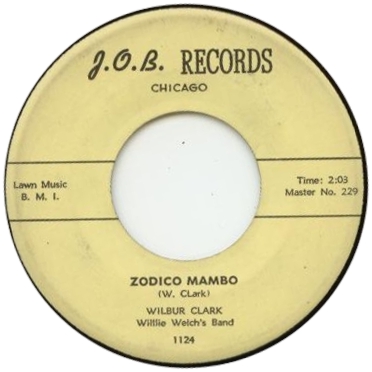
Wilbur Clark (voc); Willie Welch (ts); unidentified (org, eg, b, d, voc group).
Chicago, 1962 or 1963
| 229 | Zodico Mambo (Clark) | JOB 1124 | |
| 230 | I'll Give My Whole Life (Clark) | JOB 1124 |
The release date on JOB 1124 appears to be 1963. The recording date is assumed to be similar—but 229 isn't many places later than JB-224.
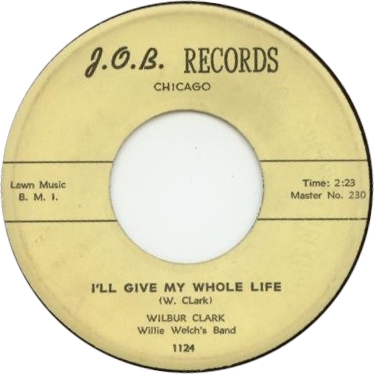
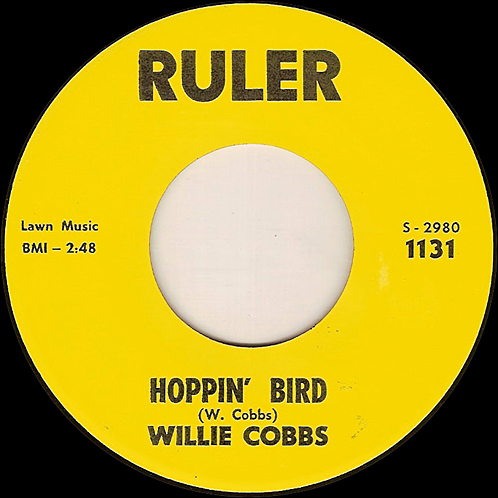
Willie Cobbs (voc); Willie Mitchell (tp); Bowlegs Miller (tp); Bill Harvey (ts); unidentified (other saxes); unidentified (org); Prince Conley (eg); unidentified (b); unidentified (d).
Memphis, 1962
| S-2980 | Hoppin' Bird [Don't Say Goodbye*] (Cobbs) | C&F 3000/30001*, Ascot 2113*, Ruler 1131, Rice Belt 1131 |
"Hoppin' Bird" came from a session, according to Fancourt and McGrath, that also produced a Willie Cobbs version of "Five Long Years." "Five Long Years" appeared on the B (3001) sides of the C&F, and on Ascot 2113. Personnel as per Fancourt and McGrath.
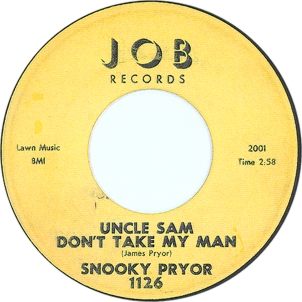
James "Snooky" Pryor (hca, voc); Sylvester Plunkett (eg except -1); J. C. Hurds (eb); Little Joe Harris (d).
Chicago, 1962 or 1963
| Stop the Train Conductor (tk. 1) | Flyright [Br] FLY 585, Flyright FLYCD 20, Paula PCD-11, Westside WESA 869 [CD] | ||
| Walking Boogie | Flyright [Br] FLY 585, Flyright FLYCD 20, Paula PCD-11, Westside WESA 869 [CD] | ||
| Stop the Train Conductor (tk. 2) | Flyright {Br] FLY 585, Westside WESA 869 [CD] | ||
| Stop the Train Conductor (tk. 3) | Flyright [Br] FLY 585, Westside WESA 869 [CD] | ||
| 2001 [undubbed] | Big Guns (Pryor) | Flyright [Br] LP 565, Westside WESA 869 [CD] | |
| 2001 | Uncle Sam Don't Take My Man (Pryor) | JOB 1126, Flyright [Br] FLY 100, Flyright [Br] FLY 565, Flyright [Br] FLYCD 20, Paula [Br] PCD-11, Westside WESA 869 [CD] | |
| 2002 | Boogie Twist (Pryor) | JOB 1126, Flyright [Br] FLY 100, Flyright [Br] FLY 565, Flyright FLYCD 20, Paula PCD-11, Westside WESD 233 [CD], Fuel 302 061 939 [CD] | |
| Can't We Get This Straight -1 | Flyright [Br] FLY 565 | ||
| I Can't Feel Good No More [alt.—My Head Is Turning Gray] | Flyright [Br] FLY 584, Flyright [Fr] FLY 585, Flyright FLYCD 20, Paula PCD-11, Westside WESA 869 [CD] | ||
| I Can't Feel Good No More | Flyright [Br] FLY 584, Flyright [Br] FLY 585, Westside WESA 869 [CD] |
We know that JOB 1126 was released in 1963. Snooky Pryor's vocals are (not very smoothly) double-tracked on "Uncle Sam." "Big Guns" is the same item without the vocal overdub. Sylvester Plunkett's guitar is also double-tracked on "Uncle Sam" (we haven't checked "Big Guns" in this regard). Several items from this session are often incorrectly dated to the middle or late 1950s.
The overall sound quality from the session is much inferior to what JOB was getting from 1951 through 1954. According to Mike Brown, Joe Brown was living at 4008 South Ellis Avenue during this period, and he set up a studio in his basement where some of the 1960s JOBs were recorded. This Snooky Pryor session is an obvious candidate. Flyright 100, Snooky Pryor, was released in 1969. Flyright FLY 565 was released in Britain in 1980 as Snooky & Moody: Real Fine Boogie. Flyright FLY 584, Baby Face Leroy & Floyd Jones, was issued in Britain in 1983, while Flyright FLY 585, Memphis Minnie & Others: World of Trouble, came out in 1982. Flyright FLYCD 20 and Paula PCD-11, Snooky Pryor, were released in 1990 and 1991. In the notes to Paula PCD-11, "Stop the Train Conductor" and "Walking Boogie" are attributed to a different session (said to be "possibly mid-1950s), but the sound is similar on these items (including the oddly recessed vocals by Pryor). Again, a second guitar line seems to have been added to these tracks through overdubs. Westside WESA 869, Snooky Pryor & Friends: Pitch a Boogie Woogie If It Takes Me All Night Long: Seminal Post-War Chicago Blues, is a British CD released in 2001. Westside WESD 233 is a compilation of 54 JOB blues tracks on 2 CDs; titled Rough Treatment: The J.O.B. Records Story, it was released in Britain in 2001. Fuel 302 061 939, The J.O.B. Records Blues Story is a 2-CD set issued in 2012.
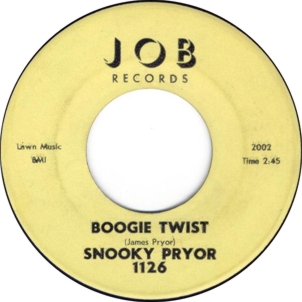
Snooky Pryor retired from music after making his last session for JOB. In 1971 Living Blues magazine lured him out of retirement, conducting the first published interview with him. He recorded an LP for Bluesway in 1973 (Do It If You Want), but did not become a hit on the blues revival circuit until a Blind Pig release in 1987 (Snooky). He continued to record into the 1990s for such labels as Antone’s and Discovery. Snooky Pryor died on October 18, 2006, in South East Missouri Hospital in Cape Girardeau. He was 85 years old.
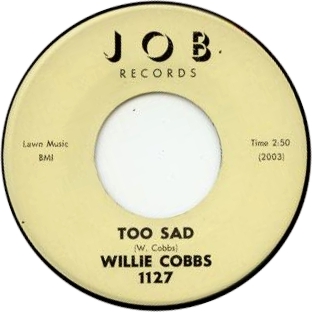
Willie Cobbs (hca, voc); Ernest Harrison (tp); Rico Collins (ts); unidentified (p); "Troy" (eg); "Buck" (b); "George Jr." (d).
Willie's brother's house, Memphis, 1963
| 2003 | Too Sad (Cobbs) | JOB 1127 | |
| 2004 | Got a Little Girl (Cobbs) | JOB 1127 |
We also know that JOB 1127 was issued in 1963. Willie Cobbs has stated that "I did another one for Joe Brown at my brother's house" (also in Brett Bonner, "Willie Cobbs: I Want to Do Some Music We Can Shake Our Ass To," Living Blues, 31(5), Sept.-Oct. 2000, p. 19). Cobbs continued to record for Ruler, using Joe Brown and Bud Brandom's publishing companies.
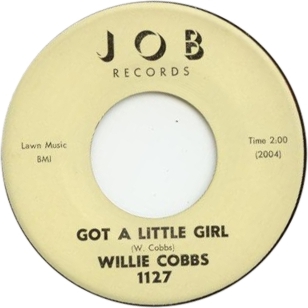
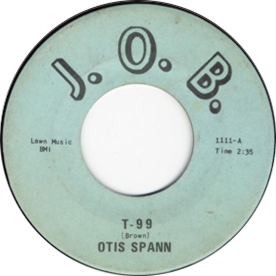
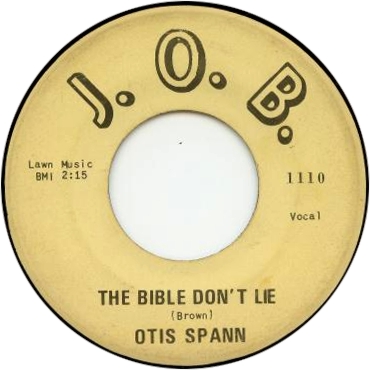
Otis Spann (upright p -3, 4, Wurlitzer ep, voc); J. T. Brown (cl -1; ts -2); unidentified (eg except -3, 4); unidentified (b); unidentified (d).
supposedly Chicago, supposedly 1964
| The Bible Don't Lie -1 (Brown) [OS voc] | JOB 1110 | ||
| Los Angeles Midnite Groove -2 (Brown) | JOB 1110 | ||
| JOB-1111-A | T-99 (Brown) [OS voc] -3 | JOB 1111 | |
| JOB-1111-B | Love (Brown) -1, 4 | JOB 1111 | I'm a Lonely Man | JOB (unissued) | Somebody Is Knocking at Your Door | — | Short Dresses -1, 3* | Flyright [Br] FLYCD 31, Paula PCD-15, P-Vine [J] PCD-24113 |
Here we're stuck with sheer A and B matrixing; can't do much with that. The crude label style was in use in 1971 (look below for JOB 009, which was recorded and released that year). Indeed, both releases look to have taken place after Otis Spann's death in 1970, as well as J. T. Brown's in 1969; would Joe Brown have been so brazen with the composer credits while Spann was still alive? Besides, we know that JOB used issue numbers 009 and 0010 in 1971.
Leadbitter, Fancourt, and Pelletier (1994) put the location as Chicago and the date as 1964. It would be interesting to know what their sources of information were. (Other sources have said 1956, but the J. T. Brown title rules that out.)
On JOB 1111, which is badly recorded, Otis Spann appears to be playing a beat-up old upright piano. "T-99" is for piano, bass, and drums only. "Love" is an instrumental for piano, bass, drums, and J. T. Brown's clarinet. A track that appeared on a 1991 miscellany—Paula PCD-15, Chicago Piano: 1951-1958 from Cobra & JOB—appears to be from the same session: badly recessed upright piano, fairly prominent string bass, vocalist (J. T. Brown in this case) up front, clarinet solo. Lyrics about a "short dress woman" suggest that miniskirts were becoming established. Which rules out any of the 1950s dates that have sometimes been attached. P-Vine PCD-24113, Chicago Blues Down-Homers, Vol. 2, appeared in Japan in 2001; its compilers prudently gave only "?" for a recording date.
The two sides of JOB 1110 are more horribly recorded; they sound as though they were made from the audience, at a concert in a medium to large hall. Each side is crudely faded up at the beginning and down at the end, as though to cut out announcements and applause. The piano on both sides is a Wurlitzer electric. How often did Otis Spann play one? At least we know that Otis was there, because he sings on "The Bible Don't Lie." Otherwise, the band includes a guitarist, a bass player (the sonics are so rough that it's hard to tell what kind of instrument, but we'll go with electric), and a drummer.
On "The Bible" there is a prominent clarinet part, courtesy of J. T. Brown. On "Midnite Groove" Brown's tenor sax solo is unmistakable. The guitarist solos on "Bible" ... but is actually more audible on "Groove."
According to Fancourt and McGrath, the session (or sessions?) included two more tracks that have yet to see issue.
Either the Spann items were not included in the sale to Jewel, or the sound quality prohibited their use. Only the side credited to J. T. Brown has been picked up by a reissue program..
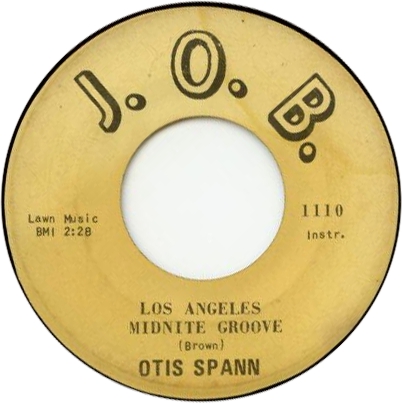
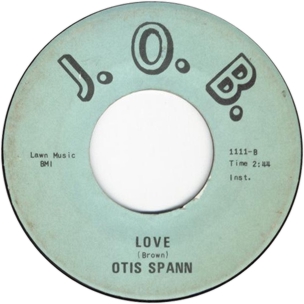
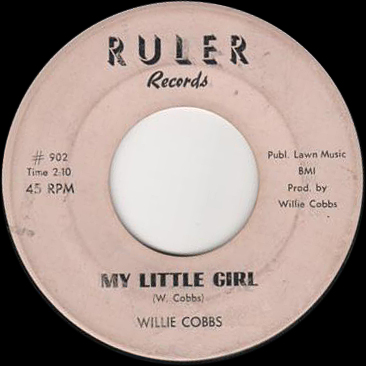
Willie Cobbs (hca, voc); Ernest Harris (tp -1); Rico Collins (ts); unidentified (org, b, d).
Chicago, 1965
| My Little Girl (Cobbs) | Ruler 902, Whirl-A-Way 1065 | ||
| Mistreated Blues (Cobbs) | Ruler 903, Whirl-A-Way 1065, Bootheel 182 |
This Ruler release (902 and 903 are the sides of one record) appears to have come out in 1965. Fancourt and McGrath supply the personnel and list Whirl-A-Way 1065 as though it was the initial release.
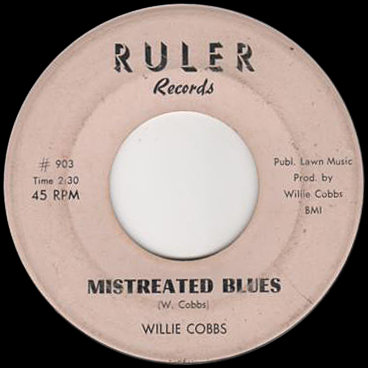
According to Mike Brown, in 1964 his father sold a 50% interest in Lawn Music to Bud Brandom. Releases from the final years of JOB sometimes credit Brandom Music or Frederick Music on the label. Both of these were Bud Brandom's operations. Bud Brandom was also involved in producing some of the sessions.
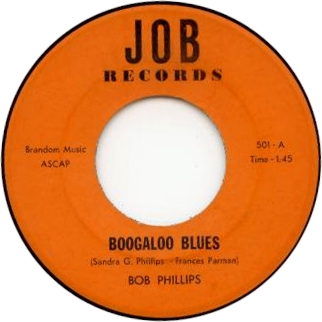
unidentified (tp; overdubbed on -1); unidentified (eg); unidentified (p -2); unidentified (eb); unidentified (d); unidentified (bells -1); unidentified (cga -1).
Chicago, 1966?
| 501-A | Boogaloo Blues (S. Phillips - F. Parman) -1 | JOB 501-A | |
| 501-B | Goodwater Workhouse Blues (S. Phillips - F. Parman) -2 | JOB 501-B |
We've been given 1966 as the approximate release date. But the prominent employment of wa-wa by the electric guitarists suggests 1966 is a little too early; the copy in Robert Campbell's collection has a written notation suggesting it was acquired in March 1971.
The composer credits, which go to Sandra Phillips and Frances Parman on both sides, suggest that Cliff Parman was involved in some capacity. Bud Brandom's music company was the publisher. Some soul-funk production went into the date; for instance, the trumpet line on "Boogaloo" is occasionally reinforced with an overdubbed second trumpet. Besides the trumpet, there is prominent lead guitar with lots of wa-wa and and a fuzz-toned electric bass solo on "Boogaloo." The piano is heard only on "Goodwater Workhouse Blues," the added percussion only on "Boogaloo."
We don't know who played what, not even Bob Phillips (who is only mentioned on one side of the record!). "Goodwater" oddly combines a trumpet lead in a mid-1920s style with a guitar lead in a late-1960s style.
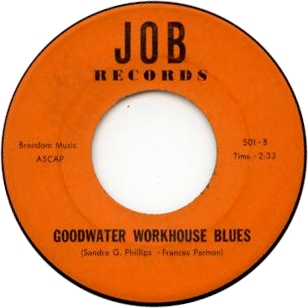
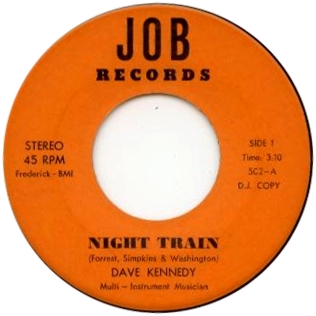
Chicago, c. 1966
Dave Kennedy (multiple instruments).
| 502-A | Night Train (Forrest-Simpkins-Washington) | JOB 502-A | |
| Dave's Blues (Kennedy) | JOB 502-B |
Steve Franz alerted us to JOB 502, a copy of which he once saw advertised in a sale catalog. We can do a little better now, after consulting a copy in Dr. Robert Stallworth's collection. Frederick Music was Bud Brandom's company.
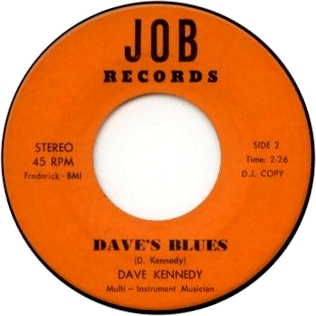
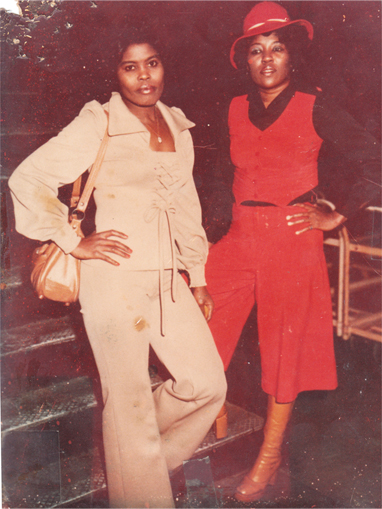
Joe Brown's last hurrah took place in 1971-1972, with a series of extremely obscure releases. He had long since slipped below the event horizon for Billboard and Cash Box. Fortunately, the rise of specialist blues magazines, such as Living Blues, meant that someone was paying attention.
details to be provided
Chicago, prob. 1971
| 2110 | I'm Looking for a Love One [sic] (J. Tannner) | JOB 601 | |
| Black Mare | Flyright [Br] FLY 585, Juke Joint LP 1501 | ||
| 2109 | The Cow (J. Tanner)^ | JOB 601 |
One of the more mysterious offerings from a label that had so many. The first two items are by Harry Brooks. The flip of JOB 601 was by The Carvels. The title and matrix on the Carvels side were revealed when a copy of the single went up for sale on ebay in May 2007. The sides were not conjoined entirely at random; both songs were composed by one J. Tanner. According to Mike Brown, the session derives from a final burst of recording activity, in 1971.
The only side from JOB's last decade ever to appear on Flyright was "Black Mare," included in Flyright [Br] FLY 585, Memphis Minnie & Others: World of Trouble, a British LP released in 1982.
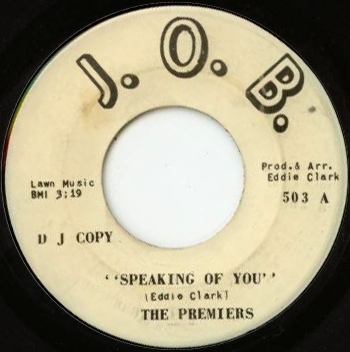
Eddie Clark (arr) with the Premiers: unidentified vocalist and instrumentalists; extra male voices overdubbed on the Odex issue
Chicago, 1970
| 503-A C/M [0026.A*] | Speaking of You (Clark) [EC voc] | JOB 503, Odex OD-133-1711A* | |
| 503-B C/M [0026-B*] | Funky-Monkey (Clark-Premiers) | JOB 503, Odex OD-133-1711A* |
On JOB 503, which appears to be the initial release, the Premiers are a band with a featured vocalist. We estimated the recording date as late 1960s, but Mike Brown says that Eddie Clark and the "Premier Corporation" copyrighted the tunes in November 1970. "Funky Monkey" is basically an instrumental. "Speaking of You" may be the same number that Eddie Clark first recorded on JOB 1117. The crude label style is known from JOB 009, 1110, and the latter-day 1111; it seems to date from 1971. Eddie Clark is listed as composer, arranger, and producer on both sides.
JOB 503 appears to be the original release of this material. On the Odex release, a male vocal trio has been overdubbed onto "Speaking of You" and three or four voices have been dubbed onto "Funky Monkey." We do not know the date of the Odex but it would seem to have come out later.
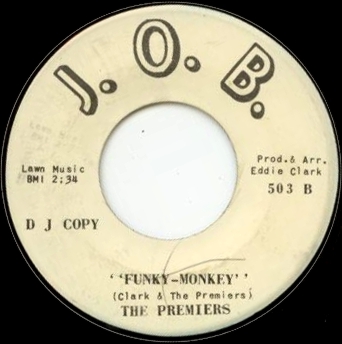
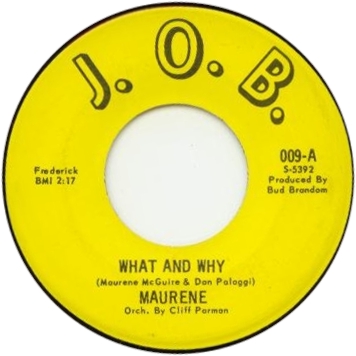
Maurene McGuire (voc); unidentifed musicians directed by Cliff Parman.
Chicago, 1971
| S-5392 | What and Why (McGuire-Paloggi) | JOB 009-A | |
| S-5393 | Did Ya Hu? (McGuire-Paloggi) | JOB 009-B |
From the matrix numbers this single appears to have been cut immediately before the Bill Wrick item on JOB 0010. Both Maurene's single and Bill Wrick's were produced by Bud Brandom, whose publishing company handled the tunes.
Maurene was known on her later recordings as Mo McGuire. Her JOB single appears to be her debut on vinyl, but she came to wider attention when she issued her first LP on the local Wooden Nickel label in 1974. Like many female soft rock singers of the era, the blond curly-headed singer employed a vocal approach with a somewhat Black inflection that worked well on soft rock, folk, and country material. Her recording career never took off, but Maurene McGuire continued as a cabaret singer for the next three decades.
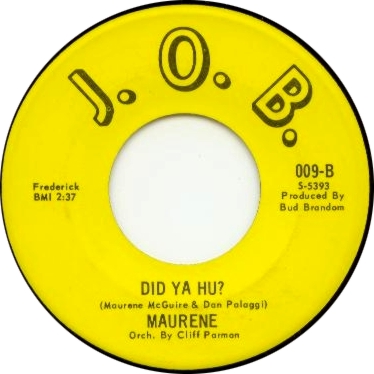
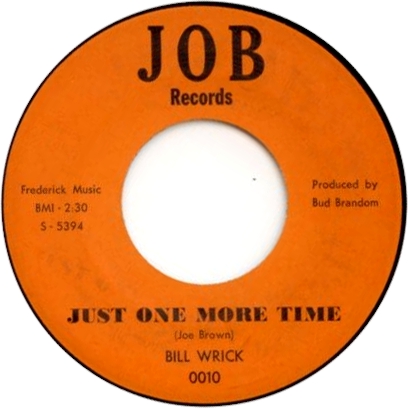
personnel unidentified
Chicago, 1971
| S-5394 | Just One More Time ("Brown") | JOB 0010 | |
| S-5395 | Adore ("Brown") | JOB 0010 |
Jim O'Neal, in the Autumn 1971 issue of Living Blues, had this to say about JOB 0010: "'Adore' features wah-wah guitar, mellow vocal, and a rather nice modern blues sound; flip is average dance number, except for the powerful guitar breaks." He remarked that this release "marked the return of Joe Brown to recording activity." Bud Brandom was the producer on this session, and the compositions were published by Frederick Music.
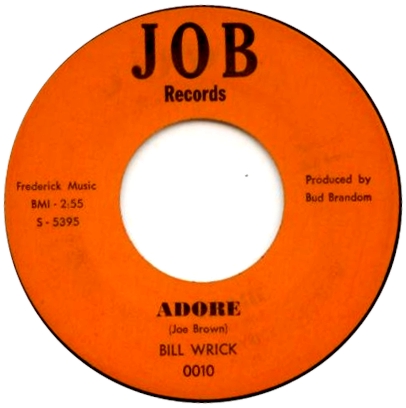
Chicago, 1972
| I'm Sorry | JOB 600 | ||
| Ain't It Funny | JOB 600 |
Again, we know virtually nothing about this release.
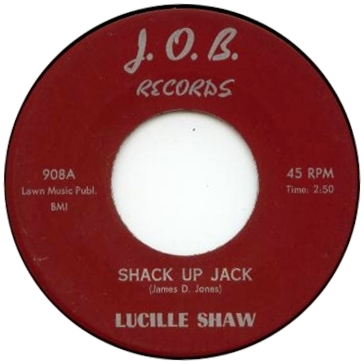
Lucille Shaw (voc); other musicians unidentified.
Chicago, early 1972
| 908A | Shack Up Jack (Jones) | JOB 908 | |
| 908B | Don't Cry (Allan-Jones) | JOB 908 |
What looks like JOB's very last recording session led to this "truly dire" record (in Bob Pruter's judgment). A milder judgment (Robert Campbell's) would be that it was a run-of-the-mill soul record that would in no way have stood out in 1972. In the Spring 1972 issue of Living Blues, Jim O'Neal said: "Lucille sings the blues in Chicago clubs sometimes, but not on this record. Only bluesy part of this soul outing is the guitar." Mike Brown recalls that Joe Brown and Bud Brandom were interested in fairly heavy studio production during this period. We don't know who James D. Jones was (he got sole composer credit on "Shack Up Jack" and joint credit on "Don't Cry"). Stella Allan, his collaborator on "Don't Cry," was Joe Brown's niece.
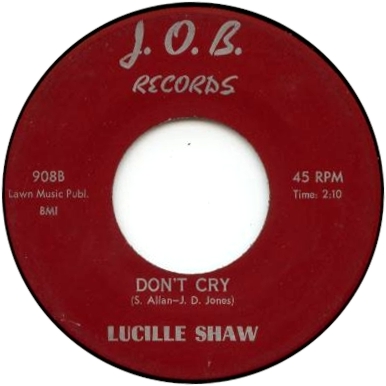
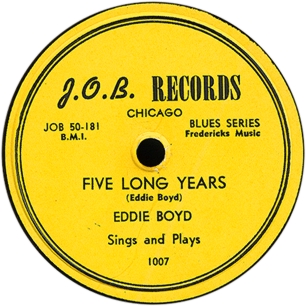
The last flurry of activity ended when Joe Brown sold many of the JOB masters still in his possession to Stan Lewis's Jewel operation in 1972 (the sale was reported in the Autumn 1972 issue of Living Blues). According to Mike Brown, the sale supposedly involved 54 masters, though this number may not include alternate takes or unreleased tracks.
The Spring 1973 Living Blues reported, however, that Joe Brown planned to release some more material, and gave the company's address as 1117 West 59th Street in Chicago. At the time, Brown owned this building as well as the adjacent properties at 1115 and 1121 West 59th; he stored records in the storefront portion of the 1117 building. JOB did not wind up entirely until 1974. In his 1973 book, Mike Rowe stated that a final release was by King Kolax (we believe Rowe was referring to JOB 7005: "Side Man" b/w "She's Funny That Way"). Joe Brown's health declined after he suffered complications following a hernia operation. He died on February 7, 1976.
Mike Rowe opined that JOB's product was "well recorded, most of the blues items among the cream of the post-war Chicago blues." To be strict, Rowe's judgment applies to the early and mid-1950s work, which was mostly cut at Modern Recording Studio or Universal Recording. Some of the post-1959 JOBs, though they might be of musical interest, were recorded in Joe Brown's basement; those that were done in regular studios typically employed heavier production than would have been the case earlier.
According to reports from Jim O'Neal and Mike Rowe, Joe Brown was not appreciated by the musicians. A sour recollection from Robert Jr. Lockwood (quoted in the notes to KC CD 03) expresses what many thought of him: "He was sure enough a no-no. He was a black man didn't have no damn money, had a jiveass label. I mean nobody never got a quarter." Granted, Lockwood recorded for Brown twice as a leader, and got just one single released, but he was expressing a widespread sentiment.
Rowe claimed, in fact, that many of the artists he recorded had to put money up front to get into the studio. O'Neal got Brown's version: "That's a lie. Nobody put up a nickel. I paid everybody that was supposed to be paid...The guys that was supposed to get paid got it, and the ones we did a deal, we did a deal." How we interpret that response depends on what "a deal" means. We know that Brown didn't mind taking the composer credits on some JOB releases (a common practice at independent labels during the period, but one that musicians for obvious reasons have never cared for).
Musicians must have been under the impression that Brown's small record operations were making him a lot of money, because he boasted to both Rowe and O'Neal that he never worked. In fact, the record company could not have been particularly lucrative after 1954, when the revenue stream from JOB decelerated to a trickle; certainly Fury and Oriole and Ruler weren't pulling the income in. Although Brown's partnership with Bud Brandom involved the Oriole label for a short while, and Brandom productions on JOB later on, its primary focus was on music publishing, where Brandom made most of his money. Mike Brown recalls that Joe Brown was a partner in two gas stations operated by his brother Lawrence, and that he owned several buildings.
When interviewed for the Spring 1973 issue of Living Blues, Joe Brown noted that "Willie Dixon said I had the most inactive label, but my label has never been on the defaulter's list. I've always been able to record." This meant that Brown always paid the musicians Union scale for their work on recording sessions, and that he avoided other scrapes with Local 208.
About his relationship with artists, he lamented, "To me records has been a hobby, but I did it mostly to help the boys. But they didn't appreciate it. I'm the most hated man in the business."
The eccentric management of the JOB label and its stops and starts as a business venture led to a gappy, idiosyncratic numbering system.
From the initial venture of summer 1949 through early 1950, we have JOB 2249 and JOB 101.
The second venture in 1950 yielded JOB 100 and 101 (second use of that number).
After that a semi-coherent 100 series lumbered on with 102, 103,110, 112, 114, 115, 116, 117 and 121. 114 ended up being reused in 1958.
In 1952, after the deal with Chess fell through, a 1000 series was launched that eventually included 1001, 1002, 1003, 1005, 1006, 1007, 1008, 1009, 1010, 1011, 1012, 1013, 1014, 1015, and 1016. From 1007 on, most of these were released while JOB was working with Chance. 1001 through 1006 were actually recorded in 1951. There was no 1004; the item we once listed under that number actually appeared on a different Chicago independent called J B. Of course 1009 was 1005 with overdubbed saxophone parts on each side.
For nearly a decade (late 1953 to 1963) the company sustained an 1100 series: 1100, 1101, 1102, 1103, 1104, 1105, 1106, 1107, 1108, 1109, 1111, 1113, 1114, 1115, 1116, 1117, 1118, 1120, 1122, 1124, 1125, 1126, and 1127. 1110 was inserted and 1111 ended up being reused in 1971.
There was a loose 3001 in 1956.
The final decade of the label turned chaotic: 009, 0010; 501, 502, 503; 600, 601; 908; and at the very end 7005.
In all there were 60 known releases on the parent JOB label. To these we can add one item on Fury (500; same record as JOB 1107), five on Ruler (5000 and 5001; however, 5001 supposedly replicated JOB 1117; 902/903, 900, and 1131), and four second-edition Orioles (1316/1317, 1318, 1319, 1320). If JOB 1118 was replicated on Oriole, that would make five.
After Stan Lewis bought them from Joe Brown, many JOB masters were reissued by Jewel subsidiary Paula in the United States and its British licensee Flyright. More recently the Paula holdings were leased to Westside/Fuel 2000, which reissued the JOB blues sides on a series of CDs in 2001. The Westside releases are now in abeyance, as the company reportedly went out of business still owing money to Stan Lewis.
Some other JOB masters (such as the Joiner's Five Trumpets session from June 1952 and the J. T. Brown session from early 1954) were dealt to Leonard Allen, almost certainly during Brown's alliance with him in 1958-1959, and ended up in the hands of Delmark when it acquired United and States. (Allen also got copies of the John Lee masters and some items from the 1951 Eddie Boyd session.)
Up to now every reissue program has emphasized the deep blues for which JOB was renowned; no interest has been shown in the jazz and R&B side of the label, such as the sessions with King Kolax or the Henry Palmer session with Mitzi Mars. Needless to say, Zona Sago's contributions to calypso as well as the Oriole subsidiary's pop ventures have also been passed up.
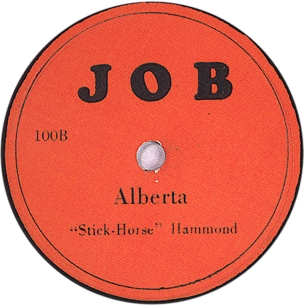
JOB may not be as attractive a name for a record company as Miracle, or Hy-Tone, or Premium, or Saturn. Still, it has been used more than once. In 1950 an outfit in Shreveport, Louisiana issued two singles by bluesman Nathaniel "Stick Horse" Hammond (a traditional artist who was born in Dallas, Texas, in 1896). There is no known connection between this short-lived enterprise and Joe Brown's company in Chicago. According to Steve Franz, the Shreveport JOB was owned by Ray Bartlett, who worked for radio station KWKH. But given the overlap in time and a common interest in blues, collectors and discographers often confuse the labels. Shreveport JOBs are very rare, and are known on 78 rpm only.
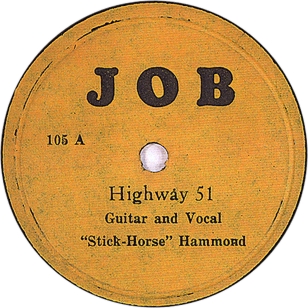
Nathaniel "Stick Horse" Hammond (eg, voc).
Shreveport, Louisiana, 1950
| 100A | Gambling Man | JOB 100 | |
| 100B | Alberta | JOB 100 | |
| 105 A | Highway 51 (Hammond) | JOB 105, Royalty RR 906-A | |
| 105 B | Too Late Baby (Hammond) | JOB 105, Royalty RR 906-B |
According to the Mohr-Flückiger-Demeusy files, the release on Royalty predated the release on JOB 105. But this is inconsistent with the location of the Louisiana JOB label—or of the session. And Helge Thygesen points out that in the wax of the Louisiana JOB 105 the matrix mumbers run JB 105A SHH/JB 105B SHH. Whereas on Royalty 906 these become JB-SHH 105A RR 906A/JB-SHH 105B RR 906B. It does not make a whole lot of sense for the Royalty to list the JOB issue number if it was released before JOB 105. "Gambling Man" and "Highway 51" have been reissued on CD on a Boulevard Vintage compilation, Down Home Blues Classics Volume 2—Texas.

Don Sneed, Jr. (voc, accordion); Don Sneed, Sr. ; Leslie Sneed; Danny Sneed .
Chicago, c. August 1956
| G9OW-7146 | Don't Make Me Go to Bed (Sneed - Maurer) | J B 1004 | |
| Too Young for Love | J B 1004 |
For many years, a JOB 1004 was listed in discographies, attributed to one Roy Sneed, with the two titles listed above. It stubbornly resisted being located. Based on the JOB 1000 release series, we inferred it had been recorded in 1951. Such a single might have been pressed in a short run, but a 1951 JOB would probably not be as scarce as, say, the 45 by the Airibians, which is why the dearth of evidence was so confounding.
We know now why we couldn't find JOB 1004—there never was one. Murray Kirch (mail communication, January 12, 2016) has shown that this was the product of misidentification: there was a single on a different Chicago label, J B. And the lead singer wasn't named Roy; he was Don Sneed, Jr., 12-year-old member of a family band.
The Sneed Family came from Spanaway, Washington, and began working in music in 1952. It was known for radio work appearances out of Chehalis, Seattle, and Olympia, as well as TV appearances in Tacoma and Spokane. It was led by Don Sneed, Sr., who played guitar, with Leslie Sneed, born in 1943, on mandolin, Don Jr., born in 1944, or on accordion, and Danny, born in 1945, on steel guitar. Don, Jr., also did some of the comedy routines. On the Sneed Family, see http://www.hillbilly-music.com/groups/story/index.php?groupid=13234.
The German Wikipedia article ( https://de.wikipedia.org/wiki/Sneed_Family) lists their later releases, all on a regional label called Cascade, from 1959 to 1962; Cascade eventually put an LP out on them. (See the commentary on a 1962 single at http://crudcrud.blogspot.com/2008/01/big-big-love.html). Don, Sr., did not perform in the 1962 edition of the group, which also included Suzie Sneed and two non-family members, Billy Goodman and Marvin Cave (http://homoerraticradioshow.blogspot.com/2012/02/sneed-family.html). Leslie, Don Jr., and Danny are still active as musicians.Dave Penny (email communication, June 7, 2006) previously identified a Country artist named Roy Sneed. He was born on August 1, 1924. Based in Knoxville, Tennessee, Roy Sneed was a country guitarist who played and recorded with The Carlisles (on Mercury). He put out a release on his own named on Valley 111 ("Turn Around Boy" b/w "I'll Be So Blue Tomorrow") in 1954, and was responsible for a couple of other singles and an LP, winding up his recording career in the 1970s.
The Valley labels show that "Turn Around Boy" was published by "Brandon" Music and composed by Douglas, Fox, and Oury. This is obviously a Brandom publication; Douglas and Fox were two of the songwriters who contributed pop material to Bud Brandom's catalog. But it doesn't indicate a JOB connection.
Penny noted as well that "Don't Make Me Go to Bed (And I'll Be Good)," composed by Hugh Cross, was a well-known country tune by 1951, having been recorded by Bill Cox in 1937, and by Roy Acuff in 1942 (and several times thereafter). However, the "Don't Make Me Go to Bed" on the J B single is a different piece, better suited (if one heeds the lyrics) to a 12-year-old boy lead. It is credited on the J B to Don Sneed, Sr., and Manley Maurer.
There was also a singer and dancer named Ray Snead, who recorded in Chicago for Mercury in May and September 1951. On the September 1951 date he cut "I'm a Good Rocking Daddy" with a strong studio ensemble that included Eddie Chamblee on tenor sax and Johnny Pate on bass; Leo Parker, who was in and out of Chicago in 1951, was the featured soloist on baritone sax. Around 1959 Snead was discovered by singer Dinah Washington and included in her tours for a time.
In compiling our JOB story we used the Joe Brown obituary written by Jim O'Neal for Living Blues 26 (March-April 1976); a profile on Joe Brown by Mike Rowe in his book Chicago Breakdown (London: Eddison Books, 1973); an obit on Joe Brown written by Mike Rowe for Blues Unlimited 119 (May-June 1976); recollections provided by Mike Brown (in conversations with Robert Campbell on March 27 and May 8, 2009); and the JOB listing compiled by Bob McGrath in The R&B Indies (West Vancouver, B.C.: Eyeball, 2000). We have also employed artist discographical information from Blues Records 1943-1970 (London: Record Information Series, 1987 and 1994), as well as information from Stak-O-Wax, Galen Gart's ARLD, Galen Gart's First Pressings volumes, the Mohr-Flückiger-Demeusy files, and the JOB gospel entries in Hayes and Laughton's Gospel Records (1943-1969). A 1950 Chicago telephone book entry for Modern Recording Studio (Edwin M. Webb, proprietor) gave us a home for the five-digit MRS matrix series; unfortunately we have not yet found a copy of the advertisement that is clean enough to display here. We are indebted to George Paulus, Big Joe Louis, and Helge Thygesen for providing us with important clues from their extensive collections of blues 78s, to Steve Franz for detailed help with the Flyright reissue series, including dubs of some out-of-print CD reissues; to Frank Scott and Stefan Wirz for additional help with Flyright and P-Vine Special reissues (see the Flyright section at http://www.wirz.de/music/american.htm) and to Dave Sax for his meticulous unraveling of the tangled Eddie Boyd discography, which paid further dividends in helping us place JOB 1006 (by Henry Palmer) in the sequence of recording sessions. Stefan Wirz's American Music site (http://www.wirz.de/music/american.htm) has been most helpful with LP reissues before Flyright and P-Vine began licensing from Stan Lewis; it also provides thorough coverage of Flyright's overall output. Murray Kirch of Second Hand Songs established that the Roy Sneed Country single was done in 1956 for J B, not in 1951 for JOB.
Click here to return to the Red Saunders Research Foundation page.
Click here to return to Robert L. Campbell's Home page.